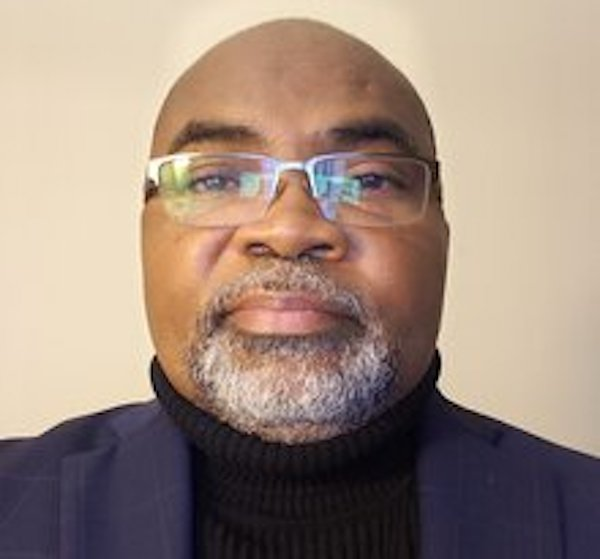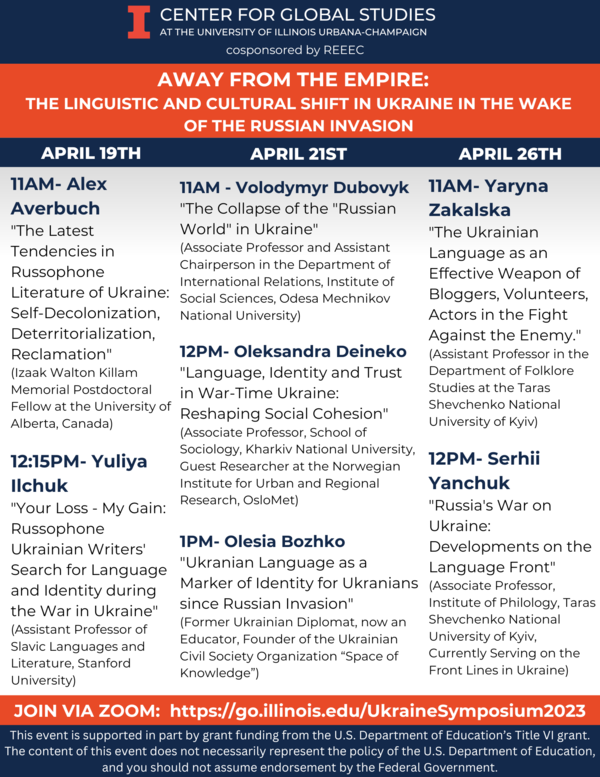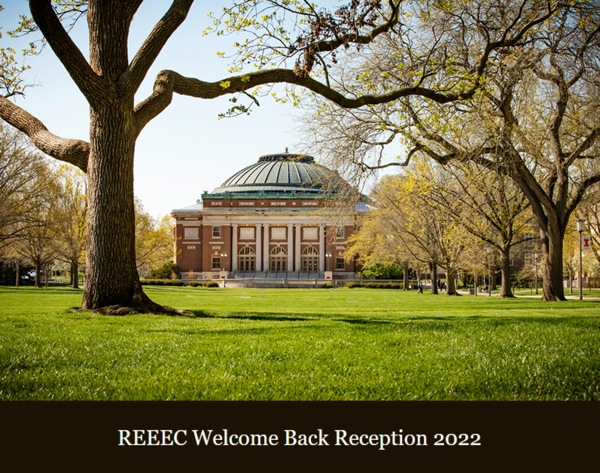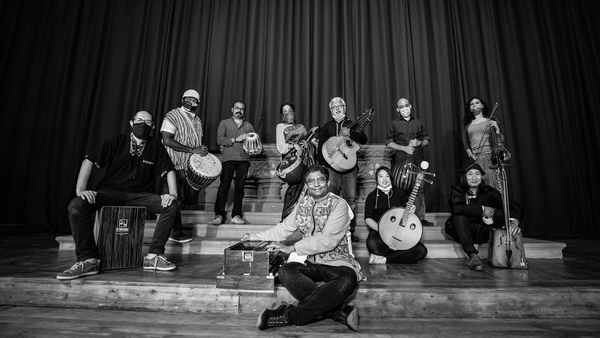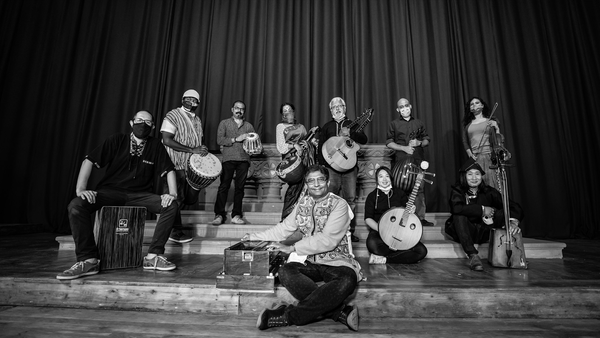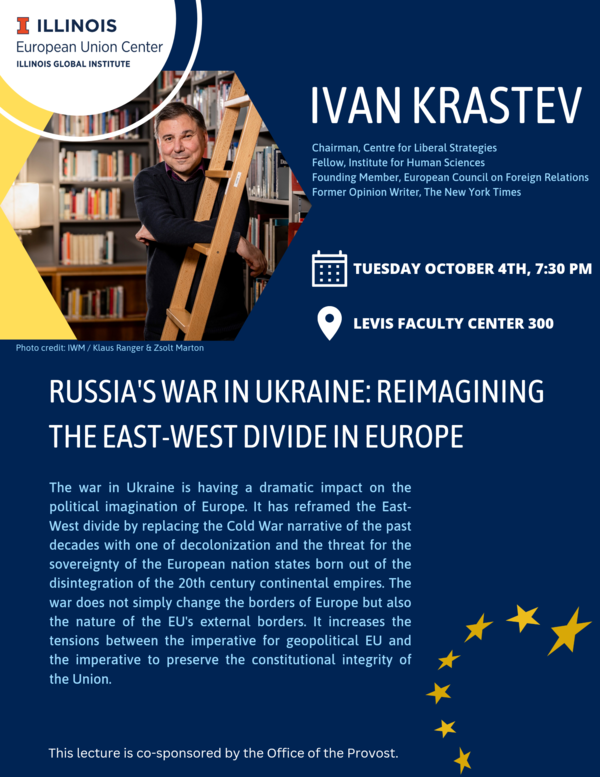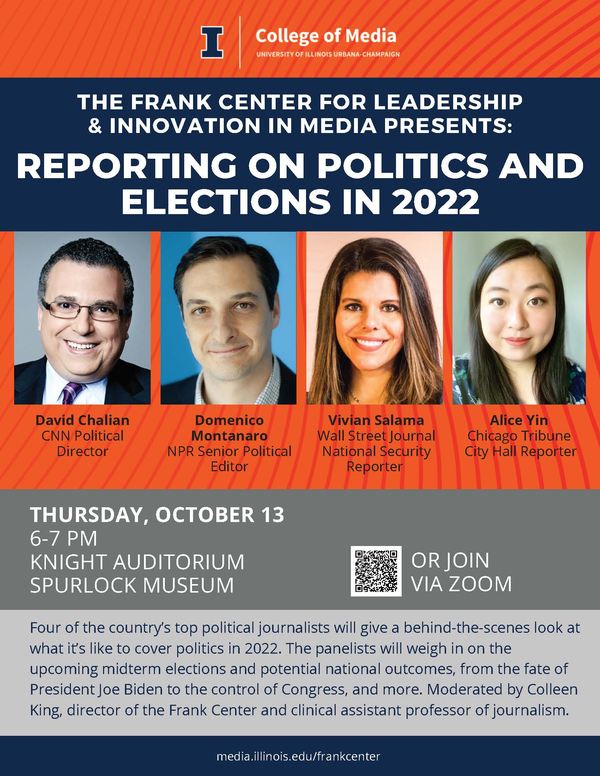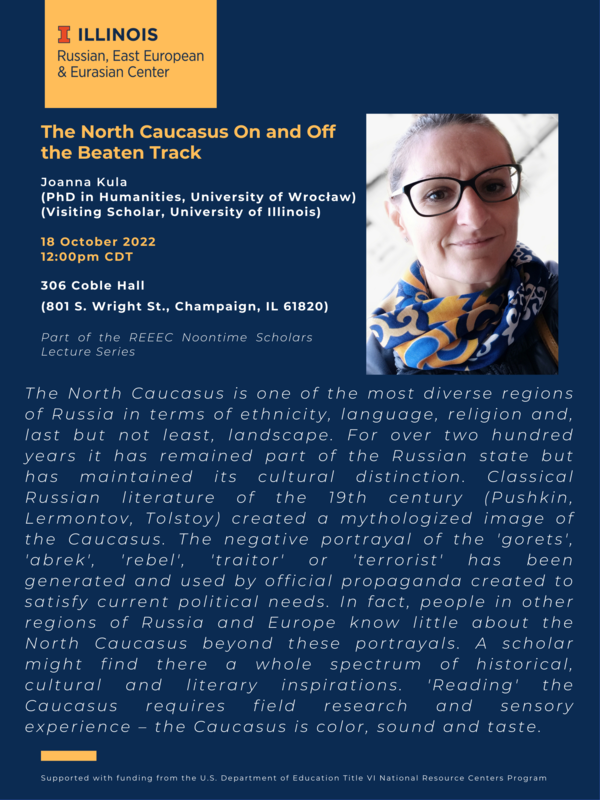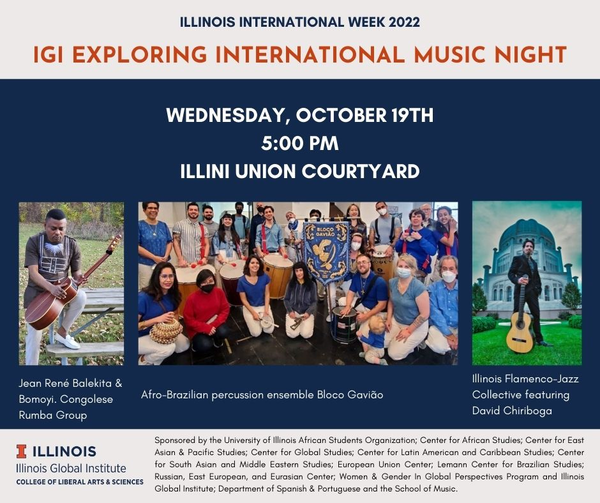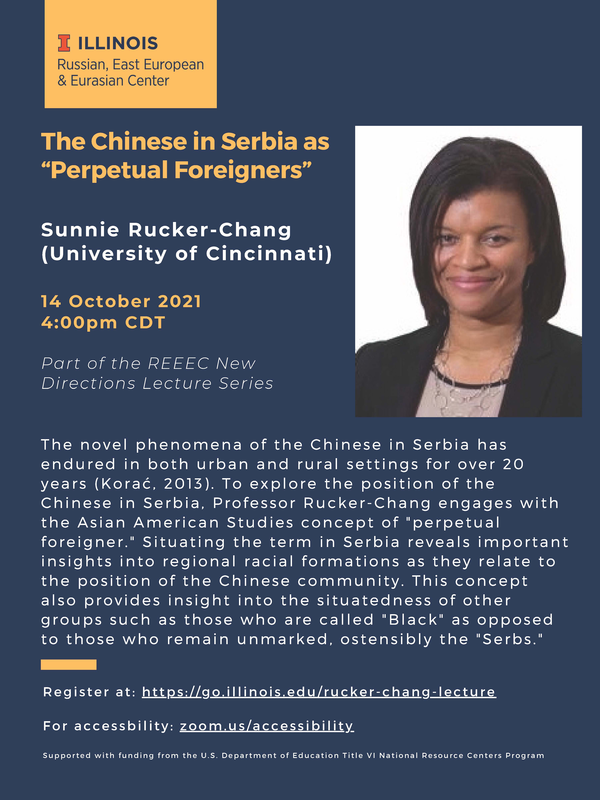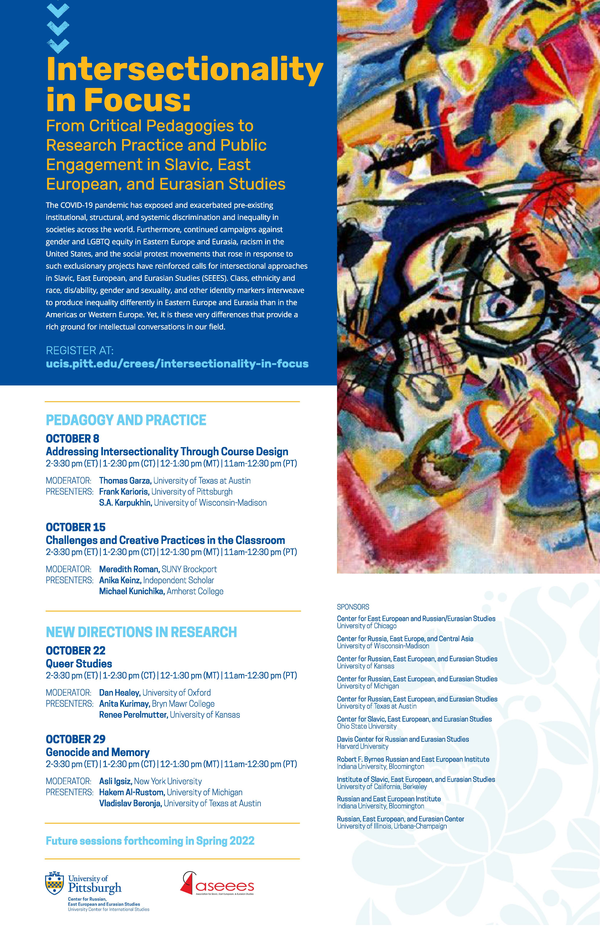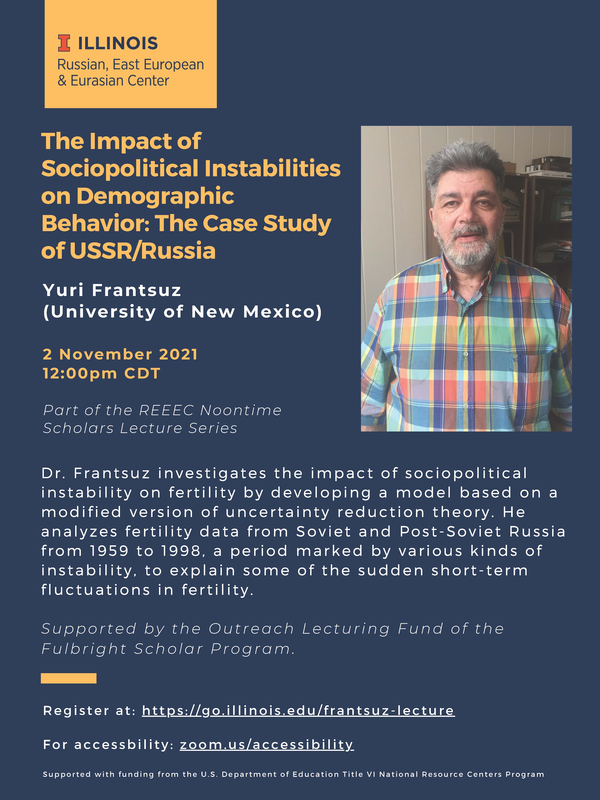Spring 2024 Events
Spring 2024 Events
Spring 2024 Events
|
Wednesday, May 1, 5:00-7:00 PM CT Please join us at 5:00pm on May 1st for the REEEC Spring Reception in Room 210 of the Levis Faculty Center. We will celebrate the end of the spring semester, connect with members of the REEEC community, and celebrate graduating students and their achievements. Refreshments will be served. All are welcome! |
|
Annual Spring Concert: "Jilted Lovers and Runaway Brides: Dancing and Romancing on the Balkan Square" |
|
Slavic Story Time at the Urbana Free Library Join us at 11am on Saturday, April 20 at The Urbana Free Library for our springtime Slavic Story Time! We will be reading the story "How the Fox and the Elk Exchanged Legs" from Folktales of the Amur: Stories from the Russian Far East, by Dmitri Nagishkin. Afterwards, we will learn about the Nanai people who originally told this story, play a game, and complete a craft related to the story! For children of all ages and their caregivers. This program is co-sponsored by REEEC and The Urbana Free Library. |
|
Wednesday, April 17 This event will be held virtually over Zoom. To register, please visit: https://go.illinois.edu/HollisNTS. Over the twentieth century, the musical genre of mugham became a central pillar of Azerbaijani cultural identity, further strengthened by Soviet cultural policy. Ethnic Armenian musicians were deeply rooted in this artistic tradition before their violent expulsion from the Azerbaijani Soviet Socialist Republic during the late 1980s. In particular, Armenians were celebrated for their instrumental virtuosity. Combining firsthand oral histories from these musicians with personal study of mugham, this research highlights their contributions and life experiences. By exploring and documenting this musical community, this research stands as a counter-narrative to the (ongoing) erasure of Armenian cultural heritage in Azerbaijan. Jonathan Hollis is a doctoral candidate in ethnomusicology at Illinois. His research focuses on Armenian musicians who were expelled from Azerbaijan due to ethnic violence, and the politicization of the musical genre of mugham, a genre with deep historical and spiritual importance in the region. In particular, he writes on the history of music-making in Baku's Armenian community, as well as how attitudes toward mugham music have been affected by past (and very recent) wars. His work combines oral history interviews, archival research, and applied instruction on playing mugham on the duduk, the most important and emotionally powerful Armenian instrument. His research has been supported by the American Research Institute in the South Caucasus, the National Association for Armenian Studies Research, and American Councils for International Education. He also thanks UIUC REEEC for their support of his Russian and Armenian language study through the Title VI FLAS program. |
|
Thursday, April 11, 4:00PM This presentation will be focused on the correspondence between one of the most active members of Russia's Socialist-Revolutionary Party, journalist and politician Vladimir Zenzinov (1880-1953), and his beloved Amalia Fondaminskaya (1882-1935). Amalia was the wife of another prominent figure of the same party, Ilya Fondaminsky (1880-1942). This correspondence spanned several decades. These letters, preserved in the archive of the Amherst Center for Russian Culture, have never been the subject of scholarly investigation. The love affair between Amalia and Zenzinov began in the early 1900s. Due to Zenzinov's frequent arrests and exiles and Amalia's emigration in 1907, they could meet quite rarely. Thus, their letters can be viewed and analyzed from several angles: as a form of communication based on building and maintaining close emotionally charged relationships and as an attempt to conduct a specific cultural and psychological experiment. While the studies of the era of Russian modernism have so far focused on radical transgressive sexual practices invented and developed by writers and artists, much less is known about the emotional and literary patterns that became vital sources for the revolutionary circles. My research aims to fill this gap. Maria Mayofis is a literary scholar and cultural historian, currently working as a research fellow at the Center for Russian Culture at Amherst College. She received her Ph.D. in literature from the Russian State University for the Humanities in 2002. From 2000-2010, she was an editor of the "history" rubric of the New Literary Observer (NLO) journal in Moscow, Russian Federation. From 2011-2022, she taught in several Russian higher education institutions, including the Higher School of Economics, Moscow. She left Russia in early March 2022. Her first monograph was devoted to the literary communities of the early 19th century. Her second research field is the cultural life of the Late Stalinist and the Thaw period. There is one specific research perspective common to her 19th and 20th-century studies: how established emotional patterns and narrative forms contribute to the creation of new micro-social ties, such as love, friendship, and professional collaboration. |
|
April 2,4,6 Idea by Igor Konyukhov Nathan Gunn, director Black Square is a new comic opera, written by the team of Russian and Ukrainian artists living in U.S. and France: Ilya Demutsky, Olga Maslova and Igor Konyukhov. The events of the opera follow a motley crew of characters who suddenly find themselves in the midst of serious societal cataclysms that overhaul the entire structure of beliefs and values overnight. Oscillating between low-brow street humor and high pathos, between mundane picks into kitchens and bedrooms and deafening hum of gigantic congregations, traveling through times and ideologies, Black Square weaves a shimmering web of a hypnotic melodies, written by Ilya Demutsky, absurdist poetry by Aleksei Kruchenykh and Velimir Khlebnikov, pop culture references laced with ancient motifs, and offers a philosophical probing into the contingency of public will. Inspired by the 1913 futuristic hooligan daring act known as the “opera” Victory over the Sun, Black Square is a contemporary retelling of the eternal story of the relationship between authenticity and conformity. It mixes the tradition of opera buffa, driven by the comic characters, and opera seria, which focuses only on serious subjects in mythical settings, resulting in a completely original, unique in its style production, still daring 100 years later. |
|
Film Screening: 20 Days in Mariupol Monday, April 1, 5:30-7:30 “20 Days in Mariupol is a brutal, necessary, heart-pounding reminder of why the siege shocked the world, and what remains at stake whether you’re staying apprised or not. Acrid and harrowing, it’ll slap you awake.” – Los Angeles Times Join us for a free screening of Mstyslav Chernov's award-winning documentary 20 DAYS IN MARIUPOL on Monday, April 1, 5:30pm at the Knight Auditorium, Spurlock Museum of World Cultures (600 S. Gregory St., Urbana, IL). This event is free and open to the public. 20 DAYS IN MARIUPOL tells the story of an AP team of Ukrainian journalists trapped in the besieged city of Mariupol as they struggle to continue their work documenting the atrocities of the Russian invasion. As the only international reporters who remain in the city, they capture what later become defining images of the war: dying children, mass graves, the bombing of a maternity hospital, and more. After nearly a decade covering international conflicts, including the Russia-Ukraine war, for The Associated Press, 20 DAYS IN MARIUPOL is Mstyslav Chernov's first feature film. The film draws on Chernov's daily news dispatches and personal footage of his own country at war. It offers a vivid, harrowing account of civilians caught in the siege, as well as a window into what it's like to report from a conflict zone, and the impact of such journalism around the globe. Co-sponsored by the Spurlock Museum of World Cultures, the European Union Center, and the Department of Slavic Languages & Literatures. |
|
Tuesday, March 26, 12:00 PM The political successions in the Soviet Union and China after Stalin and Mao, respectively, are often explained as triumphs of inner‑party democracy, leading to a victory of “reformers” over “conservatives” or “radicals.” In traditional thinking, Leninist institutions provide competitors a mechanism for debating policy and making promises, stipulate rules for leadership selection, and prevent the military and secret police from playing a coercive role. In this book talk, Joseph Torigian argues that the post-cult of personality power struggles in history’s two greatest Leninist regimes were instead shaped by the politics of personal prestige, historical antagonisms, backhanded political maneuvering, and violence. Mining newly discovered material from Russia and China, he challenges the established historiography and suggests a new way of thinking about the nature of power in authoritarian regimes. This event will be held virtually over Zoom. To register, please visit https://go.illinois.edu/Torigian. Joseph Torigian is a Research Fellow at Stanford's Hoover History Lab and an Assistant Professor at American University's School of International Service. This book talk is part of the Illinois Global Institute's Series on Global Responsibilities: China and the World. |
|
Friday, March 22, 12:00 PM Ukraine is the largest country in Europe and its economy, bearing heavy burden of a Soviet-type economic planning, has managed to undergo fundamental economic transformations as well as integrate democratic values and principles into its social and economic development. However, the full-scale war of Russia against Ukraine essentially stalled its economic growth, caused enormous infrastructural destructions, disrupted previously existing supply chains on international markets to which Ukraine had been exporting. These and related issues challenging not only in terms of Ukraine’s economic development but also overall regional and global economic security including the prospects of post-war rebuilding will be discussed. Pavlo Dziuba is a Visiting Professor in the Department of Economics at the University of Illinois Urbana-Champaign in the framework of the Scholars at Risk program. He holds a Ph.D. in economics (2006) and Doctoral Degree in Economics (2018) from Taras Shevchenko National University of Kyiv (Ukraine), where he has been working for more than 20 years. He has also been teaching remotely as a Visiting Professor at Hong Kong Chu Hai College since 2020. He has authored and co-authored nine textbook chapters and three textbooks for students, along with numerous articles. HIs teaching experience includes macroeconomics, international economics and international finance, risk management, international investment management and portfolio investing, financial management and financial markets, corporate social responsibility. Dziuba's research focuses on the impact of international diversification on investment portfolios, particularly on issues of how and why portfolio efficiency is increased as a result of diversifying internationally. |
|
Human Rights and Dissent in Putin's Russia: A Roundtable Discussion Thursday, March 21, 3:30-5:00PM On March 15-17, Russia held a presidential election, which Vladimir Putin will use to ratify his hold on power. No anti-war candidates have been allowed to run against him. The elections come on the heels of the death, in prison, of Alexei Navalny, a leading opposition leader and anti-corruption activist. They also occur a little over two years since Russia's full-scale invasion of Ukraine. On Thursday, March 21, from 3:30-5:00 p.m. the Russian, East European, and Eurasian Center will convene a roundtable discussion on the state of politics and dissent today in Russia. What scope exists for meaningful dissent and the defense of basic human rights in Russia today? What, in turn, can the larger world hope—and expect—from Russia in the future? The roundtable will begin with short presentations from a number of disciplinary perspectives, from faculty with long experience studying the REEES region. It then will move on to general conversation, with the hope of creating a broad, many sided discussion of human rights and dissent in Russia today. |
|
Friday, March 8, 12:00 PM Women’s Dance Traditions of Uzbekistan: Legacy of the Silk Road examines the three major regional styles of Uzbek women's dance – Ferghana, Khiva and Bukhara/Samarkand – and their broader Silk Road cultural connections, from folklore roots to contemporary stage dance. This presentation focuses on the remarkable courage and creativity of women who shaped stage dance in Uzbekistan during the early years of the USSR, boldly challenging societal gender roles to perform in public. An examination of women’s regional traditions challenges assertions that these pioneers had “no dance culture,” basing their choreography on Russian ballet, while in actuality they drew from Central Asian folk dances, customs, gestures, and aesthetics. An award-winning choreographer, costume designer, scholar, and performer, Laurel Victoria Gray combines her degrees in history with decades of field research and performance experience. She studied history at Occidental College (B.A.), the University of Waterloo (M.A), and the University of Washington (Doctoral Candidate) and was awarded an honorary doctorate in 2009 from the Uzbekistan State Institute of Art and Culture. She has traveled to Uzbekistan 14 times, including 2 years at the invitation of Uzbekistan's State Academic Bolshoi Theater. In 1995, she founded the Silk Road Dance Company which performed at the first White House Nowruz celebration as well as in Uzbekistan, Qatar, Singapore, London, and Toronto. She was awarded the 2003 Kennedy Center Local Dance Commissioning Project Award and, in 2009, delivered the Fulbright Association’s Selma Jeanne Cohen International Dance Scholar Lecture Gray’s new book, Women’s Dances of Uzbekistan: Legacy of the Silk Road, will be released by Bloomsbury Academic Press on April 18, 2024. She also contributed a chapter on Silk Road dance forms to Milestones in Dance History (2022). Her articles have appeared in the Oxford University Press International Encyclopedia of Dance, the Encyclopedia of Modern Asia, the Encyclopedia of Contemporary Theater: Asia, and the Encyclopedia of Women in Islamic Culture. Gray is the 2021 recipient of Uzbekistan’s Xalqlar Do’stligi (Friendship of the Peoples) medal for her work in promulgating Uzbek culture. |
|
Thursday, March 7, 4:00 PM What would you do to heal yourself? Would you take a new medicine from a far-away place, listen to a doctor’s advice that contradicted your own beliefs, or rely on your own judgement and your local resources? This talk will show how the early modern Russian elite balanced their access to global markets with local understandings of the Russian Orthodox Christian body to form a kind of medical practice that drew on foreign practices without being determined by them. Clare Griffin is a graduate of University College London and Assistant Professor of Russian History at Indiana University Bloomington. Her first book, Mixing Medicines: The Global Drug Trade and Early Modern Russia, appeared in 2022 with McGill-Queens University Press. She is now working on her next project which is about disability in early modern Russia, with a particular focus on wounded soldiers. |
|
REEEC 'Crafternoon': Martenitsa Friday, March 1, 3:00-5:00 PM Please join us on Friday, March 1 for a REEEC Crafternoon event! We will enjoy festive snacks as we celebrate Baba Marta and make our own martenitsi. On March 1 all across the Balkans, people celebrate the martenitsa/martisor/martinka, the known symbol of spring. Participants exchange small red and white adornments that symbolize health, prosperity, and the triumph of life over a cold and dark winter. These tokens are worn as bracelets, pins, or charms until the first signs of spring emerge, whereupon they are tied to blossoming trees. Stop by Coble Hall between 3 and 5pm to make your own! Честита Баба Марта! |
|
Friday, March 1, 12:00 PM This presentation will focus on the aesthetic-political paradigm of the Russian-avant-garde, with an emphasis on the ideas of Vladimir Tatlin (1885-1953), one of the founders of Russian constructivism. It introduces a new interpretative framework for Vladimir Tatlin’s art with the goal of expanding the debate around Russian-avant-garde aesthetics, contributing to building a comprehensive historical basis for the analysis of the political impulse of the Russian avant-garde and its importance today. The lecture is structured around the question: How do contemporary artists and researchers see Tatlin’s artistic potential in the field of ideas? It views Tatlin’s legacy in three contexts: Tatlin as a symbol of a new world of Soviet Russia, Tatlin in a contemporary aesthetic perspective, and Tatlin in the mirror of post-avant-garde reception. Ksenia Golovko is a scholar specializing in contemporary aesthetics and the history of avant-garde art in Russia and the Soviet Union. She is currently a Fulbright visiting researcher at the University of Illinois Urbana-Champaign in the Art History program at the School of Art and Design. She is developing an anthology that will collect materials related to the legacy of one of the key figures of avant-garde art - Vladimir Tatlin (1885-1953). The anthology project arises from Ksenia’s PhD thesis, “Revolution, New life, Utopia: Vladimir Tatlin’s Art in Jacques Rancière’s Theoretical Perspective”, which she defended at St. Gallen University, Switzerland in 2018. The dissertation brings together the aesthetic-political paradigms of Tatlin and the contemporary philosopher Ranciere, showing their common concerns with equality, collectivity, and art as an intervention in the distribution of the sensible. Ksenia is a multidisciplinary researcher. She is the author of several articles on 20th-century culture and aesthetics. She founded the research platform Media Center At the University of St. Petersburg, which hosted seminars on issues in contemporary cultural production, and developed research curricula as a fellow at the CEU in Budapest. |
|
Tuesday, February 6, 3:00 PM Literary translator Angela Rodel will explore the unorthodox approaches to history and the challenges such framing of the past creates for the translator in her two recent works: Georgi Gospodinov’s 2023 Booker International prize-winning novel Time Shelter and Vera Mutachieva’s 1968 historical novel The Case of Cem. While Gospodinov takes an absurdist approach to the “discreet monsters” hiding within a sanitized collective past, Mutafchieva structures her book as a “court of history,” placing the reader in the role of judge and using a period neglected in Bulgarian historiography to subtly critique the Cold War era she was living and working in. These reframings and subversions of national historical narratives pose both linguistic and contextual challenges to the translator bringing these works to non-Bulgarian audiences. **Copies of both Time Shelter and The Case of Cem are available for special order through The Literary in downtown Champaign. In order to have copies in advance of the talk, we recommend you submit any orders by January 30. Angela Rodel is a literary translator who holds degrees from Yale and UCLA. Nine Bulgarian novels in her translation have been published in the US and UK, and shorter works have appeared in McSweeney’s, Two Lines, Ploughshares, Words Without Borders, and elsewhere. She has received NEA and PEN translation grants. Her translation of Georgi Gospodinov’s Physics of Sorrow won the 2016 AATSEEL Prize for Literary Translation, while her translation of his novel Time Shelter was featured on The New Yorker’s list of Best Books of 2022 and won the 2023 International Booker Prize. Since 2015 she has served as executive director of the Bulgarian-American Fulbright Commission. |
|
Tuesday, February 6, 12:00 PM Curious about Fulbright? Join Fulbright Bulgarian Executive Director Angela Rodel on February 6 at 12:00 PM CST in 108 Coble Hall (801 S. Wright St.) for a discussion of opportunities for Fulbright Study Research and English Teaching Assistantship in the Central and Southeastern European region. Undergraduate and graduate students are welcome and encouraged to bring their questions about how to find the best-fit Fulbright program for their academic interests. David Schug, Director of the National and International Scholarships (NIS) Program at U of I, will also speak about the resources provided by NIS to undergraduate and graduate students on campus. There will be ample time for student questions and discussion. Registration is required (https://go.illinois.edu/FulbrightLunch) and lunch will be provided. Registration will close on Tuesday, January 30. If you have any questions, please email REEEC Outreach and Programming Coordinator, Danielle Sekel, at dsekel2@illinois.edu. Angela Rodel is a literary translator who holds degrees from Yale and UCLA. Nine Bulgarian novels in her translation have been published in the US and UK, and shorter works have appeared in McSweeney’s, Two Lines, Ploughshares, Words Without Borders, and elsewhere. She has received NEA and PEN translation grants. Her translation of Georgi Gospodinov’s Physics of Sorrow won the 2016 AATSEEL Prize for Literary Translation, while her translation of his novel Time Shelter was featured on The New Yorker’s list of Best Books of 2022 and won the 2023 International Booker Prize. Since 2015 she has served as executive director of the Bulgarian-American Fulbright Commission. David Schug, Director of the National and International Scholarships Program, has been working with top-notch Illinois students and alumni in preparing and applying for nationally competitive awards since 2002. He greatly enjoys meeting students from all backgrounds and disciplines and encouraging them to reach for their academic and personal goals. In the mornings, you may find him running on area trails, and in the evenings, he is likely hanging out with his family, serving at a church event, playing double bass with a community orchestra, or gardening. |
Fall 2023 Events
Fall 2023 Events
|
Spring 2023
Spring 2023 Events
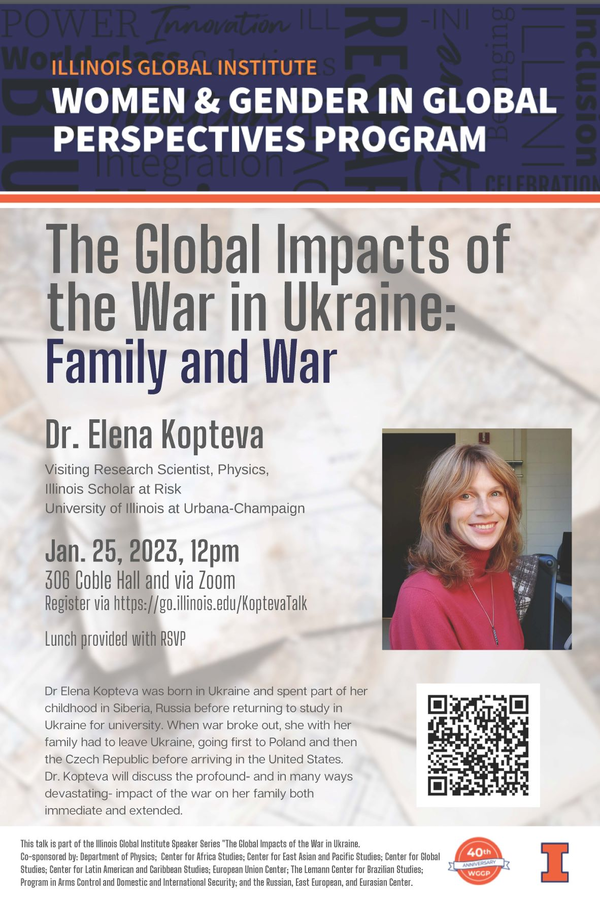 |
The Global Impacts of the War in Ukraine: Family and War
Dr Elena Kopteva was born in Ukraine and spent part of her childhood in Siberia, Russia before returning to study in Ukraine for university. When war broke out, she with her family had to leave Ukraine, going first to Poland and then the Czech Republic before arriving in the United States. |
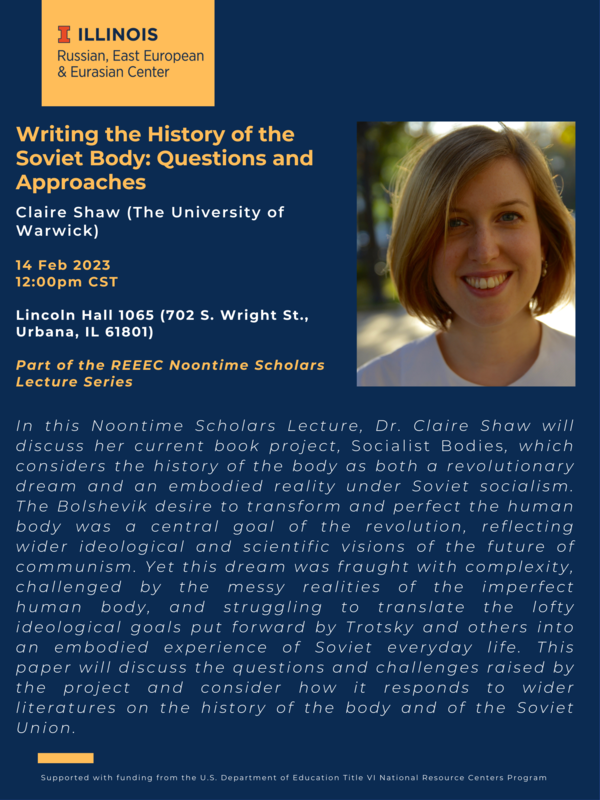 |
REEEC Noontime Scholars Lecture: Claire Shaw, "Writing the History of the Soviet Body: Questions and Approaches"
In this Noontime Scholars Lecture, Dr. Claire Shaw will discuss her current book project, Socialist Bodies, which considers the history of the body as both a revolutionary dream and an embodied reality under Soviet socialism. The Bolshevik desire to transform and perfect the human body was a central goal of the revolution, reflecting wider ideological and scientific visions of the future of communism. Yet this dream was fraught with complexity, challenged by the messy realities of the imperfect human body, and struggling to translate the lofty ideological goals put forward by Trotsky and others into an embodied experience of Soviet everyday life. This paper will discuss the questions and challenges raised by the project and consider how it responds to wider literatures on the history of the body and of the Soviet Union. Claire Shaw is Associate Professor in the History of Modern Russia at the University of Warwick. Her research focuses on the history of disability, the senses and the body under Soviet socialism. She is the author of the prize-winning monograph Deaf in the USSR: Marginality, Community, and Soviet Identity, 1917-1991 (Cornell University Press, 2017). |
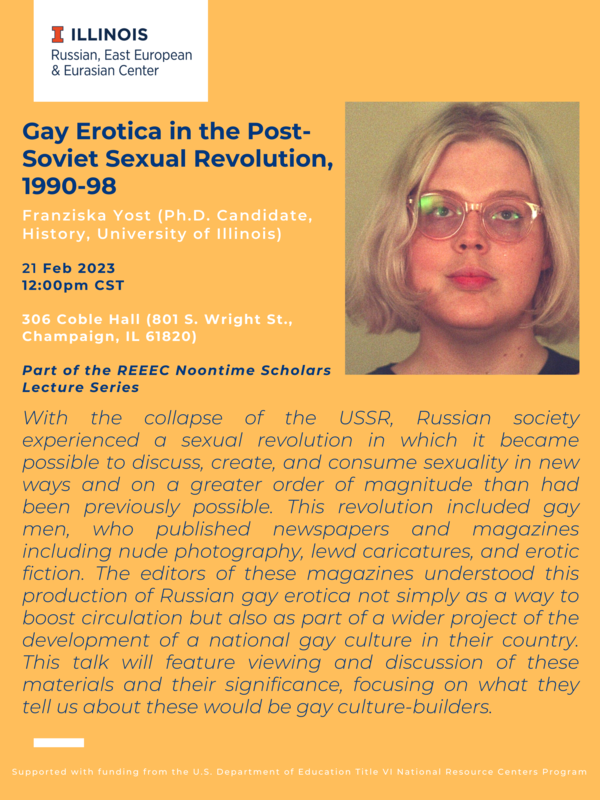 |
REEEC Noontime Scholars Lecture: Franziska Yost, "Gay Erotica in the Post-Soviet Sexual Revolution, 1990-98"
With the collapse of the USSR, Russian society experienced a sexual revolution in which it became possible to discuss, create, and consume sexuality in new ways and on a greater order of magnitude than had been previously possible. This revolution included gay men, who published newspapers and magazines including nude photography, lewd caricatures, and erotic fiction. The editors of these magazines understood this production of Russian gay erotica not simply as a way to boost circulation but also as part of a wider project of the development of a national gay culture in their country. This talk will feature viewing and discussion of these materials and their significance, focusing on what they tell us about these would be gay culture-builders. Franziska Yost is a doctoral candidate in the Department of History at the University of Illinois at Urbana-Champaign. She is currently finishing her dissertation explicating the production of LGBTQ identity in Russia during the 1990s. |
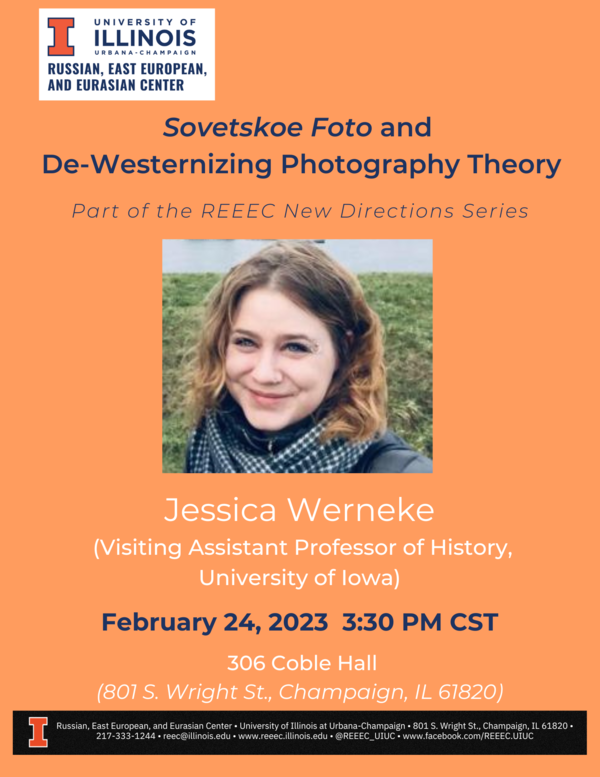 |
REEEC New Directions Lecture: Jessica Werneke, "Sovetskoe Foto and De-Westernizing Photography Theory"
The history of photography and photography theory in the nineteenth and twentieth centuries is often preoccupied with “Western” criticism and arguments about the photograph as art, document or technology. Yet, this criticism has ignored the development of photographic theory in the Soviet Union in the 1950s and 1960s, where prominent Russian theorists used the journal Sovetskoe foto (The Soviet Photo) as a platform to devise their own interpretations of the social purpose of photography in the USSR. These elucidations were based on a number of factors that were Soviet specific: the legacy of Stalinism, photographers’ lack of access to prestigious artistic circles, and explaining photography within the context of Socialist Realism, the officially mandated artistic style of the Soviet Union. An investigation of how these theoreticians conceived of photography within the ideological and aesthetic boundaries set by cultural authorities and photographers themselves is warranted, not least because it addressed theoretical problems that were absent from and irrelevant to discourses about photography in the Capitalist West. Nevertheless, there are several similarities, particularly when it came to discussions of documentary photography as art. In the 1950s and 1960s, rather than questioning the documentary authenticity of photographs, critics publishing in Sovetskoe foto tended to rely on the camera’s perceived inability to lie, despite evidence of photographic manipulation in previous decades. The resulting stylistic and analytic discussions about photography led to the development of Socialist Realist photography, or “artistic photojournalism,” the theoretical scope of which has been largely ignored by Western scholars. Jessica Werneke is a Visiting Assistant Professor of History at the University of Iowa and former Assistant Professor of Comparative Humanities at Habib University in Karachi, Pakistan. She received her BA in History from the University of Iowa (2007) and Ph.D. in Modern European History with a concentration in Russian and Soviet visual culture from the University of Texas at Austin (2015). Afterwards, she held postdoctoral research fellowships at the International Centre for the History of World War II and its Consequences at the Higher School of Economics in Moscow Russia and was a British Academy Newton International Fellow at Loughborough University in the UK. Dr. Werneke has taught broadly in history, but primarily her courses focus on modern Russian cultural history, Europe after World War II, as well as historiography and historical methods. |
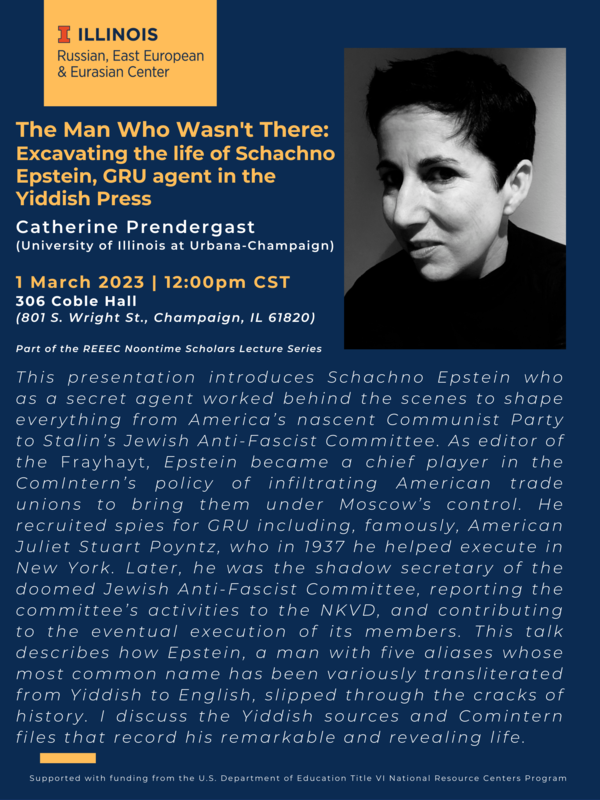 |
REEEC Noontime Scholars Lecture: Catherine Prendergast, "The Man Who Wasn’t There: Excavating the life of Schachno Epstein, GRU agent in the Yiddish Press"
This presentation introduces Schachno Epstein who as a secret agent worked behind the scenes to shape everything from America’s nascent Communist Party to Stalin’s Jewish Anti-Fascist Committee. As editor of the Frayhayt, Epstein became a chief player in the ComIntern’s policy of infiltrating American trade unions to bring them under Moscow’s control. He recruited spies for GRU including, famously, American Juliet Stuart Poyntz, who in 1937 he helped execute in New York. Later, he was the shadow secretary of the doomed Jewish Anti-Fascist Committee, reporting the committee’s activities to the NKVD, and contributing to the eventual execution of its members. This talk describes how Epstein, a man with five aliases whose most common name has been variously transliterated from Yiddish to English, slipped through the cracks of history. I discuss the Yiddish sources and Comintern files that record his remarkable and revealing life. Catherine Prendergast is a Professor of English at the University of Illinois at Urbana-Champaign, a Guggenheim Fellow, and a Fulbright Scholar. Interviewed by NPR and New York Magazine, she has written on battles over school desegregation, anxieties over the global spread of English, and recognition of disability rights. Originally from New Jersey, she can now be found amidst the cornfields of the Midwest with her husband and son. |
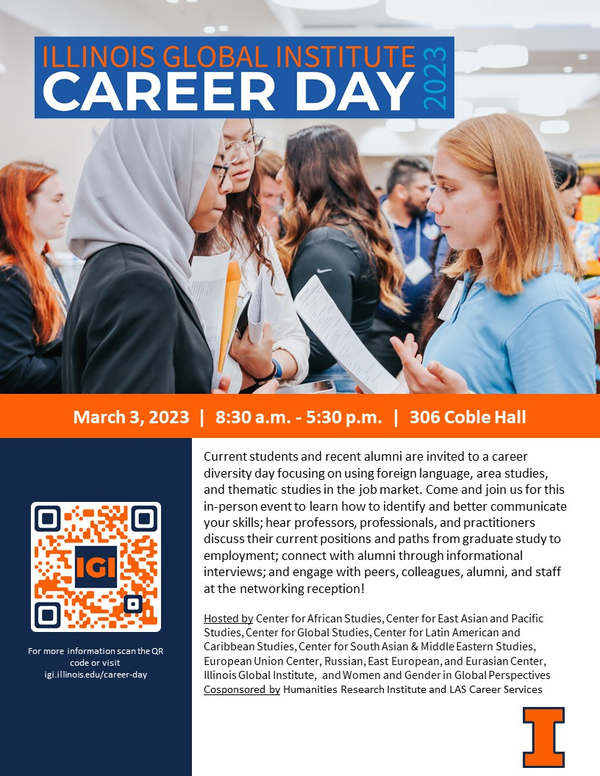 |
Illinois Global Institute 2023 Career Day
Current and recent University of Illinois graduate and undergraduate students are invited to attend the Illinois Global Institute Career Day. Please join us on Friday, March 3, 2023 for a day focusing on using foreign language, area studies, and thematic studies in careers in government, business, university, non-profit organizations, and more. Come learn how to identify and better communicate your skills, hear professionals discuss their current positions and paths from graduation to employment, connect with alumni through informational interviews, and engage with peers, colleagues, alumni, and staff at the networking reception! |
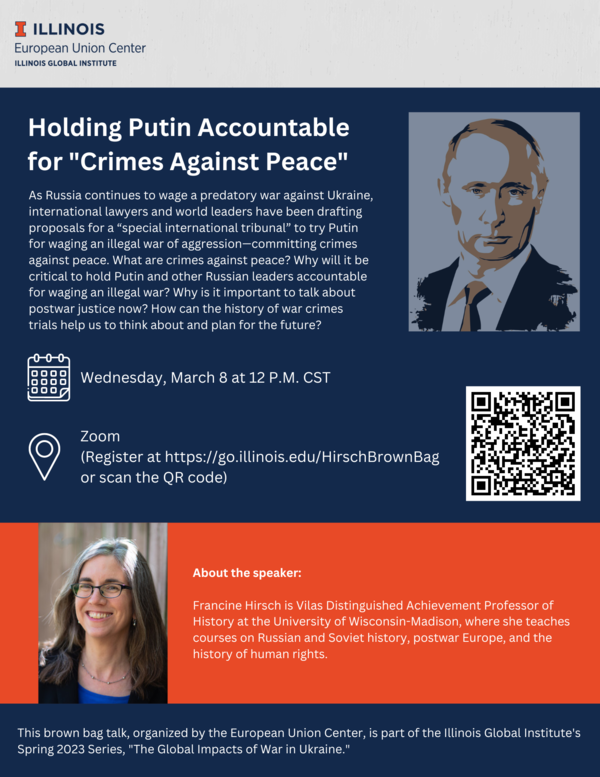 |
Holding Putin Accountable for "Crimes Against Peace" (EUC Spring 2023 Brown Bag)
As Russia continues to wage a predatory war against Ukraine, international lawyers and world leaders have been drafting proposals for a “special international tribunal” to try Putin for waging an illegal war of aggression—committing crimes against peace. What are crimes against peace? Why will it be critical to hold Putin and other Russian leaders accountable for waging an illegal war? Why is it important to talk about postwar justice now? How can the history of war crimes trials help us to think about and plan for the future? This brown bag talk, organized by the European Union Center, is part of the Illinois Global Institute's Spring 2023 Series, "The Global Impacts of War in Ukraine." Register here. About the speaker: Francine Hirsch is Vilas Distinguished Achievement Professor of History at the University of Wisconsin-Madison, where she teaches courses on Russian and Soviet history, postwar Europe, and the history of human rights. Her first book, Empire of Nations: Ethnographic Knowledge and the Making of the Soviet Union (Cornell, 2005), received several awards, including the Wayne S. Vucinich Prize of the Association for Slavic, East European, and Eurasian Studies. Her second book, Soviet Judgment at Nuremberg: A New History of the International Military Tribunal after World War Two (Oxford, 2020), won four book prizes including the George Louis Beer Prize of the American Historical Association. Hirsch has published in a number of venues including the New Republic, Time, the LA Times, and the Washington Post. Hirsch has launched a new book project on the long history of Russian-American entanglement, tentatively titled "Enemies, A Love Story." |
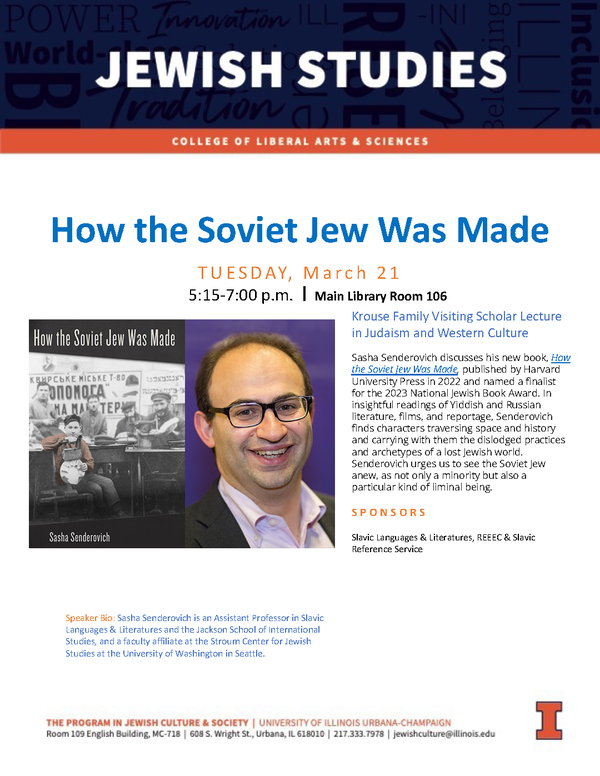 |
Jewish Studies Lecture, Sasha Senderovich: "How the Soviet Jew Was Made"
Sasha Senderovich discusses his new book, How the Soviet Jew Was Made, published by Harvard University Press in 2022 and named a finalist for the 2023 National Jewish Book Award. In insightful readings of Yiddish and Russian literature, films, and reportage, Senderovich finds characters traversing space and history and carrying with them the dislodged practices and archetypes of a lost Jewish world. Senderovich urges us to see the Soviet Jew anew, as not only a minority but also a particular kind of liminal being. Sasha Senderovich is an Assistant Professor in Slavic Languages & Literatures and the Jackson School of International Studies, and a faculty affiliate at the Stroum Center for Jewish Studies at the University of Washington in Seattle |
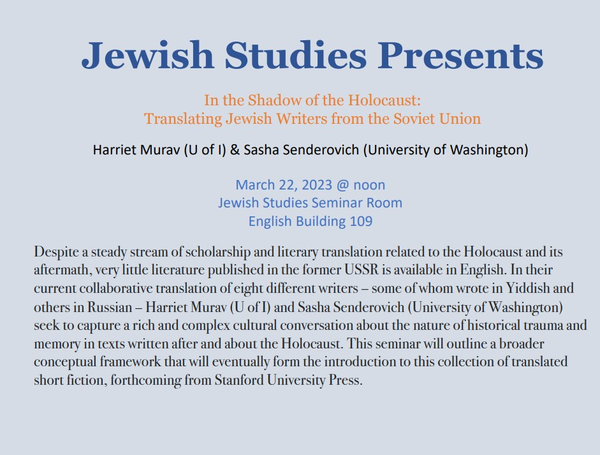 |
Jewish Studies Seminar: "In the Shadow of the Holocaust: Translating Jewish Writers from the Soviet Union"
Despite a steady stream of scholarship and literary translation related to the Holocaust and its aftermath, very little literature published in the former USSR is available in English. In their current collaborative translation of eight different writers – some of whom wrote in Yiddish and others in Russian – Harriet Murav (U of I) and Sasha Senderovich (University of Washington) seek to capture a rich and complex cultural conversation about the nature of historical trauma and memory in texts written after and about the Holocaust. This seminar will outline a broader conceptual framework that will eventually form the introduction to this collection of translated short fiction, forthcoming from Stanford University Press. |
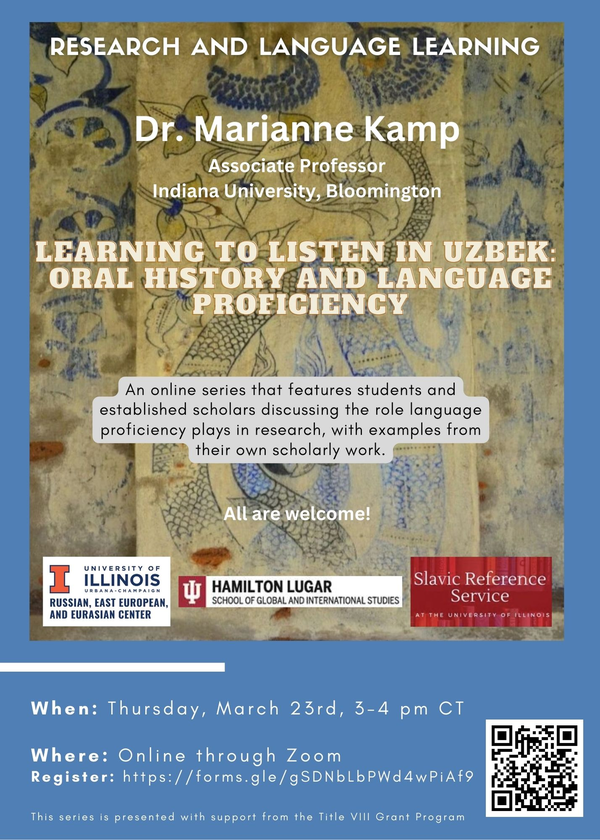 |
Research and Language Learning Discussion Series: Marianne Kamp, "Learning to Listen in Uzbek: Oral History and Language Proficiency"
The Language Workshop at Indiana University, the Slavic Reference Service, and the Russian, East European, and Eurasian Center at the University of Illinois (Urbana-Champaign) are hosting an online discussion series - Research and Language Learning. We are inviting established scholars and students to discuss the role language proficiency plays in conducting research, using examples of published scholarly works or ongoing research projects. The initiative will be launched with the Turkic languages of Kazakh, Kyrgyz, Turkish, Uyghur, and Uzbek. We welcome language learners of all academic backgrounds to participate in these discussions. The next installment features Dr. Marianne Kamp. Join us on March 23 at 3pm CT for the talk entitled "Learning to Listen in Uzbek: Oral History and Language Proficiency." For more information and to register, please visit: https://forms.gle/Lz15p4ua3efrfrebA. |
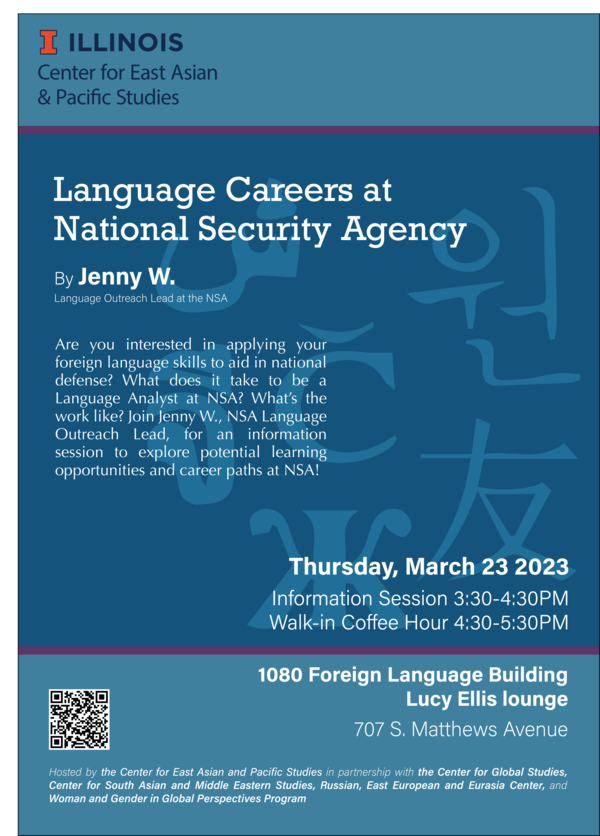 |
Information Session - Language Careers at the National Security Agency (NSA)
Are you interested in applying your foreign language skills to aid in national defense? What does it take to be a Language Analyst at NSA? What’s the work like? Join Jenny W., NSA Language Outreach Lead, for an information session to explore potential learning opportunities and career paths at NSA! Hosted by the Center for East Asian and Pacific Studies in partnership with the Center for Global Studies, Center for South Asian and Middle Eastern Studies, Russian, East European and Eurasia Center, and Woman and Gender in Global Perspectives Program |
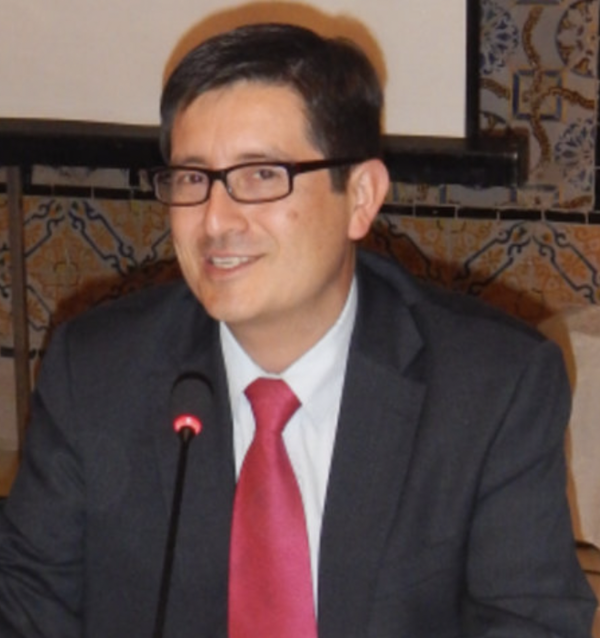 |
IGI Series on Global Responsibilities: Jose Duran, "Lights and Shadows of War in the Ukraine: Economic and Social Effects on Latin America and the Caribbean"José E. Durán Lima is currently an Economic Affairs Officer and a Chief of International trade and Regional Integration Unit at the Division of International Trade and Integration of the United Nations Economic Commission for Latin America and the Caribbean (ECLAC). He holds a Ph.D. in Economics from the University of Barcelona. He has more than 25 years’ experience as a researcher and consultant and has a particular interest in areas of research such as Regional Integration, Vertical Specialization, Export Promotions, International Trade, Asia Pacific, and General Equilibrium Models. He has several published papers and has contributed several chapters of several ECLAC flagship publications: Foreign Investment in Latin American and the Caribbean and International Trade Outlook for Latin America and the Caribbean, among others. He is also a co-editor of several reference documents relating to trade policies in Latin America and the Caribbean including South American IO Matrix: main assumptions and methodology; The Pacific Alliance and its Economic Impact on Regional Trade and Investment: Evaluation and Perspectives and Latin America in global value chains.
|
 |
Creative Clippings: Polish Paper Cuts
This free family event is a celebration of wycinanki, the Polish folk art of paper cutting. Activities will be available for family members age five and above and include coloring pages and cutting sheets of designs ranging from simple to intricate. Polish folk music will provide a lively background for the fun. Polish papercuts come in two distinct formats, each based in a different region of the country. Those from Kurpie are cut from a single piece of paper, folded once, which results in a symmetrical design. Those from Lowicz start with a design base that is then covered in multiple layers of colored paper. Plants and animals serve as common design motifs, with roosters and multilayered flowers as traditional favorites. This event is a collaboration of the Spurlock Museum and the UIUC Russian, East European, and Eurasian Center. Contact Kim Sanford (Spurlock, ksheahan@illinois.edu) or Danielle Sekel (REEEC, dsekel2@illinois.edu) for further information. |
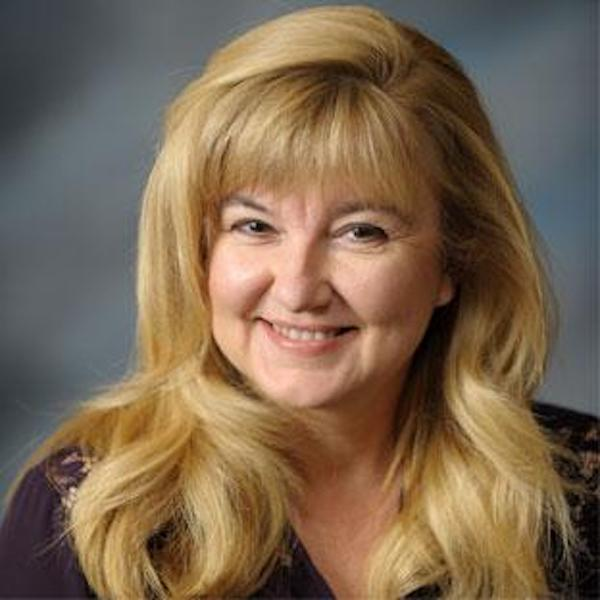 |
IGI Series on Global Responsibilities: Monika Stodolska, "Ukrainian Refugees in Poland and the Response of the Polish and Ukrainian Immigrant Population to the Refugee Crisis"The Russian invasion of Ukraine gave rise to a refugee crisis that is unprecedented in history. The scale and the speed of the migration made it one of the largest migration crises currently unfolding in the world and was declared a Level 3 (the highest) emergency by the UN Refugee Agency (UNHCR). The great majority of Ukrainian refugees (over 9,25 million as of 1/18/23) who crossed the Ukrainian border settled in Poland. Almost all of them were women and children. The talk will explore the findings of a study on the experiences of post-February 24th, 2022, Ukrainian refugees in Poland and the Polish and Ukrainian immigrant populations’ response to the refugee crisis. In particular, the talk will examine how the Ukrainian refugees adapt to life in Poland and how they cope with the trauma of war and resettlement. It will also investigate how the local volunteer networks were established in Poland and how they evolved in the days, weeks, and months following the beginning of the refugee crisis. Dr. Monika Stodolska is a Brightbill/Sapora Professor in the Department of Recreation, Sport and Tourism, University of Illinois. She received her Ph.D. in 1999 from the Department of Earth and Atmospheric Sciences, University of Alberta, Canada. Her research focuses on the roles of leisure, recreation, and sport in improving health and well-being among ethnic and racial groups and immigrants. Her studies explored the development of ethnic identities as well as cultural change and adaptation among immigrants. Dr. Stodolska’s research has been funded by the USDA Forest Service, Robert Wood Johnson Foundation, The National Research Foundation of Korea, and The National Recreation and Park Association. She has co-edited books on Race, Ethnicity and Leisure and two editions of Leisure Matters: The State and Future of Leisure Studies. Among other outlets, her research has also been published in Annals of Behavioral Medicine, Preventive Medicine, Social Science Quarterly, Journal of Immigrant and Refugee Studies, Journal of Leisure Research, and Leisure Sciences.
|
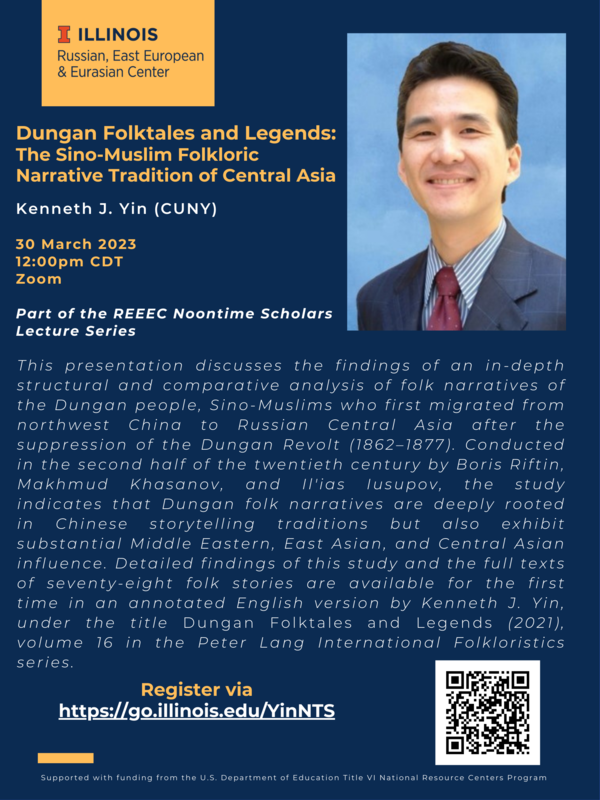 |
REEEC Noontime Scholars Lecture: Kenneth J. Yin, "Dungan Folktales and Legends: The Sino-Muslim Folkloric Narrative Tradition of Central Asia"
This presentation discusses the findings of an in-depth structural and comparative analysis of folk narratives of the Dungan people, Sino-Muslims who first migrated from northwest China to Russian Central Asia after the suppression of the Dungan Revolt (1862–1877). Conducted in the second half of the twentieth century by Boris Riftin, Makhmud Khasanov, and Il′ias Iusupov, the study indicates that Dungan folk narratives are deeply rooted in Chinese storytelling traditions but also exhibit substantial Middle Eastern, East Asian, and Central Asian influence. Detailed findings of this study and the full texts of seventy-eight folk stories are available for the first time in an annotated English version by Kenneth J. Yin, under the title Dungan Folktales and Legends (2021), volume 16 in the Peter Lang International Folkloristics series. Kenneth J. Yin teaches modern languages, literatures, and linguistics at the City University of New York. His scholarly work centers on the Dungan literature and culture of Central Asia, as well as the Tungus literatures and cultures of North Asia—namely Siberia and the Russian Far East—with a focus on Udege, Nanai, and Evenk. A graduate of Cornell University and Georgetown University, he has received fellowships and awards from the American Council of Learned Societies, the Andrew W. Mellon Foundation, the National Endowment for the Humanities, the Davis Center for Russian and Eurasian Studies at Harvard University, the University of Illinois at Urbana-Champaign, and the City University of New York. He is the author of Dungan Folktales and Legends (Peter Lang, 2021) [https://doi.org/10.3726/b18299] and Mystical Forest: Collected Poems and Short Stories of Dungan Ethnographer Ali Dzhon (Peter Lang, 2023) [https://doi.org/10.3726/b18961]. |
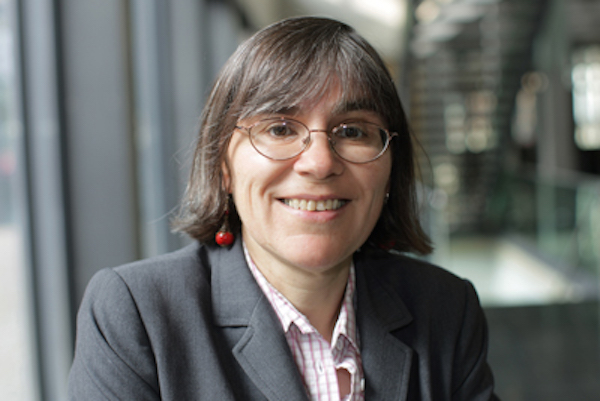 |
IGI Series on Global Responsibilities: Margarita Balmaceda, "Russia's War on Ukraine: Impacts on the Global South"In the aftermath of Russia’s all-out invasion of Ukraine in February of 2022, the United States, Canada, and the European Union states showed unusual unity in identifying Russia as an aggressor and taking swift measures both to move away from energy dependency on Russia and to institute sanctions to limit Russia's ability to finance this war. In the Global South, however, the range of responses has been wider, with much more of a sympathetic ear to Russia’s position. This webinar will focus on some of the geopolitical and geo-economic impacts of the war on Global South states including the Middle East and North Africa states, as well as on the less obvious but crucial energy links connecting Russia with these countries. Currently, Dr. Balmaceda is an Associate of the Davis Center for Russian and Eurasian Studies and of the Ukrainian Research Institute at Harvard University. A specialist on the comparative energy politics of the post-Soviet states, since 2000 she has been “following the pipeline” – i.e. following the complex web of interconnections that accompany the energy relationship between Russian oil and gas producers, post-Soviet transit states, and European consumers.
|
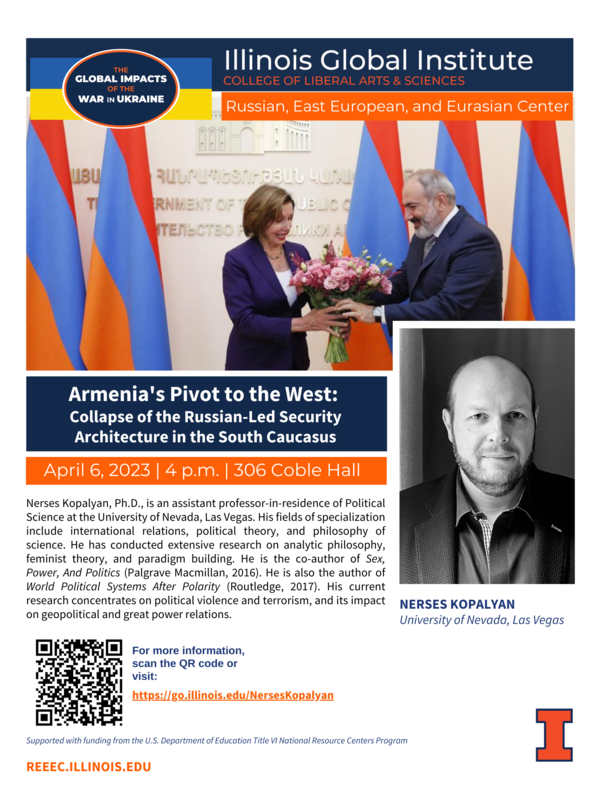 |
Nerses Kopalyan: "Armenia's Pivot to the West: Collapse of the Russian-Led Security Architecture in the South Caucasus"
Russia's power and influence in the South Caucasus has exponentially diminished due to its invasion of Ukraine and the subsequent failures of securing a swift outcome. As the entirety of the resources of the Russian state is being allocated to the Ukrainian front, the peripheries of the post-Soviet Space, traditionally placed within Russia's sphere of influence, are dealing with the consequences of Russia's decline. In the South Caucasus, the Russian-led security architecture collapsed after the 2020 Nagorno-Karabakh War, as Azerbaijan initiated hostilities against Armenia. Russia's failure to meet its obligations as the security guarantor of Armenia, and Russia's subsequent alliance with Azerbaijan prior to its invasion of Ukraine, has altered the reconfigurations in the region. Armenia, having democratized after the 2018 Velvet Revolution, has sought a pivot to the West, while a new Russo-Azerbaijani axis has formed to both curtail Armenia's pivot as well as keep the West out of the South Caucasus. With the regional hegemon in decline, and the West's attempt to fill this power vacuum, what are the trajectories of instability, democratization, and potential developments for the region? Nerses Kopalyan, Ph.D., is an assistant professor-in-residence of Political Science at the University of Nevada, Las Vegas. His fields of specialization include international relations, political theory, and philosophy of science. He has conducted extensive research on analytic philosophy, feminist theory, and paradigm building. He is the co-author of Sex, Power, And Politics (Palgrave Macmillan, 2016). He is also the author of World Political Systems After Polarity (Routledge, 2017). His current research concentrates on political violence and terrorism, and its impact on geopolitical and great power relations. |
|
|
IGI Series on Global Responsibilities: John Ulimwengu, "The impact of Russia-Ukraine Conflict on Food and Nutrition Security in Africa: A Call for a More Resilient African Food System"In February 2022, war erupted between Russia and Ukraine.These two countries account for about 12 percent of the total calories traded in the world, raising serious concerns about the implications for global food security. Although it is too early to draw a conclusion on the capacity of the world to absorb these stressors and rebound, past trends, early macroeconomic impacts, and policy responses can provide a glimpse of possible impacts. As pointed out by Mme Sacko (the African Union Commissioner for Rural Economy and Agriculture) and Mr. Mayaki (the former CEO of AUDA-NEPAD), while Africa is still recovering from the socioeconomic repercussions of the COVID-19 pandemic, the Russia-Ukraine conflict poses another major threat to the global economy, with many African countries being directly affected. Wheat consumption in Africa is projected to reach 76.5 million tons by 2025, of which 48.3 million tons or 63.4 percent, is projected to be imported outside the Continent. Russia and Ukraine are major players in the export of wheat and sunflower to Africa. Thirty-two percent of total African wheat imports come from Russia and 12 percent from Ukraine. The presentation will present early impacts of the Russia-Ukraine conflict on food and nutrition security in Africa as well as a review of policy responses. Dr. John Ulimwengu is a senior research fellow at the International Food Policy Research Institute (https://www.ifpri.org/profile/john-ulimwengu). He holds a Ph.D. in Agricultural Economics from Ohio State University (USA), and Master in Development Economics from Williams College (USA). His research interests include resilience, food systems, poverty dynamics, and network analysis. Since 2007, Dr. Ulimwengu has been involved in strategic research on the transformation of agricultural sector in Africa under the Comprehensive Africa Agriculture Development Program (CAADP) agenda. In 2017-2021, he was the Africa-wide coordinator of the Regional Strategic Analysis and Knowledge Support System (ReSAKSS, www.resakss.org). |
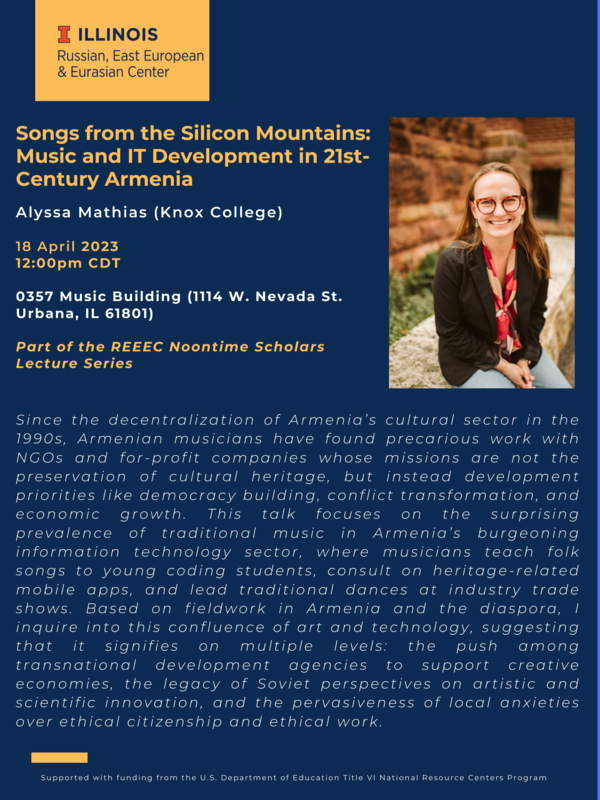 |
REEEC Noontime Scholars Lecture: Alyssa Mathias, "Songs from the Silicon Mountains: Music and IT Development in 21st-Century Armenia"
Since the decentralization of Armenia’s cultural sector in the 1990s, Armenian musicians have found precarious work with NGOs and for-profit companies whose missions are not the preservation of cultural heritage, but instead development priorities like democracy building, conflict transformation, and economic growth. This talk focuses on the surprising prevalence of traditional music in Armenia’s burgeoning information technology sector, where musicians teach folk songs to young coding students, consult on heritage-related mobile apps, and lead traditional dances at industry trade shows. Based on fieldwork in Armenia and the diaspora, I inquire into this confluence of art and technology, suggesting that it signifies on multiple levels: the push among transnational development agencies to support creative economies, the legacy of Soviet perspectives on artistic and scientific innovation, and the pervasiveness of local anxieties over ethical citizenship and ethical work. Alyssa Mathias is a Visiting Assistant Professor of Music at Knox College. Having conducted ethnographic research with musicians in Armenia, Georgia, Turkey, Russia, and the United States, her work focuses on the possibilities and challenges of arts-based development in the South Caucasus, with case studies in conflict transformation, information technology, and sustainability. She is also working on a multigenerational study of silence in the US Armenian diaspora. A violinist and singer, Mathias earned her PhD in Ethnomusicology from UCLA and was a Postdoctoral Scholar at the UCLA Promise Armenian Institute during the 2021-2022 academic year. |
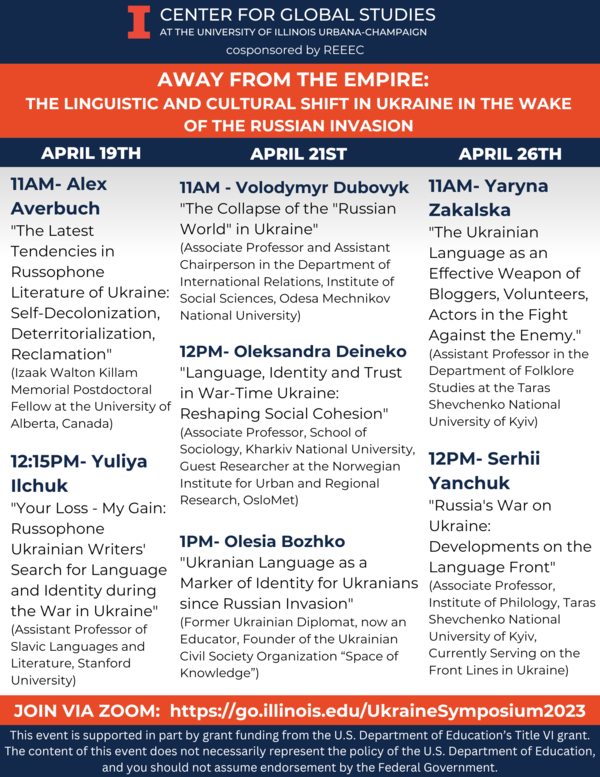 |
Away from the Empire: The Linguistic and Cultural Shift in Ukraine in the Wake of the Russian Invasion: Alex Averbuch and Yuliya Ilchuk
The Russian-Ukrainian war of the 21st century aimed not only to physically destroy Ukraine but also to expand the linguistic borders of the “Russian world,” denationalize Ukraine, and reestablish the cultural dominance of Russia over the Ukrainian people. The war that began in 2014 and intensified in the last year's invasion has led to a cultural and linguistic shift from Russian to Ukrainian among much of the Ukrainian population. On April 19, 21, and 26, 2023, the University of Illinois at Urbana-Champaign will host a virtual symposium titled "Away from the Empire: The Linguistic and Cultural Shift in Ukraine in the Wake of the Russian Invasion" that will explore this topic. The symposium will feature seven Ukrainian scholars (linguists, sociologists, literary scholars, ethnologists, and political scientists) and practitioners (front-line interpreters embedded with the Ukrainian Armed Forces). We kindly invite you to this exciting event. The symposium is supported by the Center for Global Studies and the Russian, East European, and Eurasian Center at the University of Illinois. For a full lineup of the symposium, please see the attached flyer. |
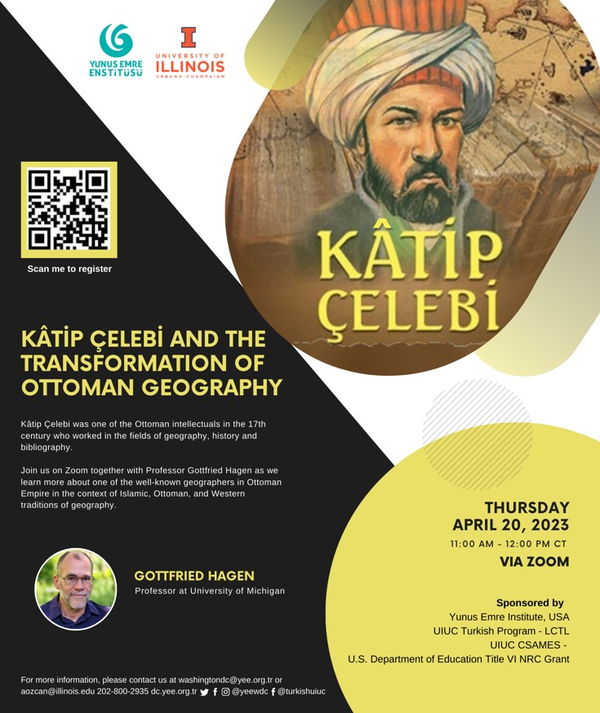 |
Kâtip Çelebi and the Transformation of Ottoman Geography
Kâtip Çelebi was one of the Ottoman intellectuals in the 17th century who worked in the fields of geography, history, and bibliography. Join UIUC's Turkish Program on Zoom together with Professor Gottfried Hagen (Professor, University of Michigan) as we learn more about one of the well-known geographers in Ottoman Empire in the context of Islamic, Ottoman, and Western traditions of geography. |
|
|
Away from the Empire: The Linguistic and Cultural Shift in Ukraine in the Wake of the Russian Invasion: Voldymyr Dubovyk, Oleksandra Deineko, and Olesia Bozhko.Volodymyr Dubovyk (Assistant Professor and Assistant Chairperson in the Department of International Relations, Institute of Social Sciences, Odesa Mechnikov National University); Oleksandra Deineko (Associate Professor, School of Sociology, Kharkiv National University, Guest Researcher at the Norwegian Institute for Urban and Regional Research, OsloMet); Oleisa Bozhko ((Former Ukrainian Diplomat, now an Educator, Founder of the Ukrainian Civil Society Organization "Space of Knowledge") |
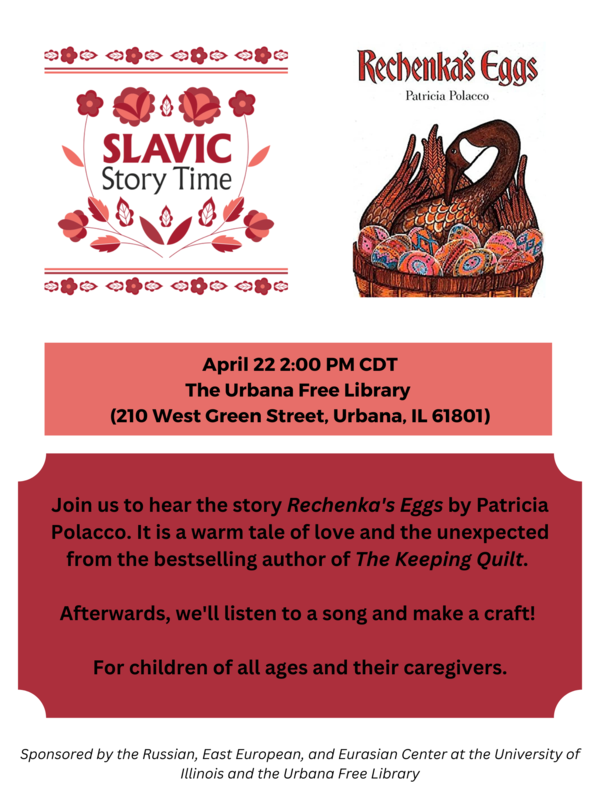 |
Slavic Story Time at The Urbana Free Library
Join us to hear the story Rechenka's Eggs by Patricia Polacco. It is a warm tale of love and the unexpected from the bestselling author of The Keeping Quilt. Old Babushka is preparing her eggs for the Easter festival when she takes in Rechenka, an injured goose, who shows her that miracles really can happen Afterwards, we'll listen to a song and make a craft! |
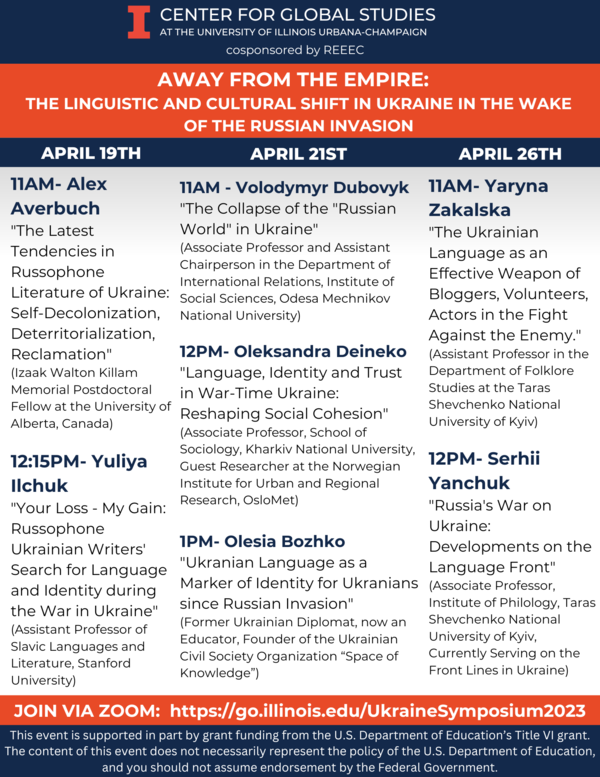 |
Away from the Empire: The Linguistic and Cultural Shift in Ukraine in the Wake of the Russian Invasion: Yaryna Zakalska and Serhii YanchukThe Russian-Ukrainian war of the 21st century aimed not only to physically destroy Ukraine but also to expand the linguistic borders of the “Russian world,” denationalize Ukraine, and reestablish the cultural dominance of Russia over the Ukrainian people. The war that began in 2014 and intensified in the last year's invasion has led to a cultural and linguistic shift from Russian to Ukrainian among much of the Ukrainian population. On April 19, 21, and 26, 2023, the University of Illinois at Urbana-Champaign will host a virtual symposium titled "Away from the Empire: The Linguistic and Cultural Shift in Ukraine in the Wake of the Russian Invasion" that will explore this topic. The symposium will feature seven Ukrainian scholars (linguists, sociologists, literary scholars, ethnologists, and political scientists) and practitioners (front-line interpreters embedded with the Ukrainian Armed Forces). We kindly invite you to this exciting event. The symposium is supported by the Center for Global Studies and the Russian, East European, and Eurasian Center at the University of Illinois. For a full lineup of the symposium, please see the attached flyer. |
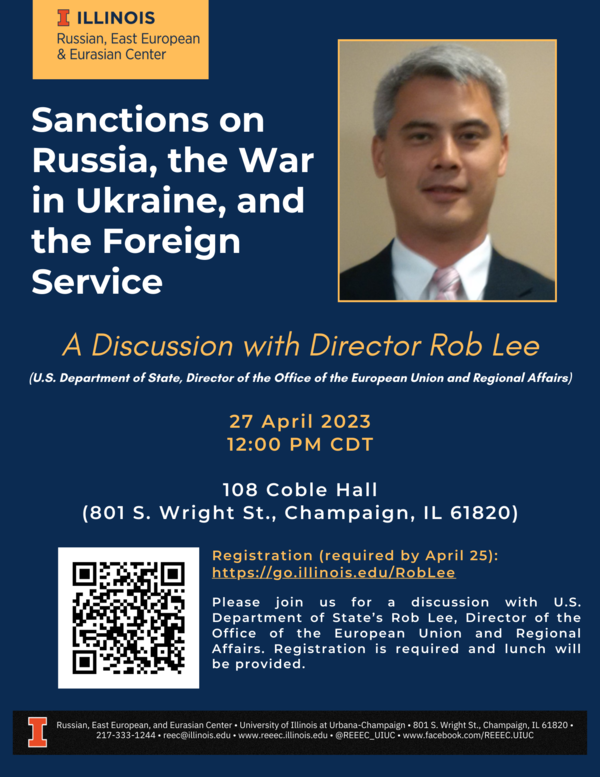 |
Sanctions on Russia, the War in Ukraine, and the Foreign Service: A Discussion with Director Rob Lee
Please join us for a discussion with U.S. Department of State’s Rob Lee, Director of the Office of the European Union and Regional Affairs, on April 27 at 12:00 PM CDT in 108 Coble Hall (801 S. Wright St., Champaign, IL 61820) for a chance to learn about sanctions, what they are, how they’re implemented, and how they’ve been effective against Russia amidst the war in Ukraine. Rob will also discuss his career in the foreign service, opportunities at the State Department, and answer student questions. As Director for the Office of European Union and Regional Affairs, Rob is responsible for formulating and implementing U.S. policy related to and engagement with the European Union at the Department of State. He served as Director for the Office of Regional and Security Policy in the Bureau of East Asian and Pacific Affairs from 2016 to 2018. In this position, he helped formulate the United States’ Indo-Pacific strategy. Prior assignments included: Canberra, Guangzhou, Ankara, EUR’s NATO Desk, the Intelligence and Research Bureau’s Office of Current Intelligence, Shanghai, and Athens. Rob is a Thomas R. Pickering Fellow and has a master’s in public policy from Harvard's John F. Kennedy School of Government and a master’s in national security and resource strategy from the National Defense University’s Eisenhower School. He has a bachelor's degree in government and politics from the University of Maryland. Rob speaks fluent Mandarin and conversational Turkish and Korean. He is married to Julia Fu and they have two children. |
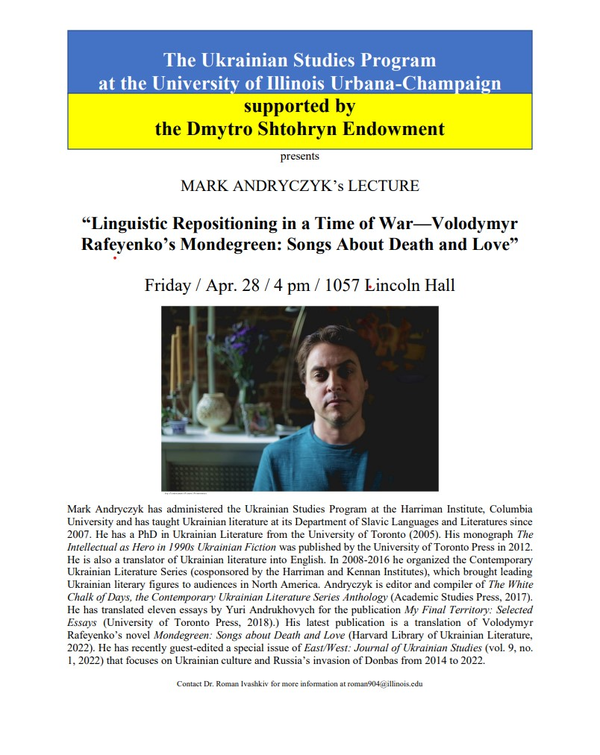 |
Ukrainian Studies Lecture: Mark Andryczyk, “Linguistic Repositioning in a Time of War—Volodymyr Rafeyenko’s Mondegreen: Songs About Death and Love”Mark Andryczyk has administered the Ukrainian Studies Program at the Harriman Institute, Columbia University and has taught Ukrainian literature at its Department of Slavic Languages and Literatures since 2007. He has a PhD in Ukrainian Literature from the University of Toronto (2005). His monograph The Intellectual as Hero in 1990s Ukrainian Fiction was published by the University of Toronto Press in 2012. He is also a translator of Ukrainian literature into English. In 2008-2016 he organized the Contemporary Ukrainian Literature Series (cosponsored by the Harriman and Kennan Institutes), which brought leading Ukrainian literary figures to audiences in North America. Andryczyk is editor and compiler of The White Chalk of Days, the Contemporary Ukrainian Literature Series Anthology (Academic Studies Press, 2017). He has translated eleven essays by Yuri Andrukhovych for the publication My Final Territory: Selected Essays (University of Toronto Press, 2018).) His latest publication is a translation of Volodymyr Rafeyenko’s novel Mondegreen: Songs about Death and Love (Harvard Library of Ukrainian Literature, 2022). He has recently guest-edited a special issue of East/West: Journal of Ukrainian Studies (vol. 9, no. 1, 2022) that focuses on Ukrainian culture and Russia’s invasion of Donbas from 2014 to 2022. |
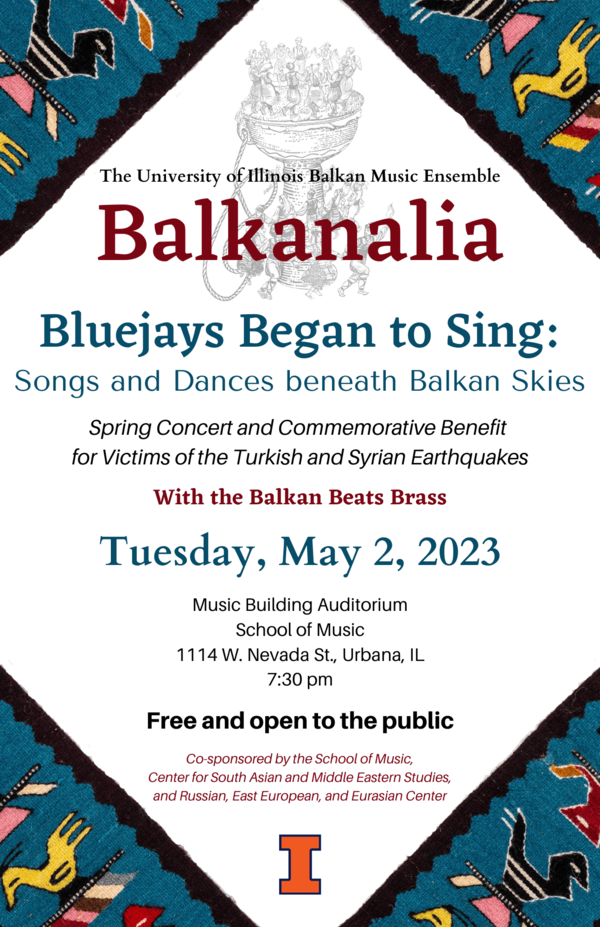 |
Bluejays Began to Sing: Songs and Dances beneath Balkan Skies, Spring Concert and Commemorative Benefit for Victims of the Turkish and Syrian EarthquakesThe University of Illinois Balkan Music Ensemble
Bluejays Began to Sing: Songs and Dances beneath Balkan Skies
Spring Concert and Commemorative Benefit for Victims of the Turkish and Syrian Earthquakes |
Six World Premieres: Opera Scenes and Workshop ProgramSponsored by: Lyric Theater @ Illinois |
|
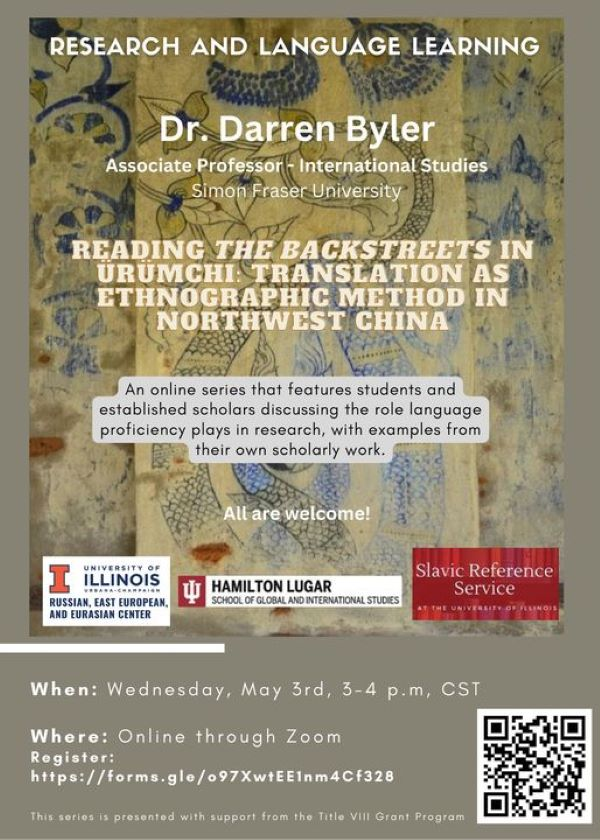 |
Reading the Backstreets in Urumchi: Translation as Ethnographic Method in Northwest China
Please join us on Wednesday, May 3rd, at 3:00 pm Central Time for the last Research and Language Learning talk of the year, featuring Dr. Darren Byler of Simon Fraser University. His talk is entitled, Reading the Backstreets in Urumchi: Translation as Ethnographic Method in Northwest China. Professor Byler will discuss his experiences learning Uyghur and incorporating his language skills in his research. This series aims to provide students and faculty with space to reflect on the ways the language learning and research processes are interconnected. All are welcome to join. Interested individuals may register through the following link: https://forms.gle/566ScxDfbAf8ch5q7. |
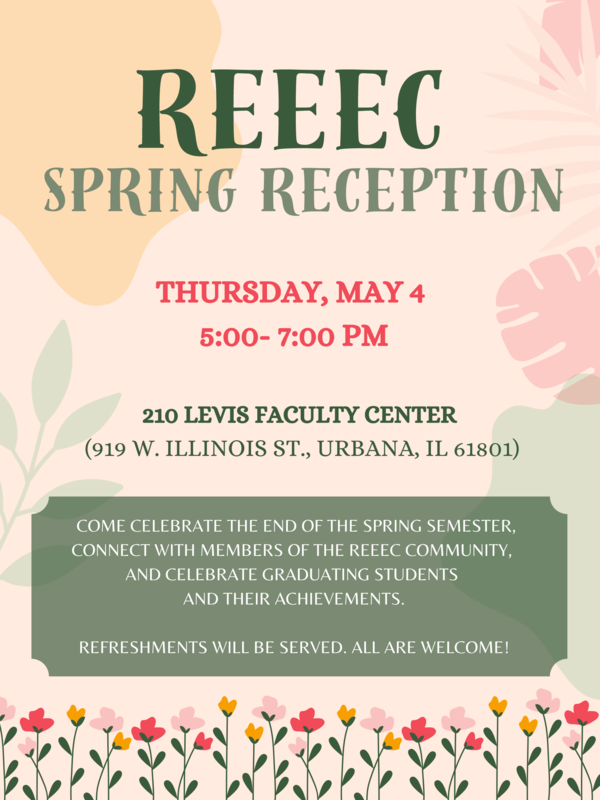 |
REEEC Spring Reception
Please join us at 5:00pm on May 3rd for the REEEC Spring Reception in Room 210 of the Levis Faculty Center. We will celebrate the end of the spring semester, connect with members of the REEEC community, and celebrate graduating students and their achievements. Refreshments will be served. All are welcome! |
Fall 2022
Fall 2022 Events
|
|
REEEC Welcome Back Reception 2022 Date: Sep 14, 2022
Please join us at 4:30 pm on September 14th for the REEEC Welcome Back Reception in room 210 of the Levis Faculty Center. We are excited to kick off the new academic year by connecting in-person with our REEEC community and looking ahead to the coming year. Refreshments will be served. All are welcome! 210 Levis Faculty Center (919 W. Illinois St., Urbana, IL 61801) |
|
|
REEEC Noontime Scholars Lecture: Elizabeth Abosch Date: Sep 20, 2022
Song was a powerful tool for propagandizing socialist construction and for raising the level of cultural education of the new Soviet public. More accessible, versatile, and participatory than art music, song could reach the public through films, the radio, the estrada stage, the komsomol club, the amateur musicians’ circle, and the gramophone. As much as it was beneficial for the development of mass culture, the accessibility of song carried the risk that the not yet fully educated masses would fall victim to the harmful musical influence of “gypsy” song, criminal song, and other song genres associated with urban ills. State cultural organs considered the “musical front” the last stand for vestiges of the bourgeois past which permeated spaces of heathy socialist life and spread through nascent Soviet mass culture like a contagion. While cultural ideologues considered it important that citizens gain the knowledge and taste level to appreciate popular song and art music on the same level, song was particularly didactic and dangerous to emerging Soviet society and its intent to transform the bodies and minds of citizens. Press, literature, and archival documents from the late 1920s and early 1930s reveal the significant role of song in socialist construction and the development of mass culture, and the perceived risk of uncontrolled popular song. |
|
|
Date: Sep 21, 2022
After nearly a year of deliberations, the Task Force on Antisemitism and Academic Freedom of the Association of Jewish Studies released its Working Report in December 2021. Bruce Rosenstock was one of several AJS members who participated in the writing of the Working Report and serves on the Task Force today. The Task Force was formed because it had become apparent that the academic study of the history and nature of antisemitism diverged from the pro-Israel activism of many mainstream Jewish community organizations. Some Jewish Studies faculty members found themselves in disagreement with these organizations or with pro-Israel donors about what constitutes antisemitism. University administrators were caught between pro-Israel community pressure and their commitment to the academic freedom of their faculty members. In response to this growing set of problems, the Association of Jewish Studies decided to examine the issues and offer best practice recommendations about how to respond to mounting charges that university administrators were failing to protect pro-Israel students from what was claimed to be antisemitic harassment. |
|
|
Chicago Immigrant Orchestra Afternoon Pop-Up Concert Date: Sep 27, 2022
Please join us for an afternoon pop-up concert featuring the Chicago Immigrant Orchestra (CIO). This event is free and open to all and offers an opportunity to listen to and talk with the musicians. Refreshments will be served. The CIO is a world music ensemble founded in 1999 by the City of Chicago and now headed by guitarist Fareed Haque and oud player Wanees Zarour. Its instrumentalists and vocalists represent musical traditions from East, South, & Central Asia, the Middle East, Africa, Europe, and Latin America. Performances explore the differences and relationships among these traditions, creating a unique and cohesive tapestry of cultures. Co-Sponsored by: Center for African Studies; Center for Global Studies; Center for Latin American & Caribbean Studies; Center for Middle Eastern & South Asian Studies; Illinois Global Institute; Office of the Vice Provost for International Affairs and Global Strategies; Robert E. Brown Center for World Music; Russian, East European, and Eurasian Center; Women & Gender in Global Perspectives Program |
|
|
The Chicago Immigrant Orchestra Evening Concert Date: Sep 27, 2022
This performance is a co-presentation of Krannert Center and the International and Area Studies Library. This event is free to University of Illinois students, faculty, staff, and their guests, but tickets are required for all audience members. Dedicated to the authenticity and historicity of living musical traditions, the Chicago Immigrant Orchestra was established in 1999 by the Chicago Department of Cultural Affairs and Special Events to perform as part of the first annual Chicago World Music Festival. Directed by Willy Schwartz, the orchestra involved Chicago musicians from the immigrant community representing music from all over the globe. The project lasted through 2004 and had a lasting impact on the Chicago music scene. In 2019, the Chicago Department of Cultural Affairs and Special Events approached guitarist Fareed Haque and oud player Wanees Zarour to restart the Chicago Immigrant Orchestra and headline 2020’s Chicago World Music Festival. Due to the COVID-19 pandemic, the orchestra performed a critically acclaimed virtual concert in September 2020. The new CIO today is a 20-piece ensemble that consists of members of the Chicago immigrant community, representing musical traditions from all over the world. In this fresh approach under the direction of Haque and Zarour, Chicago Immigrant Orchestra musicians from the Far East to Western Europe, Africa and the Americas are thoroughly involved in the evolution of the musical ideas that are presented. One orchestra, a world of music. For more information and to reserve tickets, please visit https://krannertcenter.com/events/chicago-immigrant-orchestra. |
|
|
Ivan Krastev: "Russia's War in Ukraine: Reimagining the East-West Divide in Europe" Date: Oct 4, 2022
The war in Ukraine is having a dramatic impact on the political imagination of Europe. It has reframed the East-West divide by replacing the Cold War narrative of the past decades with one of decolonization and the threat for the sovereignty of the European nation states born out of the disintegration of the 20th century continental empires. The war does not simply change the borders of Europe but also the nature of EU's external borders. It increases the tensions between the imperative for geopolitical EU and the imperative to preserve the constitutional integrity of the Union. This lecture will be held in Levis Faculty Center Room 300, and it will also be livestreamed here: https://ensemble.illinois.edu/Watch/Krastev. "Russia's War in Ukraine: Reimagining the East-West Divide in Europe" is a part of the Illinois Global Institute's "Russia's War on Ukraine: An IGI Series on Global Responsibilities." |
|
|
College of Media: Reporting on Politics and Elections in 2022 Date: Oct 13, 2022
Four of the country's top political journalists will give a behind-the-scenes look at what it's like to cover politics in 2022. The panelists will weigh in on the upcoming midterm elections and potentials national outcomes, from the fate of of President Joe Biden to the control of Congress, and more. Zoom registration link: Webinar Registration - Zoom |
|
|
REEEC Noontime Scholars Lecture: Joanna Kula, "The North Caucasus On and Off the Beaten Track" Date: Oct 18, 2022
The North Caucasus is one of the most diverse regions of Russia in terms of ethnicity, language, religion and, last but not least, landscape. For over two hundred years it has remained part of the Russian state but has maintained its cultural distinction. Classical Russian literature of the 19th century (Pushkin, Lermontov, Tolstoy) created a mythologized image of the Caucasus. The negative portrayal of the 'gorets', 'abrek', 'rebel', 'traitor' or 'terrorist' has been generated and used by official propaganda created to satisfy current political needs. In fact, people in other regions of Russia and Europe know little about the North Caucasus beyond these portrayals. A scholar might find there a whole spectrum of historical, cultural and literary inspirations. 'Reading' the Caucasus requires field research and sensory experience - the Caucasus is color, sound and taste. Joanna Kula, PhD, is a scholar of Russian literature working in the Department of Slavic Studies at the University of Wroclaw (Poland). Her dissertation focused on the problem of a 'hero' in modern Russian prose (A Hero of the End of the 20th Century in Works by Vladimir Makanin, 2013). The main subject of her current research is the region of the Caucasus and its reflection in Russian literature from 19th to 21st century, both fiction and non-fiction. She studies the interaction of the two contrary ideas of geopolitics and geopoetics, colonial and postcolonial narrations, the question of Caucasian self-identity in a post-Soviet era. |
|
|
Illinois Global Institute 'Exploring International Music Night' Date: Oct 19, 2022
Please join the Illinois Global Institute for a night of international music as a part of this year's International Education Week. This performance will include sets by local Congolese rumba musician Jean Rene Balekita and his group Bomoyi, the Illinois Flamenco-Jazz Collective featuring David Chiriboga, and Afro-Brazilian percussion ensemble Bloco Gavião. This event is free and open to the public. |
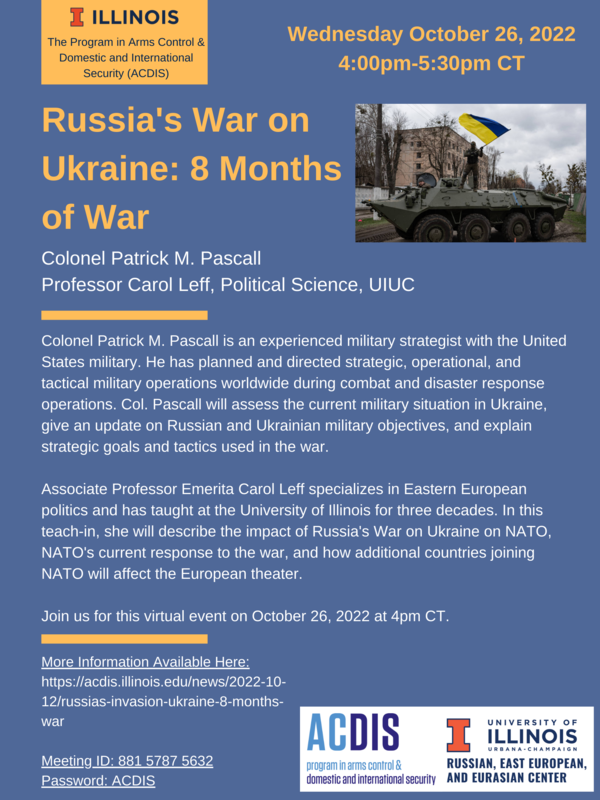 |
Date: Oct 26, 2022
Colonel Patrick M. Pascall is an experienced military strategist with the United States military. He has planned and directed strategic, operational, and tactical military operations worldwide during combat and disaster response operations. Col. Pascall will assess the current military situation in Ukraine, give an update on Russian and Ukrainian military objectives, and explain strategic goals and tactics used in the war. Associate Professor Emerita Carol Leff specializes in Eastern European politics and has taught at the University of Illinois for three decades. In this teach-in, she will describe the impact of Russia's War on Ukraine and NATO, NATO's current response to the war, and how additional countries joining NATO will affect the European theater. |
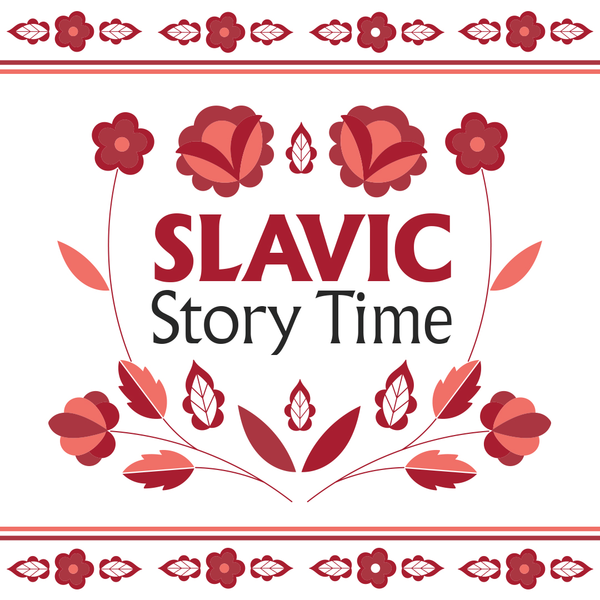 |
Slavic Story Time at The Urbana Free Library Date: Oct 29, 2022
Join us to hear the story "The Girl Who Cried a Lake" from Tales Told in Tents: Stories from Central Asia by Sally Pomme Clayton & Sophie Herxheimer. Afterwards, we'll listen to a song and make a craft! For children of all ages and their caregivers. |
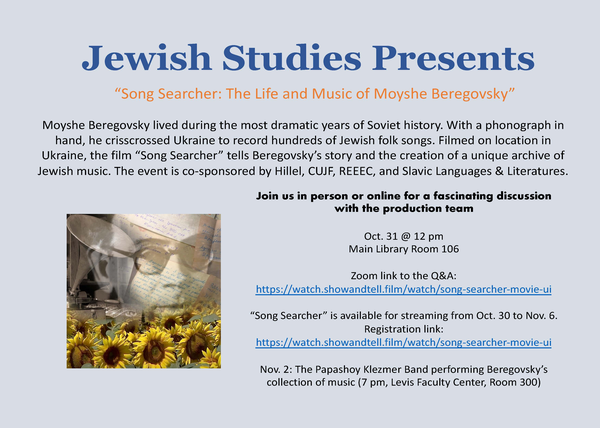 |
Live Q&A with the production team of "Song Searcher" Date: Oct 31, 2022
There will be a Live Q&A over Zoom with the production team of the film "Song Searcher" on Zoom at 12:00 PM Monday, October 31st. For information on accessing the Q&A Zoom, please see https://watch.showandtell.film/watch/song-searcher-movie-ui. The film is the story of a man’s lifelong search for authentic Yiddish folk music and of his unique archive, which was presumed to be lost forever. Moyshe Beregovsky, a musician and scholar, crisscrossed Ukraine with phonograph in hand during the most dramatic years of Soviet history in order to record and study the traditional music of Ukrainian Jewry. His work began in the 1920’s and led to his arrest and imprisonment in a Stalinist labor camp in 1950. Most of those he recorded on hundreds of fragile wax cylinders were shot by the Nazis and tossed into countless mass graves. Ultimately, Beregovsky succeeded in saving the musical heritage of the centuries-old Yiddish civilization. He rescued the Living Voice of his people from the flames of the Holocaust but paid for it with his life. |
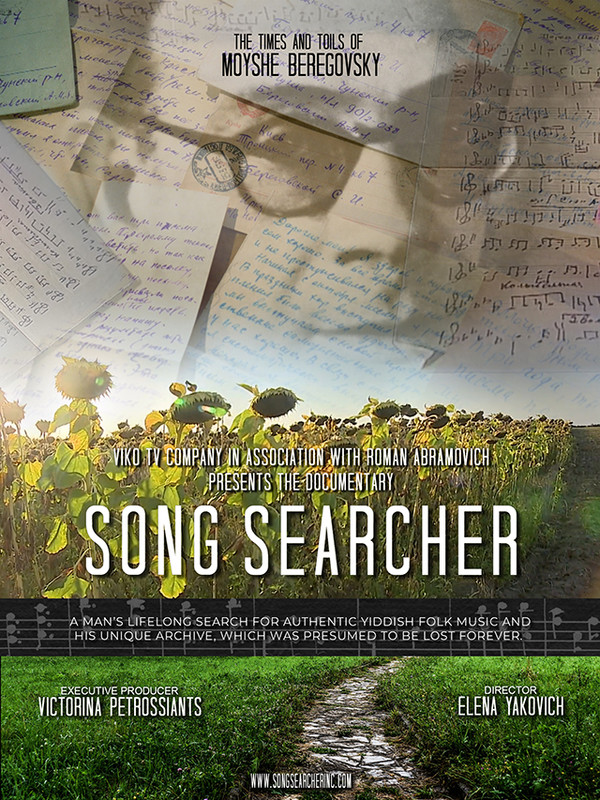 |
Date: Nov 1, 2022
There will be a screening of the film "Song Searcher" on Tuesday, November 1 at 7:00 PM at Illini Hillel (503 E. John St., Champaign, IL 61820). The film will also be available for online screening through November 6 at https://watch.showandtell.film/watch/song-searcher-movie-ui. |
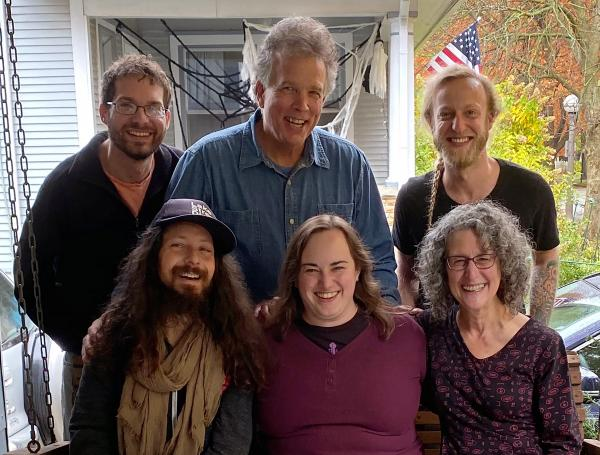 |
Date: Nov 2, 2022
The Papashoy Klezmer Band will be performing Wednesday, November 2 at 7:00 PM at Room 300 Levis Faculty Center (919 W. Illinois St., Urbana, IL 61801). Papashoy Klezmer Band is a local band that plays old-time klezmer music in the style of the village bands of Ukraine. The ensemble includes Frances Harris (fiddle) and Amanda Ramey (fiddle), Rob Sweedler (accordion), Rob Krumm (guitar), and Charlie Harris (bass). |
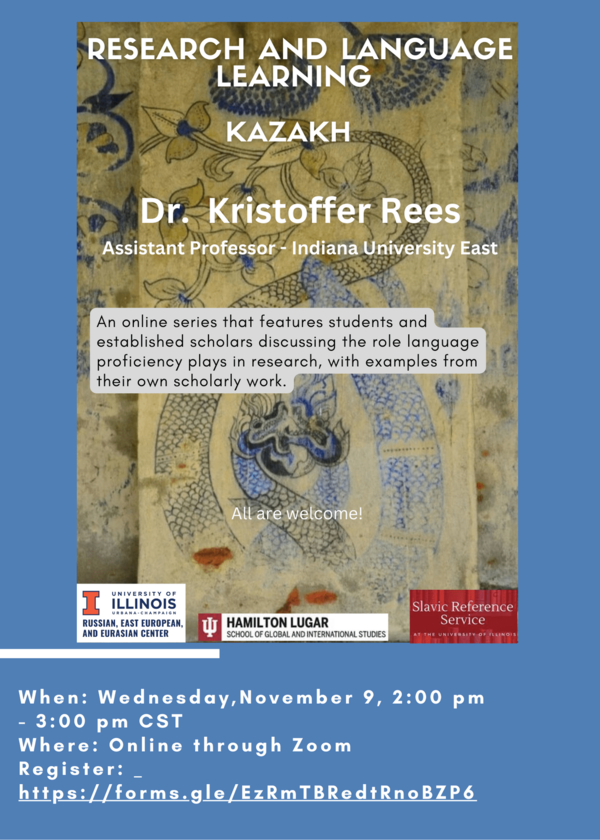 |
Research and Language Learning: Kazakh Date: Nov 9, 2022
The Language Workshop at Indiana University, the Slavic Reference Service, and the Russian, East European, and Eurasian Center at the University of Illinois (Urbana-Champaign) are hosting an online discussion series - Research and Language Learning.
We are inviting established scholars to discuss the role language proficiency plays in research, with examples from their own scholarly work. The initiative will be launch with the Turkic languages of Kazakh, Kyrgyz, Turkish, Uyghur, and Uzbek. We welcome language learners of all academic backgrounds to participate in these discussions. |
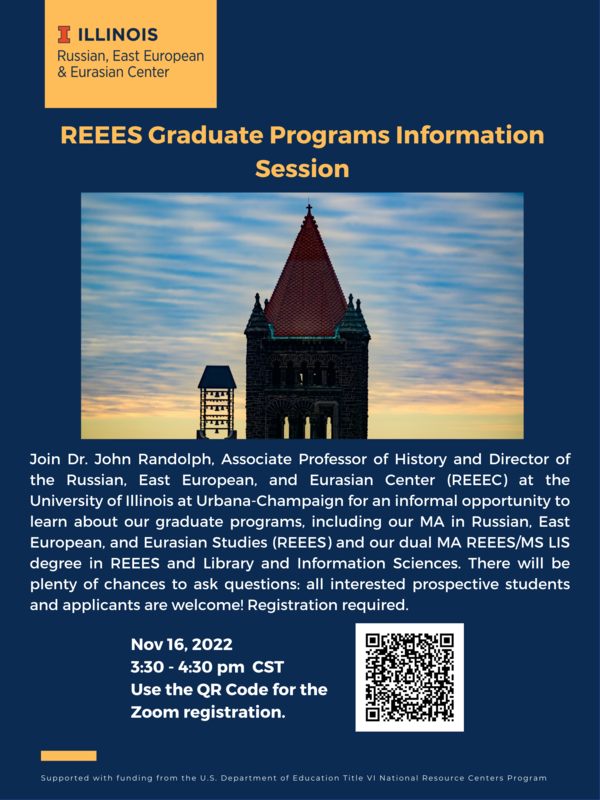 |
REEES Graduate Programs Information Session Date: Nov 16, 2022
Join Dr. John Randolph, Associate Professor of History and Director of the Russian, East European, and Eurasian Center (REEEC) at the University of Illinois at Urbana-Champaign for an informal opportunity to learn about our graduate programs, including our MA in Russian, East European, and Eurasian Studies (REEES) and our dual MA REEES/MS LIS degree in REEES and Library and Information Sciences. There will be plenty of chances to ask questions: all interested prospective students and applicants are welcome! |
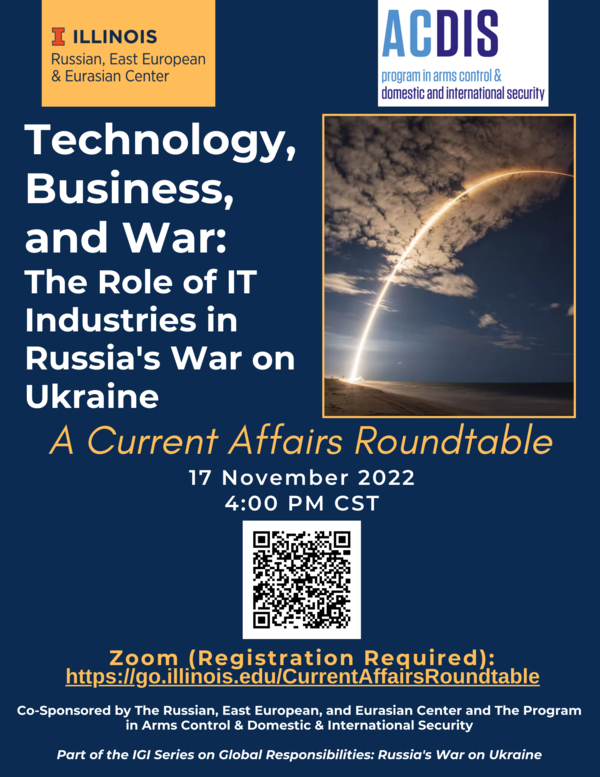 |
Technology, Business, and War: The Role of IT Industries in Russia's War on Ukraine Date: Nov 17, 2022
In mid-October, Elon Musk announced his companies could no longer support Starlink services over Ukraine. This immediately threatened to sever communications systems on which Ukraine has depended since Russia’s invasion last February. Musk himself has also sought to intervene in geopolitics in other ways–reportedly consulting with Russian President Vladimir Putin before proposing his own thoughts on a Ukraine peace deal on Twitter. While Musk more recently said that Starlink services will continue, the incident highlights the mounting power of IT industries and their owners in all aspects of modern life, including war. As the Washington Post as recently noted, “With tech giants amassing stratospheric levels of influence over global affairs, they are morphing into a species of geopolitical actor, with uncertain long-term consequences.” This raises the question whether a new, “technopolar” world is emerging outside of states, transcending the geography of the post-Cold War era. This roundtable will explore these issues, with reference to the ongoing war in Ukraine as well as events across contemporary Eastern Europe and Eurasia. How are information technologies and industries shaping war and politics? What roles are being played by transnational information technologies and industries in the region,, and how has this evolved over the course of the war in Ukraine? What lessons does this experience have for the world at large, as it considers how to react to the rapid accumulation of money and power in the IT sector? Please join us for a Current Affairs Roundtable discussing these issues, with perspectives from both IT and area studies disciplines. |
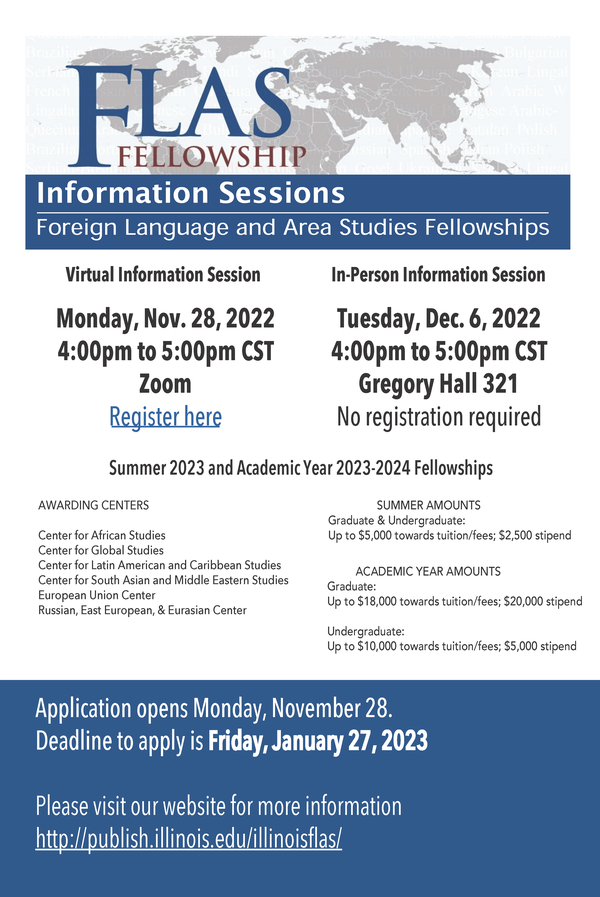 |
FLAS Virtual Information Session I Date: Nov 28, 2022
Upcoming information session for students interested in applying for Summer 2023 and AY 2023-2024 Foreign Language and Area Studies (FLAS) fellowships. Virtual Session I will be Monday, November 28, 2022, from 4:00 p.m. to 5:00 p.m. Undergraduate and graduate students are welcome. To register for Virtual Session 1, please visit: https://go.illinois.edu/FLASInfo1 Topics of discussion include eligibility and requirements, walking through the application, and answering questions about the application process and the fellowship. FLAS Coordinators from individual Centers will be in attendance and available to the students for questions and discussion in break-out sessions after the main presentation. |
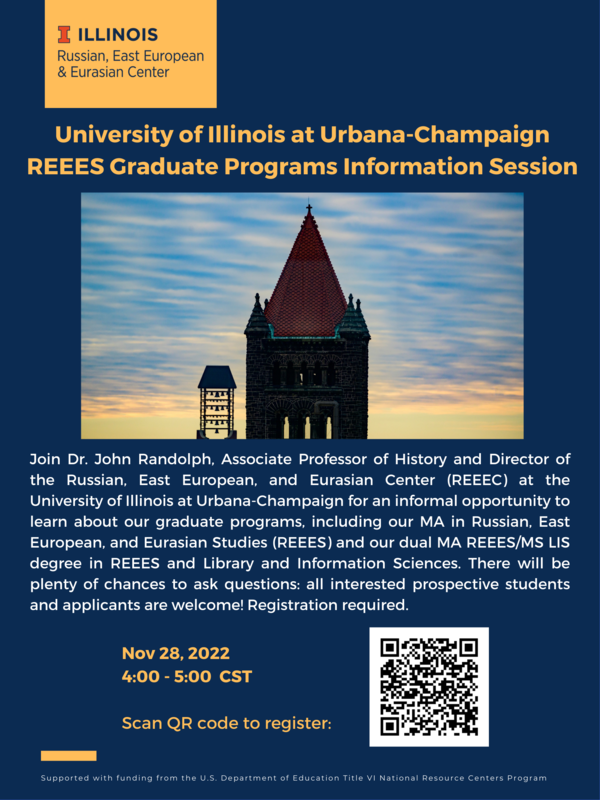 |
REEES Graduate Programs Information Session Date: Nov 28, 2022
Join Dr. John Randolph, Associate Professor of History and Director of the Russian, East European, and Eurasian Center (REEEC) at the University of Illinois at Urbana-Champaign for an informal opportunity to learn about our graduate programs, including our MA in Russian, East European, and Eurasian Studies (REEES) and our dual MA REEES/MS LIS degree in REEES and Library and Information Sciences. There will be plenty of chances to ask questions: all interested prospective students and applicants are welcome! |
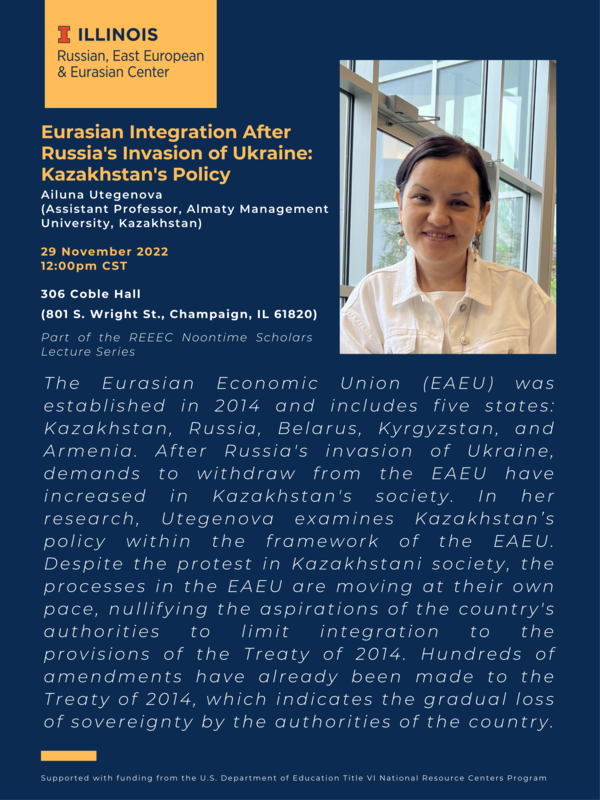 |
Date: Nov 29, 2022
The Eurasian Economic Union (EAEU) was established in 2014 and includes five states: Kazakhstan, Russia, Belarus, Kyrgyzstan and Armenia. The Concept of Foreign Policy of Kazakhstan for 2020-2030 states that integration within the EAEU would be carried out only within the framework of the Treaty on the Establishment of the EAEU of May 29, 2014. However, processes within the EAEU have been going beyond the scope of the Treaty, spreading on more and more areas that are not considered in the Treaty of 2014. Thus, by 2025, the EAEU five member-countries plan to complete the formation of a common energy market, a common financial market, and the aim of creating a common educational space is also being discussed. After Russia's invasion of Ukraine, demands to withdraw from the EAEU have increased in Kazakhstan’s society. There had been protests against the EAEU in Kazakhstan at the time of signing the treaty in 2014, but this year the voices of opponents of Kazakhstan's participation in the EAEU gained a new impetus. In my research, I examine what policy Kazakhstan has been implementing within the framework of the EAEU. Despite the protests in Kazakhstani society, the processes in the EAEU are moving at their own pace, nullifying the aspirations of the country's authorities to limit integration to the provisions of the Treaty of 2014. Hundreds of amendments have already been made to the Treaty of 2014, which indicates the gradual loss of sovereignty by the authorities of the country. Ailuna Utegenova is an Assistant Professor at Almaty Management University (AlmaU), Kazakhstan. Currently she has an internship on “Pedagogy and Educational Technologies” at the UIUC. Her research includes Kazakhstan’s foreign policy strategy toward Russia and Kazakhstan’s policy in the EAEU. |
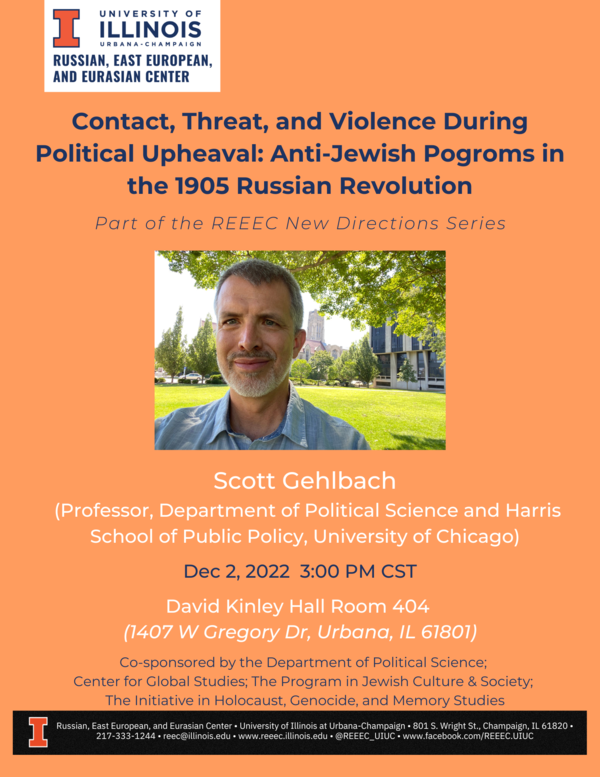 |
Date: Dec 2, 2022
What drives violent confrontation between groups in multi-ethnic and multi-confessional societies? Why do some communities in such societies experience conflict, while others remain peaceful? We explore these questions in the context of the 1905 Russian Revolution, which triggered numerous anti-Jewish pogroms. We show that the sharp increase in pogroms after October 1905, when publication of the October Manifesto and accompanying antisemitic propaganda increased feelings of political threat among many non-Jews, was smaller in settlements with relatively large Jewish populations. Our findings suggest that diversity can help to insulate communities from the violence that often accompanies momentous political change. Scott Gehlbach is a professor in the Department of Political Science and Harris School of Public Policy at the University of Chicago. A political economist and comparativist, Gehlbach’s work is motivated by the contemporary and historical experience of Russia, Ukraine, and other postcommunist states. He has made numerous contributions to the study of autocracy, economic reform, political connections, and other important topics in political economy. Known for employing a wide range of methods in his research, Gehlbach has contributed to graduate education through his widely used textbook Formal Models of Domestic Politics. He is the author or coauthor of many articles in top journals, including the American Political Science Review, the American Journal of Political Science, and the Journal of Politics; the award-winning monograph Representation Through Taxation: Revenue, Politics, and Development in Postcommunist States; and the forthcoming Cambridge Element Reform and Rebellion in Weak States. |
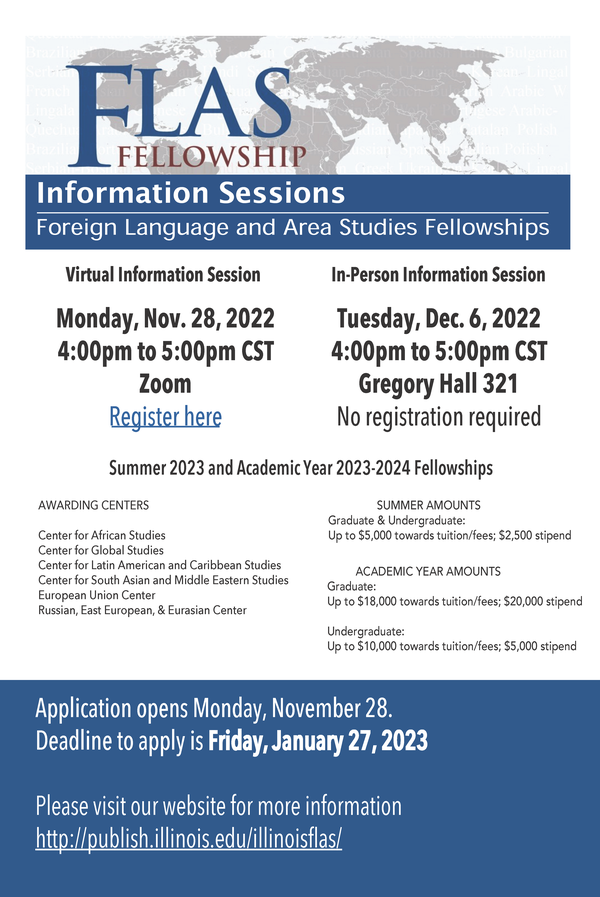 |
FLAS In-Person Information Session II Date: Dec 6, 2022
Upcoming information session for students interested in applying for Summer 2023 and AY 2023-2024 Foreign Language and Area Studies (FLAS) fellowships. In-Person Session II will be Tuesday, December 6, 2022, from 4:00 p.m. to 5:00 p.m. CT in Gregory 321. Undergraduate and graduate students are welcome. Topics of discussion include eligibility and requirements, walking through the application, and answering questions about the application process and the fellowship. FLAS Coordinators from individual Centers will be in attendance and available to the students for questions and discussion in break-out sessions after the main presentation. |
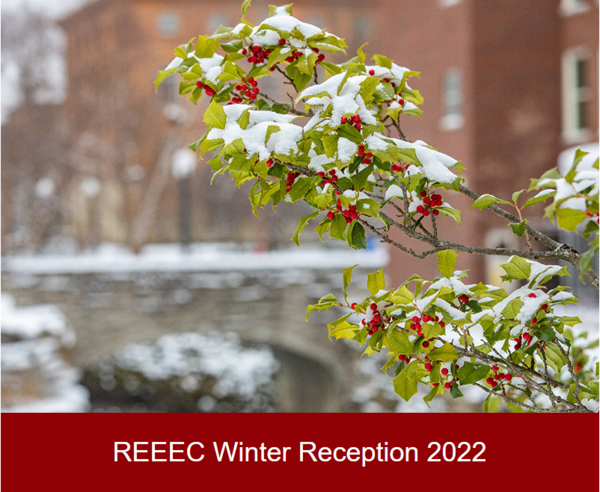 |
Date: Dec 7, 2022
Please join us at 4:30 pm on December 7th for the REEEC Winter Reception to celebrate the end of the fall semester. Refreshments will be served. All are welcome! Wednesday, December 7th, 4:30-6:30 PM 300 Levis Faculty Center 919 W. Illinois St., Urbana, IL 61801 |
Summer 2022
Summer 2022 Events
|
REEES Policy Research Roundtable: Russia-Ukraine War Date: Jun 8, 2022
Join the Slavic Reference Service on June 8 at 2:00 p.m. CST for a roundtable discussion on policy research and projects related to the Russia-Ukraine War. Panelists for the discussion include David Satter of the Hudson Institute, Dr. Paul Stronski of the Carnegie Endowment for International Peace, and Dina Spechler of Indiana University, Bloomington. |
|
|
Russia and the Global Color Line Workshop Date: Jul 14-15, 2022
Workshop Organizers: Eugene M. Avrutin (Tobor Family Endowed Professor of Modern European Jewish History, University of Illinois) and Professor Valeria Sobol (Department of Slavic Languages and Literatures, University of Illinois) Zoom registration link: https://illinois.zoom.us/meeting/register/tZMrcu6orDssGN3HsXsJerNdDaegFgeApRVA Probing the role of Russia in the global dimensions of the color line, this interdisciplinary workshop raises exploratory questions about the meanings and functions of racial identifications and categories; the relationship between race, whiteness, and geography; how Russia fits into the global dimensions of the color line; and when and why skin color emerged as an important element in the complex process of identity formation. This workshop is a part of this year’s Summer Research Laboratory (SRL) in Russian, East European, and Eurasian Studies at the University of Illinois at Urbana-Champaign, and is sponsored by the Humanities Research Institute, the University of Illinois History Department, Slavic Languages & Literatures Department, Slavic Reference Service, and Russian, East European, and Eurasian Center (Ralph & Ruth Fisher Fund). |
|
|
Date: Jul 21, 2022
Cavallaro's dissertation forms two interlocking microhistories examining the intertwined trajectories of two 19th century Russian imperial museums: the Tver Historical Museum, which opened in provincial Tver in 1866, and the National Museum of Turkestan, which opened in colonial, Central Asian Tashkent in 1876. Following these museums from their founding to 1917, his research operates on three scales: the local, imperial, and global. At the local scale, he examines travelogues, newspapers, and exhibition materials to reconstruct the daily life of museums’ employees and visitors. At the imperial scale, he explores literary works and publications of archaeological and ethnographic societies to argue that intellectuals in Moscow and St. Petersburg apprehended provincial and colonial sites in remarkably similar terms: as places of exploitation, where raw materials could be collected and sent to the center. At the global scale, he considers how museums, a new European technology, were involved in networks of knowledge production beyond the empire. His dissertation shows these museums engaged in a single project to historicize and create proper models of Russian citizenship and nation. Imperial officials simultaneously claimed affinity with Europe and sought to “Europeanize” museum visitors, and, by extension, the empire itself. |
|
|
Fisher Fellow Talk: "Materialising Soviet Selves: Letters, Loyalty and Gender, 1936-40" (Hannah Parker, University of Sussex) Date: Jul 28, 2022
‘I am so anxiously sorry that I cannot show you in any way my gratitude, my desire to be of any use to you’, closed one letter from E.V. Krasnova in Southern Ukraine, in response to Molotov’s intervention in her pension application due to her late husband’s revolutionary merits. Krasnova’s letter can be read as an attempt to substantiate her gratitude, mitigating her distance from Molotov by traversing distance and rank. Critical to Soviet women’s sense of emotional ‘security’, (Tikhomirov, 2013), this paper contends that letters constituted vessels for the ‘productive entanglements’ by which Soviet people negotiated the self, feeling, belonging in dialogue with Soviet power, as the intensification of social and political control reached crescendo. These negotiations were deeply gendered, as women formulated and concretized their history and memory through discursive forms of women’s emancipation, education, and revolution. Hannah Parker is a historian of gender, selfhood, and letter-writing in Russia and the Soviet Union. After completing her PhD and a Teaching Associateship at the University of Sheffield, she held lectureships at the Universities of Gloucestershire and Sussex. Her research interests focus on gender, emotion, education, and selfhood, as well as letter-writing and materiality, in the early Soviet Union, and recent publications have addressed the emotions of female librarians in the early Soviet Union, the performance of loyalty and gratitude in letters to Soviet authorities during the Terror, and new scholarship in public history. She is currently developing these interests in pursuit of a community history project based in Sheffield. |
Spring 2022
Spring 2022 Events
|
Date: Jan 28, 2022
The COVID-19 pandemic has exposed and exacerbated pre-existing institutional, structural, and systemic discrimination and inequality in societies across the world. Furthermore, continued campaigns against gender and LGBTQ equity in Eastern Europe and Eurasia, racism in the United States, and the social protest movements that rose in response to such exclusionary projects have reinforced calls for intersectional approaches in Slavic, East European, and Eurasian Studies (SEEES). Class, ethnicity and race, dis/ability, gender and sexuality, and other identity markers interweave to produce inequality differently in Eastern Europe and Eurasia than in the Americas or Western Europe. Yet, it is these very differences that provide a rich ground for intellectual conversations in our field. |
|
|
Date: Feb 4, 2022 The COVID-19 pandemic has exposed and exacerbated pre-existing institutional, structural, and systemic discrimination and inequality in societies across the world. Furthermore, continued campaigns against gender and LGBTQ equity in Eastern Europe and Eurasia, racism in the United States, and the social protest movements that rose in response to such exclusionary projects have reinforced calls for intersectional approaches in Slavic, East European, and Eurasian Studies (SEEES). Class, ethnicity and race, dis/ability, gender and sexuality, and other identity markers interweave to produce inequality differently in Eastern Europe and Eurasia than in the Americas or Western Europe. Yet, it is these very differences that provide a rich ground for intellectual conversations in our field. |
|
|
|
Date: Feb 11, 2022
The COVID-19 pandemic has exposed and exacerbated pre-existing institutional, structural, and systemic discrimination and inequality in societies across the world. Furthermore, continued campaigns against gender and LGBTQ equity in Eastern Europe and Eurasia, racism in the United States, and the social protest movements that rose in response to such exclusionary projects have reinforced calls for intersectional approaches in Slavic, East European, and Eurasian Studies (SEEES). Class, ethnicity and race, dis/ability, gender and sexuality, and other identity markers interweave to produce inequality differently in Eastern Europe and Eurasia than in the Americas or Western Europe. Yet, it is these very differences that provide a rich ground for intellectual conversations in our field. |
|
ASEEES - Pitt Intersectionality in Focus Series: "(Post-)Pandemic Eurasia: Why Intersectionality Matters"
The COVID-19 pandemic has exposed and exacerbated pre-existing institutional, structural, and systemic discrimination and inequality in societies across the world. Furthermore, continued campaigns against gender and LGBTQ equity in Eastern Europe and Eurasia, racism in the United States, and the social protest movements that rose in response to such exclusionary projects have reinforced calls for intersectional approaches in Slavic, East European, and Eurasian Studies (SEEES). Class, ethnicity and race, dis/ability, gender and sexuality, and other identity markers interweave to produce inequality differently in Eastern Europe and Eurasia than in the Americas or Western Europe. Yet, it is these very differences that provide a rich ground for intellectual conversations in our field. |
|
|
Presentation & Discussion: Eileen Kane, "Racial Segregation in Odessa, Early 1900s" Date: Mar 3, 2022
Eileen Kane is Associate Professor of History and Director of the Global Islamic Studies Program, Connecticut College. This event is part of the Humanities Research Institute research cluster “Russia and the Global Color Line“.
|
|
|
|
"History as Convenient Pretext": The Use and Misuse of History in the Invasion of Ukraine Date: Mar 3, 2022
|
|
Africa, Race and the War in Ukraine: An Open Discussion Date: Mar 4, 2022 |
|
|
Racism in Modern Russia: A short History Date: Mar 6, 2022
Concerned about recent antisemitism on campus and the situation in Ukraine? Join CUJF fo an online presentationand discussion with Prof. Eugene Avrutin based on his new book, Racism in Modern Russia. |
|
|
"The Ukrainian Crisis in Regional and Global Perspective: A Political Science Roundtable" Date: Mar 7, 2022 |
|
|
Date: Mar 8, 2022 The Slavic Reference Service is hosting the International Women Day's recognition event. We will highlight collections, sources, and the contributions of scholars in the field. Moreover, we will share information on ways to support those affected by the war in Ukraine. |
|
|
Date: Mar 8, 2022
|
|
|
|
Digital Activism and International Law in Ukraine Join UIUC international law, social informatics, and finance experts for a virtual panel on "Digital Activism and International Law in Ukraine" this Tuesday, March 8th, at 12pm. Professors Tatyana Deryugina (Gies College of Business), Madelyn Sanfilippo (School of Information Sciences), and Patrick Keenan (College of Law) will shed light on digital activism, social media platform responses, online fundraising efforts to help people affected by the war, and legal issues, including war crimes, as these pertain to the current situation in Ukraine. |
|
Digital Activism and International Law in Ukraine Date: Mar 8, 2022
|
|
|
NGOs at Work in Ukraine: Spotlight on Soleterre Date: Mar 10, 2022
|
|
|
Date: Mar 22, 2022
Although Peter the Great famously expanded Russia's coastlines and began its development into a major naval power, he and his successors were much less successful in fostering Russian maritime trade. Virtually to the end of the tsarist era, most imports were delivered to St. Petersburg and other ports by foreign merchants on foreign ships, and most Russian exports left the same way. Though imperial expansion and immigration had resulted in minority and foreign communities on the empire's coasts who made their living through shipping (Greeks, Armenians, Germans, Jews, Britons, Persians, etc.), state officials never stopped complaining that the ethnic Russian core of the empire's merchantry had little expertise or interest in seafaring. Economists' analyses of Russia's untapped potential to win profits and prestige in foreign trade dwelled on this stereotype, which became a key facet of what Geraci calls a full-blown and pervasive "trope of Russian commercial inferiority" that arguably continues to haunt Russian consciousness even today. Using a wide variety of historical sources, Prof. Geraci will show the evolution of the discourse around maritime trade in 19th-century Russia before fixing attention on the Society for the Promotion of Russian Commercial Seafaring, a state-supported civic organization founded in 1873. The group championed the elimination of what it deemed to be the chief structural and legal obstacles to Russian maritime trade and took on the educational and cultural challenge of changing the mindset and skill set of Russian merchants and traders. Besides offering some provisional conclusions as to the relative success of these efforts, the talk will discuss in some detail a handful of the movement's key figures, whose views and activities stemmed from first-hand knowledge of demographic, social, and economic conditions in various ports such as Riga, Arkhangel'sk, St. Petersburg, Odessa, Baku, and Vladivostok. |
|
|
Virtual Open House for Admitted REEES MA Students Date: Mar 24, 2022 |
|
|
|
Date: Mar 29, 2022
The Republic of Belarus, which used to be part of the Soviet Union, became an independent state in 1991. It was expected that Belarus would follow the same path in the way of its independent nation-building as the other former Soviet republics, i.e., it would promote its national identity and the use of the national language in the public and private spheres of life. The tentative attempt to introduce a new language policy that stipulated for a gradual switch to Belarusian as the sole state language first seemed quite successful. The referendum of 1995, however, reintroduced the Russian language as the second state language, which in practice meant squeezing Belarusian out of the public sphere, and going back to Belarus being a predominantly Russian-speaking country. The events of August 2020 (presidential election in Belarus and its aftermath) gave rise to a new interest in the Belarusian language. The use of Belarusian in public spaces, together with the white-red-white flag, became a symbol of the fight of the people against the dictatorial regime of President Lukashenko. Since the authorities in Belarus perceived the use of Belarusian and demonstration of the opposition flag as ideological threats to the regime, speaking the language and displaying the flag became the reason for severe repercussions against Belarusian citizens. It could be argued that that the new language policy of the 1990s failed because the national identity of Belarusians was still in its infancy by the time the Soviet Union collapsed. With the Russian language remaining the medium of urban dwellers’ communication and a means of upward social mobility since the times of the tsarist empire, the value of being fluent in Belarusian continued to be questionable for most of the Belarusian population. However, the egregious rigging of the voting results, the brutal crackdown on protesters, as well as on civil society and independent mass media after the election of 2020, created a new vision of the Belarusian nation: the one united by history, memory, traditions, ancient symbols, and the Belarusian language in its struggle for freedom and democracy. |
|
|
Date: Mar 29, 2022
The end of the Soviet bloc has been typically figured as a moment of opening for its citizens. Iconic images of Berlin youth breaking through the Wall (or Muscovities lining up for the first McDonald's) stand in for this new openness. However, such an account would only be true if we limit ourselves to the bloc's Western borders. From the point of view of "the East"--the numerous African and Asian societies with which the Soviet bloc engaged--1989 or 1991 was a moment of the Second World's (self-)provincialization, the near-total severing of cultural networks leading to anywhere but the West. Beyond offering an inventory of the ruins of these once-vibrant engagements, this talk will historicize one of their important legacies, namely, the racism of the contemporary Russian and East European intelligentsias. It emerged among certain anti-Soviet dissident millieus, as a negation of the official anti-racist propaganda, the support for Third-Worldist (Vietnamese, Palestinian, Angolan, etc.) forces or the Civil Rights movement in the U.S., and even the workings of Soviet affirmative action. This backlash built upon an older civilizational hierarchies (whose more innocent manifestations have been studied in recent scholarship as "the imaginary West"), in which the East or the South figured as backward spaces best avoided. |
|
Christina Crawford – “Spatial Revolution in Soviet Ukraine: Kharkiv, 1930 Date: Mar 30, 2022
Illinois Ricker Library has pulled together some publications and videos on our lecture guest. Please visit this link to view. Christina E. Crawford is an architectural and urban historian, a trained architect, and assistant professor of architectural history at Emory University, whose research focuses on the transnational exchange of ideas about housing and urban form in the twentieth century. Her research and publications have been supported the American Council of Learned Societies, the Getty Foundation, the Graham Foundation, and the College Art Association, among other institutions. She is the author of Spatial Revolution: Architecture and Planning in the Early Soviet Union (Cornell University Press, 2022), and co-editor of Detroit-Moscow-Detroit: An Architecture for Industrialization, 1917-1945 (MIT Press, 2023). She serves on the board of the Society of Historians of Eastern European, Eurasian and Russian Art and Architecture (SHERA).
|
|
|
Date: Mar 31, 2022
Speakers: Professor Nicholas Grossman, Political Science. Professor Tomasz Kozlowski, NPRE. Professor Frederick Lamb, Physics. Dr. Grossman will assess the current military situation in Ukraine, including the history of the conflict, Russian and Ukrainian military objectives, strategic goals and tactics used, the importance of Western military support, possible reasons for Russia's slow progress, and the consequences that this conflict can entail. Dr. Kozlowski will summarize the nuclear industry in Ukraine, state the risks of conventional warfare to the safe operation of nuclear facilities, describe the impact of a possible nuclear accident caused by the war, and what can be done to uphold nuclear safety during the war. Dr. Lamb will cover nuclear security in Europe in light of Russia’s war on Ukraine, including a summary of the past nuclear disarmament in Ukraine, the history of the Budapest Memorandum, broader implications of the war for non-proliferation efforts, stated Russian concerns of possible nuclear armed missiles in Ukraine, and if a new Intermediate-Range Nuclear Force Treaty could contribute to the resolution of the conflict. Part of IGI's series “Russia’s War on Ukraine"
|
|
|
Date: Mar 31, 2022
Spurlock Museum is hosting a screening of Andrei Kureichik’s Insulted. Belarus(sia), with a following talkback with Andrei Kureichik, George A Miller Visiting Artist, and Dr. Maria Ignatieva, OSU. Hosted by: Department of Theatre and Russia, East European and Eurasian Center; US Department of Education Title VI NRC program In conjunction with: Department of Dance, Department of history, Department of Journalism, Department of Religion, Department of Slavic Languages & Literatures, European Union Center, Humanities Research Institute (HRI), Illinois Global Institute (IGI), INNER VOICES Social Theatre program, Krannert Art Museum, Krannert Center for the Performing Ares, Spurlock Museum
|
|
|
Discussion/Q&A with a Scholar/Journalist Currently in the Eastern European Region Date: Apr 1, 2022
This is a discussion and Q&A on the war in Ukraine with a scholar/journalist based in the region. Registration will be capped at 50. If you would like to share questions in advance, please email them to eucenter@illinois.edu. |
|
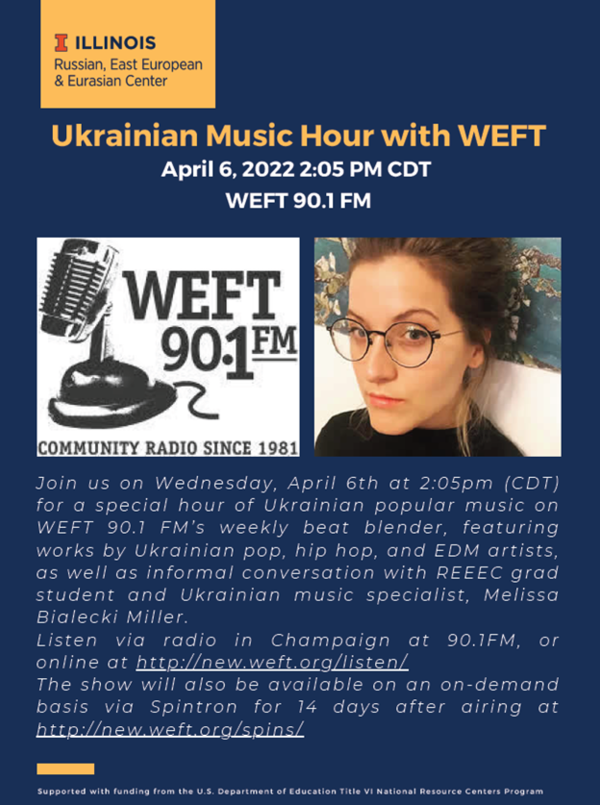 |
Ukrainian Music Hour with WEFT Date: Apr 6, 2022
Join us on Wednesday, April 6th at 2:05pm (CDT) for a special hour of Ukrainian popular music on WEFT 90.1 FM’s weekly beat blender, featuring works by Ukrainian pop, hip hop, and EDM artists, as well as informal conversation with REEEC grad student and Ukrainian music specialist, Melissa Bialecki Miller. Listen via radio in Champaign at 90.1FM, or online at http://new.weft.org/listen/ The show will also be available on an on-demand basis via Spintron for 14 days after airing at http://new.weft.org/spins/
|
|
Legal Humanities Lecture: Anthony Ray Hinton Date: Apr 13, 2022 Anthony Ray Hinton from the Equal Justice Initiative will deliver a public lecture. Hinton spent more than 30 years on death row in Alabama for a crime he didn't commit, before being exonerated by a legal team led by Bryan Stevenson. His story was featured in the film "Just Mercy." Hinton is also the author of The Sun Does Shine: How I found Life, Freedom, and Justice. |
|
|
|
Performing Resistance to Authoritarianism (MillerComm 2022) Date: Apr 14, 2022
Andrei Kureichik, an internationally celebrated theatre artist and filmmaker from Belarus, had to flee the country following the brutal crackdown against the pro-democracy opposition in August 2020. His play, Insulted. Belarus(sia), a documentary-style play written in exile about the fraudulent Belarusian elections and violent suppression of dissent, was presented over 120 times worldwide (from Hong Kong, Nigeria, across the EU, the UK, and North America) in 21 languages from Sept. 2020-Aug. 2021. Many professional and academic performance groups around the world found the work resonant with their own concerns about diminishing democracy, police brutality and State violence, and disinformation campaigns. In this talk, Kureichik will discuss the ways he has leveraged his writing in exile to help mobilize citizens fighting for democratic freedoms and to bring international awareness to human rights violations. As Freedom House reported, 2020 marked a 15-year democratic decline which has only accelerated around the globe. Political rights and civil liberties in all regime types have been deteriorating, and “ethnic, religious, and other minority groups have borne the brunt of government abuses in both democracies and authoritarian states” (https://freedomhouse.org/report/freedom-world/2020/leaderless-struggle-democracy). Kureichik offers ways to use art as a means of combatting these abuses, building solidarity, and raising awareness of global democratic decline. |
|
Date: Apr 15, 2022
This interdisciplinary conference is intended to explore the movement of disparate models of nature as they circulate through and coalesce into larger ideas about Post-Soviet and Eurasian existence. Political models of nature found in Soviet ecology hold continued relevance in our current age: any study of Eurasian histories or culture reveals itself as cut through by long environmental and geographic shifts. As climate change and environmental injustice takes a toll on Northern indigenous populations, how can we synthesize these historical threads and point towards new models of Post-Soviet ecologies? |
|
|
Midwest Russian History Workshop Date: Apr 15, 2022
Organized by John Randolph and Jacob Spinger. Friday, April 15, 4:00 PM-7:00 PM
|
|
|
International Careers with the U.S. Government Date: Apr 18, 2022
Meet with panelists from Peace Corps, the State Department, U.S. Agency for International Development, Foreign Agriculture Service and U.S. Commercial Service to learn about opportunities for living and working abroad. |
|
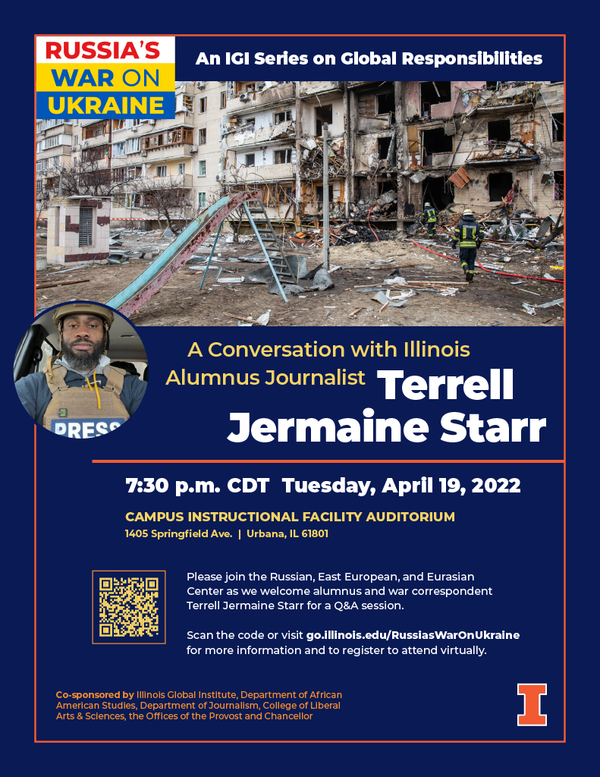 |
Date: Apr 19, 2022
Please join the Russian, East European, and Eurasian Center as we welcome alumnus journalist Terrell Jermaine Starr for a Q&A session. In-person: Auditorium, Campus Instructional Facility, 1405 Springfield Ave, Urbana This event is free and open to the public. Sponsored by Russia, East European, and Eurasian Center. Co-sponsored by Illinois Global Institute, Department of African American Studies, Department of Journalism, College of Liberal Arts & Sciences, The Offices of the Provost and Chancellor
|
|
Performing Resistance to Authoritarianism with Andrei Kureichik Date: Apr 21, 2022
Andrei Kureichik, an internationally celebrated theatre artist and filmmaker from Belarus, had to flee the country following the brutal crackdown against the pro-democracy opposition in August 2020. His play, Insulted. Belarus(sia), a documentary-style play written in exile about the fraudulent Belarusian elections and violent suppression of dissent, was presented over 120 times worldwide (from Hong Kong, Nigeria, across the EU, the UK, and North America) in 21 languages from Sept. 2020-Aug. 2021. Many professional and academic performance groups around the world found the work resonant with their own concerns about diminishing democracy, police brutality and State violence, and disinformation campaigns. In this talk, Kureichik will discuss the ways he has leveraged his writing in exile to help mobilize citizens fighting for democratic freedoms and to bring international awareness to human rights violations. As Freedom House reported, 2020 marked a 15-year democratic decline which has only accelerated around the globe. Political rights and civil liberties in all regime types have been deteriorating, and “ethnic, religious, and other minority groups have borne the brunt of government abuses in both democracies and authoritarian states. Kureichik offers ways to use art as a means of combatting these abuses, building solidarity, and raising awareness of global democratic decline. |
|
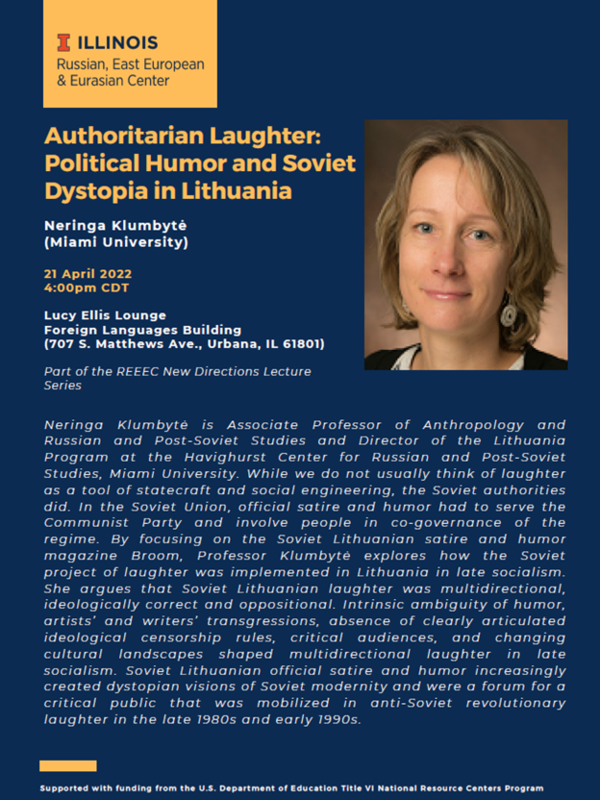 |
Date: Apr 21, 2022
While we do not usually think of laughter as a tool of statecraft and social engineering, the Soviet authorities did. In the Soviet Union, official satire and humor had to serve the Communist Party and involve people in co-governance of the regime. By focusing on the Soviet Lithuanian satire and humor magazine Broom, Professor Klumbytė explores how the Soviet project of laughter was implemented in Lithuania in late socialism. She argues that Soviet Lithuanian laughter was multidirectional, ideologically correct and oppositional. Intrinsic ambiguity of humor, artists’ and writers’ transgressions, absence of clearly articulated ideological censorship rules, critical audiences, and changing cultural landscapes shaped multidirectional laughter in late socialism. Soviet Lithuanian official satire and humor increasingly created dystopian visions of Soviet modernity and were a forum for a critical public that was mobilized in anti-Soviet revolutionary laughter in the late 1980s and early 1990s. Neringa Klumbytė is Associate Professor of Anthropology and Russian and Post-Soviet Studies and Director of the Lithuania Program at the Havighurst Center for Russian and Post-Soviet Studies, Miami University. Her research and teaching interests center on the USSR, Russia and Eastern Europe. Her articles have explored various topics in Soviet or post-Soviet Lithuania, including politics of memory and historical justice, ethnic conflict and nationalism, political participation in authoritarian and democratic regimes, populist electoral politics and nostalgia for socialism, censorship, and political marketing. She is a co-author of Social and Historical Justice in Multiethnic Lithuania (2018, with Monika Frėjutė-Rakauskienė, Andrius Marcinkevičius, and Kristina Šliavaitė, in Lithuanian) and co-editor of Soviet Society in the Era of Late Socialism, 1964–85 (with Gulnaz Sharafutdinova), 2012. Her book Authoritarian Laughter: Political Humor and Soviet Dystopia in Lithuania is forthcoming with Cornell University Press. |
|
|
Material Culture and the Armenian Diaspora Date: Apr 25, 2022
Sato Moughalian’s highly-lauded book A Feast of Ashes (2019) gathers family archives together with historical and art historical research to tell the story of Moughalian’s grandfather, David Ohannessian. Moughalian set out in this project to follow the “breadcrumbs” she could find through family stories about the ceramic art her grandfather founded in Jerusalem in 1919. In this talk, she will describe the moving contrasts and echoes she experienced between the legacies inherited from the children and grandchildren of Holocaust survivors and the “high-voltage fence” that had blocked off her own family’s legacy of surviving the Armenian genocide. |
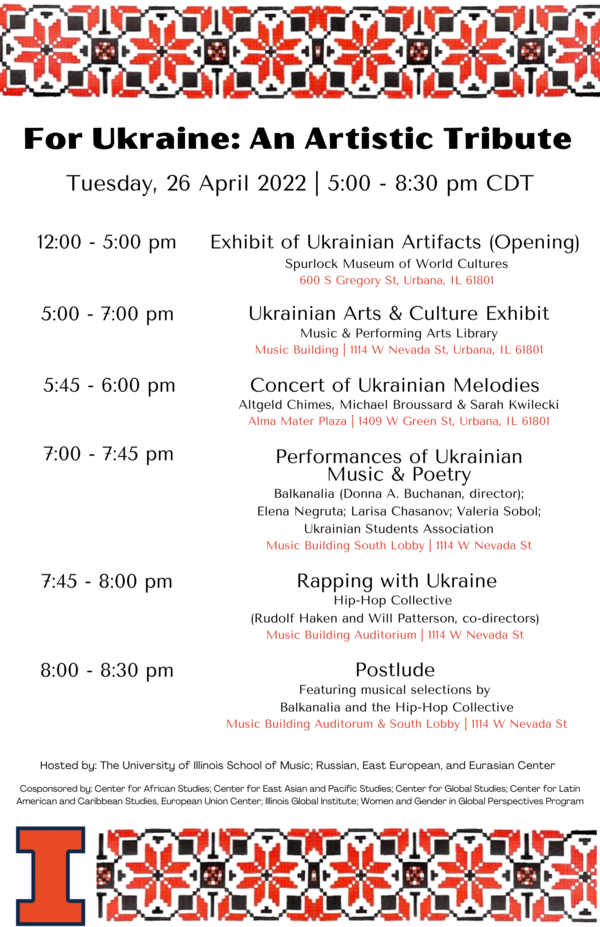 |
For Ukraine: An Artistic Tribute Date: Apr 26, 2022 |
|
|
Voices of the New Belarus, Play by Andrei Kureichik
George A. Miller Visiting Artist, Playwright Andrei Kureichik will be at KAM for a reading of his play Voices of the New Belarus by University of Illinois performers. Seating is limited for this initial engagement, by invitation only. A future opportunity to screen this performance at KAM will be made available to the general public. The staged reading of exiled playwright Andrei Kureichik’s Voices of the New Belarus, a documentary play about the experiences of political prisoners in Belarus following the fraudulent 2020 Belarusian presidential elections, is an interdisciplinary project featuring performers from across campus. Forced to flee the country following the elections, Kureichik, George A. Miller Visiting Artist, leveraged his creative energy to produce the documentary play, Insulted. Belarus., about the elections, subsequent protests, and violent crackdown by Aliaksandr Lukashenka’s regime in Belarus. The play has been translated into 21 languages and received 120 readings, performances, and films across the globe (including Hong Kong, Nigeria, throughout the EU, UK, and North America). It was featured on BBC Radio’s “The Cultural Frontline,” Russia’s Rain TV, and the HowlRound Theatre Commons. Voices is his second documentary piece about these events, which is gaining international recognition and building a global pro-democracy network of artists and advocates. |
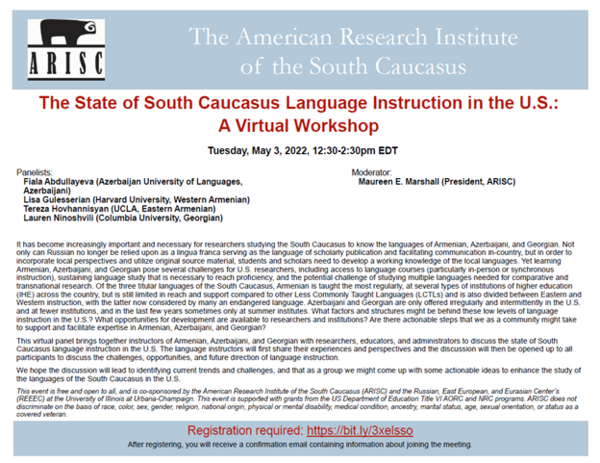 |
The State of South Caucasus Language Instruction in the U.S.: A Virtual Workshop Date: May 3, 2022
It has become increasingly important and necessary for researchers studying the South Caucasus to know the languages of Armenian, Azerbaijani, and Georgian. Not only can Russian no longer be relied upon as a lingua franca serving as the language of scholarly publication and facilitating communication in-country, but in order to incorporate local perspectives and utilize original source material, students and scholars need to develop a working knowledge of the local languages. Yet learning Armenian, Azerbaijani, and Georgian pose several challenges for U.S. researchers, including access to language courses (particularly in-person or synchronous instruction), sustaining language study that is necessary to reach proficiency, and the potential challenge of studying multiple languages needed for comparative and transnational research. Of the three titular languages of the South Caucasus, Armenian is taught the most regularly, at several types of institutions of higher education (IHE) across the country, but is still limited in reach and support compared to other Less Commonly Taught Languages (LCTLs) and is also divided between Eastern and Western instruction, with the latter now considered by many an endangered language. Azerbaijani and Georgian are only offered irregularly and intermittently in the U.S. and at fewer institutions, and in the last few years sometimes only at summer institutes. What factors and structures might be behind these low levels of language instruction in the U.S.? What opportunities for development are available to researchers and institutions? Are there actionable steps that we as a community might take to support and facilitate expertise in Armenian, Azerbaijani, and Georgian? This virtual panel brings together instructors of Armenian, Azerbaijani, and Georgian with researchers, educators, and administrators to discuss the state of South Caucasus language instruction in the U.S. The language instructors will first share their experiences and perspectives and the discussion will then be opened up to all participants to discuss the challenges, opportunities, and future direction of language instruction. |
|
Date: May 5, 2022
Please join us at 5:00 pm on May 5th for the REEEC Spring Reception in the Lucy Ellis Lounge of the Foreign Languages Building. We will celebrate the end of the spring semester, connect with members of our REEEC community, celebrate graduating students and their achievements, and look ahead to the rest of the year. Refreshments will be served. All are welcome! |
|
|
Russian, E. European & Eurasian Center: Films Date: May 11, 2022 This is a filmed version of the reading of Voices of the New Belarus at KAM featuring many faculty, students and alumni from across campus. |
|
|
|
Date: May 12, 2022 Andrei Kureichik will be giving a talk at The Literary. More details TBA. |
|
REEES Policy Research Roundtable: Russia-Ukraine War Date: Jun 8, 2022
Join the Slavic Reference Service on June 8 at 2:00 p.m. CST for a roundtable discussion on policy research and projects related to the Russia-Ukraine War. Panelists for the discussion include David Satter of the Hudson Institute, Dr. Paul Stronski of the Carnegie Endowment for International Peace, and Dina Spechler of Indiana University, Bloomington. |
Fall 2021
Fall 2021 Events
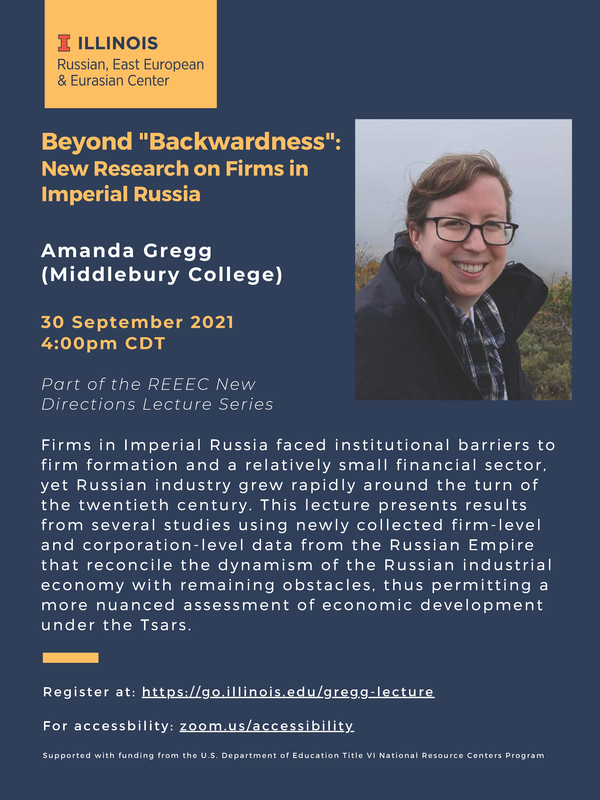 |
Date: Sep 30, 2021 Firms in Imperial Russia faced institutional barriers to firm formation and a relatively small financial sector, yet Russian industry grew rapidly around the turn of the twentieth century. This talk presents results from several studies using newly collected firm-level and corporation-level data from the Russian Empire that reconcile the dynamism of the Russian industrial economy with remaining obstacles, thus permitting a more nuanced assessment of economic development under the Tsars. Amanda Gregg is an Assistant Professor in the Middlebury College Department of Economics, which she joined in the fall of 2015 after completing her Ph.D. in Economics at Yale University. Her fields of study are economic history and economic development, and her research concerns industrial development, productivity, and commercial law in Late Imperial Russia. Recent publications include “Factory Productivity and the Concession System of Incorporation in Late Imperial Russia" in the American Economic Review and “Capital Structure and Corporate Performance in Late Imperial Russia” with Steven Nafziger in the European Review of Economic History. |
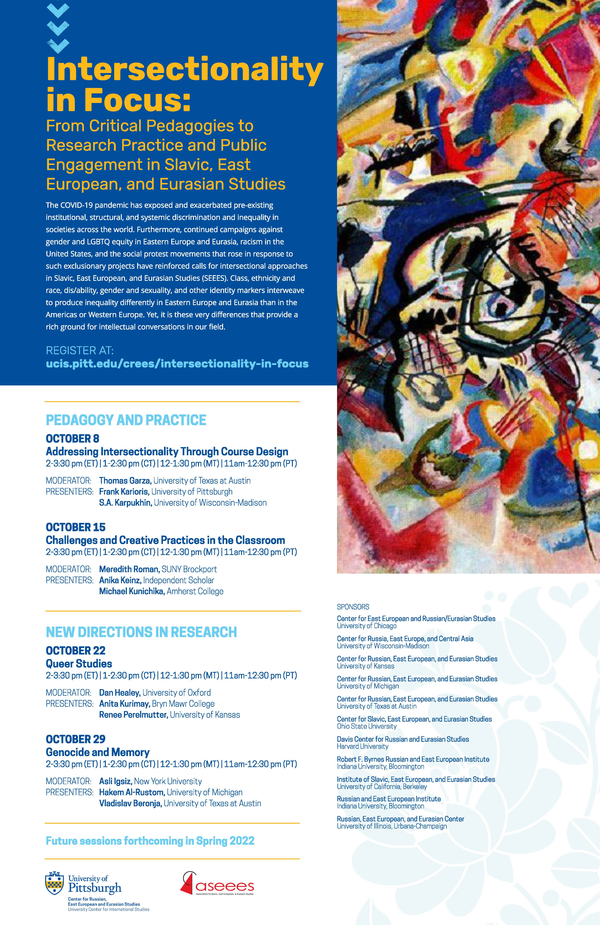 |
Date: Oct 8, 2021 The COVID-19 pandemic has exposed and exacerbated pre-existing institutional, structural, and systemic discrimination and inequality in societies across the world. Furthermore, continued campaigns against gender and LGBTQ equity in Eastern Europe and Eurasia, racism in the United States, and the social protest movements that rose in response to such exclusionary projects have reinforced calls for intersectional approaches in Slavic, East European, and Eurasian Studies (SEEES). Class, ethnicity and race, dis/ability, gender and sexuality, and other identity markers interweave to produce inequality differently in Eastern Europe and Eurasia than in the Americas or Western Europe. Yet, it is these very differences that provide a rich ground for intellectual conversations in our field. |
|
|
REEEC New Directions Lecture: Sunnie Rucker-Chang, "The Chinese in Serbia as 'Perpetual Foreigners'"
Date: Oct 14, 2021 The novel phenomenon of the Chinese in Serbia, a community that Professor Rucker-Chang once termed “transitory” and a “vastly different Other” (Rucker-Chang, 2012), has endured in both urban and rural settings in Serbia for over 20 years (Korać, 2013). With China’s “rise” (Bergsten et al. 2008), the transnational associations with “China” and “Chinese” continue to change and reflect an outward manifestation of the reach of Chinese power. Nevertheless, in Serbia, the Chinese remain outsiders and primarily defined by the categories of migrant, merchant, and student—therefore transitory. To explore the position of the Chinese in Serbia, Professor Rucker-Chang engages with the Asian American Studies concept of “perpetual foreigner.” Situating the term in Serbia reveals important insights into regional racial formations as they relate to the position of the Chinese community. In turn, this concept also provides insights into the situatedness of other groups such as those who are called “Black” as opposed to those who remain unmarked, ostensibly the “Serbs.” Sunnie Rucker-Chang is Associate Professor of Slavic and East European Studies at the University of Cincinnati where she is also on the leadership team of the Institute for Research in Sensing and Program Director of UC STARTALK Workforce Media Development and Year-Long Russian Immersion Programs. |
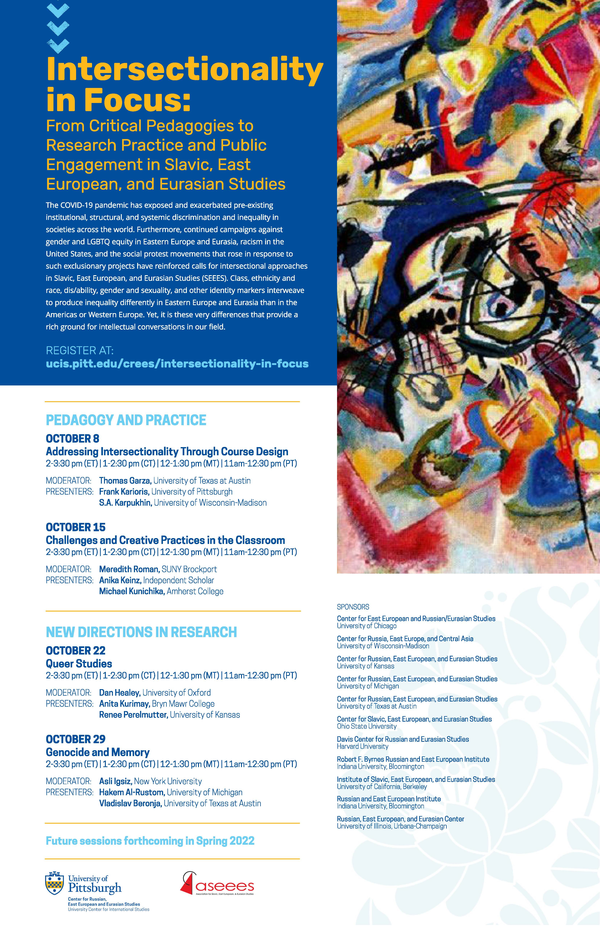 |
Date: Oct 15, 2021 The COVID-19 pandemic has exposed and exacerbated pre-existing institutional, structural, and systemic discrimination and inequality in societies across the world. Furthermore, continued campaigns against gender and LGBTQ equity in Eastern Europe and Eurasia, racism in the United States, and the social protest movements that rose in response to such exclusionary projects have reinforced calls for intersectional approaches in Slavic, East European, and Eurasian Studies (SEEES). Class, ethnicity and race, dis/ability, gender and sexuality, and other identity markers interweave to produce inequality differently in Eastern Europe and Eurasia than in the Americas or Western Europe. Yet, it is these very differences that provide a rich ground for intellectual conversations in our field. |
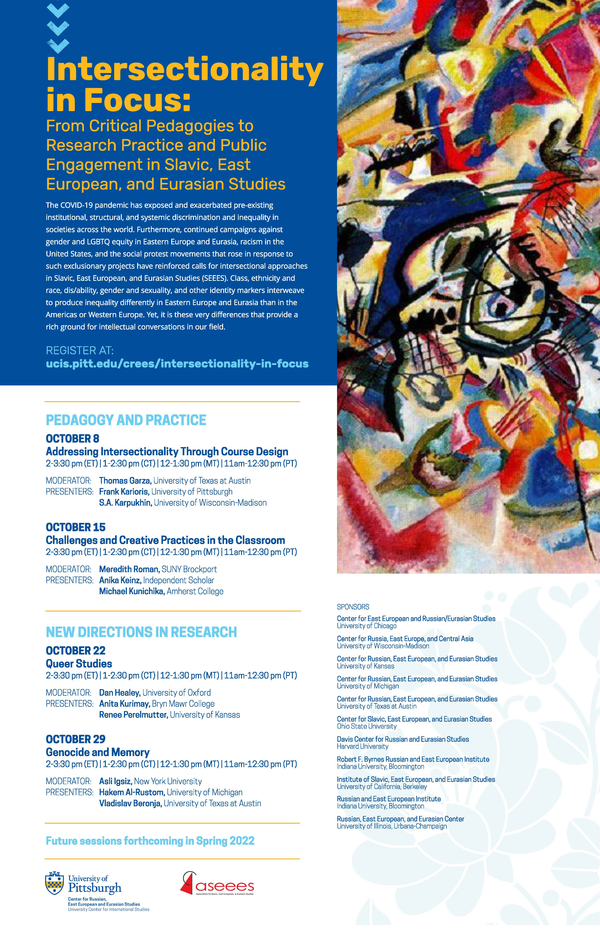 |
ASEEES - Pitt Intersectionality in Focus Series: "Queer Studies"
|
|
|
Date: Oct 29, 2021
The COVID-19 pandemic has exposed and exacerbated pre-existing institutional, structural, and systemic discrimination and inequality in societies across the world. Furthermore, continued campaigns against gender and LGBTQ equity in Eastern Europe and Eurasia, racism in the United States, and the social protest movements that rose in response to such exclusionary projects have reinforced calls for intersectional approaches in Slavic, East European, and Eurasian Studies (SEEES). Class, ethnicity and race, dis/ability, gender and sexuality, and other identity markers interweave to produce inequality differently in Eastern Europe and Eurasia than in the Americas or Western Europe. Yet, it is these very differences that provide a rich ground for intellectual conversations in our field. |
|
|
Date: Nov 2, 2021 The problem of short-term fluctuations in fertility has yet to receive an unambiguous and adequate explanation. Some of the short-term fluctuations in fertility could be related to various societal instabilities. Dr. Frantsuz attempts to investigate the impact of sociopolitical instability on fertility by developing a model linking macro-level instability with its perceptions as uncertainty at micro-level that, in turn, impact decision-making on fertility outcomes. This model is based on a modified version of the rational choice-based uncertainty reduction theory. According to the uncertainty reduction theory, higher fertility rates may counterintuitively reflect people’s effort to reduce uncertainty at periods of higher instability. Dr. Frantsuz tests and partially confirms this hypothesis by the application of an APC analysis to fertility data from Soviet and post-Soviet Russia from 1959 through 1998, a period marked by various kinds of instability. The model helps to explain some of the sudden short-term fluctuations in fertility during the period of research that other social and demographic theories failed to interpret. These findings have led to certain suggestions in refining the uncertainty reduction theory. Furthermore, the model relates various types, intensities, and magnitudes of instabilities to fertility outcomes. Yuri Frantsuz is a Fulbright Visiting Scholar at the University of New Mexico and a Research Fellow at the Institute of Sociology of the Russian Academy of Sciences. He is also a faculty member at the Smolny College of Liberal Arts and Science and the St. Petersburg University of Humanities and Social Sciences. He received his PhD in Sociology from the University of Minnesota. His areas of research interest include social and political demography, sociology of health, and social inequality and health. |
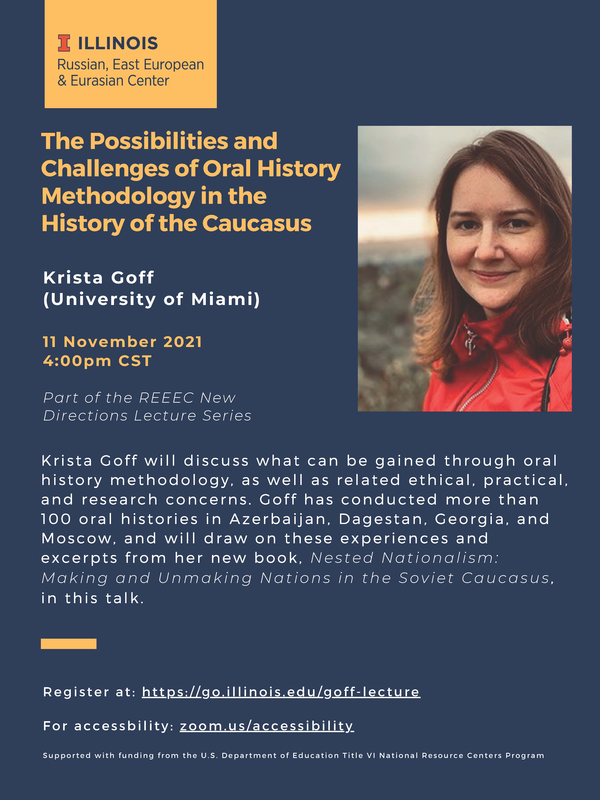 |
Date: Nov 11, 2021
Krista Goff will discuss what can be gained through oral history methodology, as well as related ethical, practical, and research concerns. Goff has conducted more than 100 oral histories in Azerbaijan, Dagestan, Georgia, and Moscow, and will draw on these experiences and excerpts from her new book, Nested Nationalism: Making and Unmaking Nations in the Soviet Caucasus, in this talk. Krista Goff is an Associate Professor of History at the University of Miami and co-editor of the journal Kritika: Explorations in Russian and Eurasian History. She specializes in the study of nationalism, empire, ethnic conflict, oral history, and the North and South Caucasus. She is the author of Nested Nationalism: Making and Unmaking Nations in the Soviet Caucasus and co-editor of Empire and Belonging in the Eurasian Borderlands. |
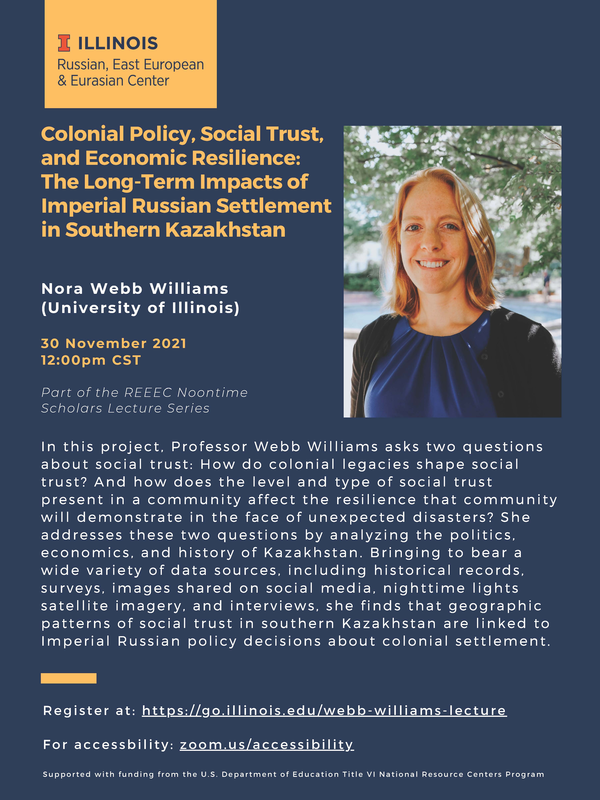 |
Date: Nov 30, 2021
Social trust is a driver of many important political and economic processes and outcomes, including democracy and economic development. In this project, Professor Webb Williams asks two questions about social trust: How do colonial legacies shape social trust? And how does the level and type of social trust present in a community affect the resilience that community will demonstrate in the face of unexpected disasters? She addresses these two questions by analyzing the politics, economics, and history of Kazakhstan. Bringing to bear a wide variety of data sources, including historical records, surveys, images shared on social media, nighttime lights satellite imagery, and interviews, she finds that geographic patterns of social trust in southern Kazakhstan are linked to Imperial Russian policy decisions about colonial settlement. In Almaty oblast, where 19th and early 20th century colonial settlement was relatively intense compared to neighboring Jambyl oblast and was coupled with higher rates of Kazakh land displacement, she finds lower rates of social trust in formal state institutions in the early 21st century. Those social trust patterns also map on to variation in rural village resilience after the collapse of the Soviet Union. On average, communities in Almaty oblast, with lower vertical trust, were better able to rebound after the dissolution of the Soviet Union in 1991. |
|
Date: Nov 30, 2021
Information session for students interested in applying for 2022-2023 FLAS will be held in two sections. Virtual Session I will be Monday, November 15, 2021, from 4:00 p.m. to 5:00 p.m. CT. Virtual Session II will be Tuesday, November 30, 2021, from 4:00 p.m. to 5:00 p.m. CT. Undergraduate and graduate students are welcome at either session. Both sessions will be recorded if you are unable to attend at the appropriate time. To register for Virtual Session 1, please visit: https://go.illinois.edu/FLAS2022-23InfoSession1 To register for Virtual Session 2, please visit: https://go.illinois.edu/FLAS2022-23InfoSession2 Topics of discussion include eligibility and requirements, walking through the application, and answering questions about the application process and the fellowship. FLAS Coordinators from individual Centers will be in attendance and available to the students for questions and discussion in break-out sessions after the main presentation. |
|
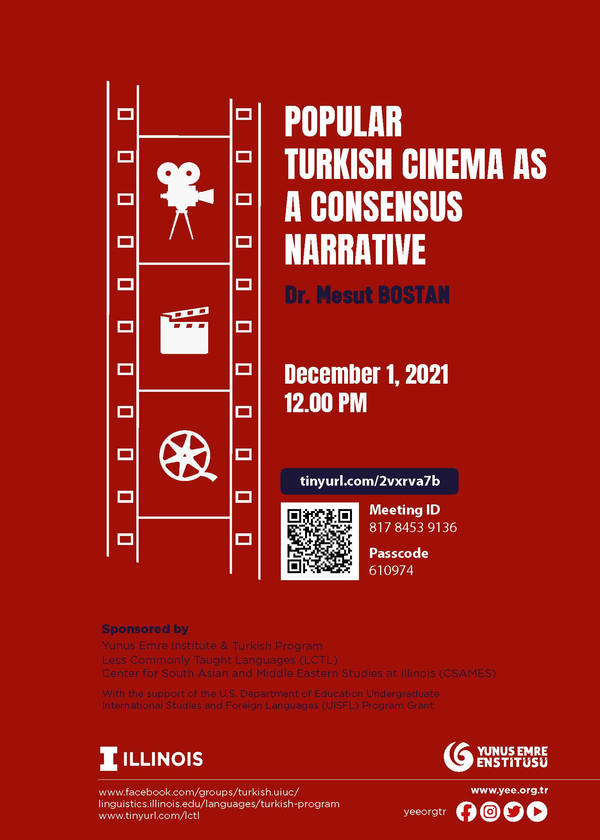 |
Turkish Program Event: Popular Turkish Cinema as a Consensus Narrative Date: Dec 1, 2021
Join the Turkish Program for a lecture by Dr. Mesut Bostan on "Popular Turkish Cinema as a Consensus Narrative". Event link: https://tinyurl.com/2vxrva7b |
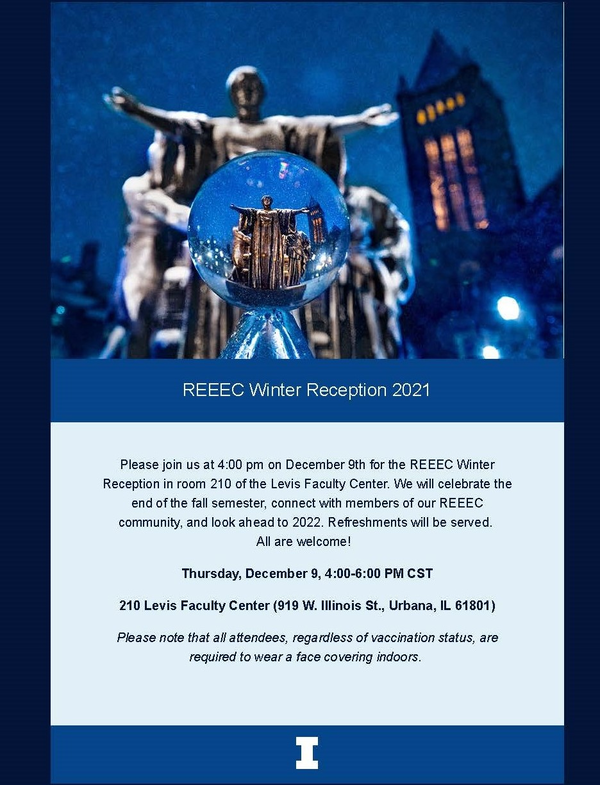 |
Date: Dec 9, 2021
Please join us at 4:00 pm on December 9th for the REEEC Winter Reception in room 210 of the Levis Faculty Center. We will celebrate the end of the fall semester, connect with members of our REEEC community, and look ahead to 2022. Refreshments will be served. All are welcome! |
Summer 2021
Summer 2021 Events
Freedom of the Press at the Borders of Europe: Turkey and the Mediterranean (2021 Turkish Studies Symposium)Date: Jun 28, 2021 The European Union Center's 14th annual Turkish Studies Symposium, "Freedom of the Press at the Borders of Europe: Turkey and the Mediterranean," brings together three journalists who have reported extensively on migrants and refugees in Turkey and beyond to discuss the state of the freedom of the press in Turkey and the Mediterranean today. |
|
VSRL Dissertation Research DiscussionDate: Jul 7, 2021 Please join the Slavic Reference Service on Wednesday, July 7 at 2pm CDT for our Dissertation Research Discussion. This event is a part of our peering mentoring program for students in REEES, and will feature an informal presentation by current REEES PhD candidates on their research. |
|
VSRL Meet the Editors and PublishersDate: Jul 9, 2021 Are you interested in publishing your manuscript? Meet with editors and publishers to discuss the publishing process. They will be offering tips and suggestions to prepare your manuscript for publication. |
|
A Woman's Work is Never Done: Female Life and Labor across the Imperial, Soviet and Post-Soviet ErasDate: Jul 10, 2021 - Jul 11, 2021 The politics surrounding women's labor in the Russian and Soviet space have long fascinated scholars. Historically, women's activism for professional, political, and educational equality in the region has been strikingly checkered and, in some ways, more extreme in terms of setbacks and successes, than in the west. |
|
VSRL Fisher Fellow Brown Bag Lecture: Andrey Shlyakhter, "Backs to the USSR: Explaining the Growth of the Soviet Border Guard, 1917-1939"Date: Jul 13, 2021 By the eve of the Second World War, the Soviet Union boasted the world's most stringent system of border control, successfully established along the world's longest border. Indeed, the consensus is that "the Soviet Union created one of the most effective border systems in terms of holding its people in that any country had ever constructed." |
|
Media Culture in Balkan and Eurasian Muslim CommunitiesDate: Jul 15, 2021 - Jul 16, 2021 This workshop will explore recent changes in media, media literacy, communications, and publishing in contemporary Muslim communities across the East European and Eurasian region, and how these changes affect sociopolitical trends, personal beliefs and identities. |
|
UIUC IGI Summer 2021 Global Educators Workshop: "Education in Uncertain Times: How to Prepare for the New Normal Around the World"Date: Jul 20, 2021 - Jul 22, 2021 UIUC IGI Summer 2021 Global Educator Workshop - 3 days of round-table discussions around the context of migration, education, and health with the theme of "Education in Uncertain Times: How to Prepare for the New Normal Around the World" |
|
VSRL Fisher Fellow Brown Bag Lecture: Kristina Poznan, "The U.S. Census, the Paris Settlement, and the Forging of Eastern European Ethnic Categories and Immigration Quotas: An Exercise in 'Guesswork'"Date: Jul 21, 2021 After the First World War, two factors drastically changed how Eastern Europeans might migrate to America: first, new geopolitical borders in the region, outlined in the Paris Settlement treaties; and second, restrictive immigration legislation in the United States. |
|
Spurlock Museum Family Program: "Wooden Treasures: Instruments and Toys of the Caucasus Region"Date: Jul 25, 2021 Among the items in the touchables area will be examples of hand-carved toys with parts that move. One of the most popular figures on these toys are bears, a favorite in Russian fairy tales. |
Spring 2021
Spring 2021 Events
Ver Vet Blaybn? (Who Will Remain?) Film ScreeningDate: Jan 27, 2021 The Initiative in Holocaust, Genocide, Memory Studies is honored to host three incredible speakers and one incredible film on the occasion of International Holocaust Remembrance Day. |
|
ASEEES - Pitt Race in Focus Series (Spring 2021): "New Directions in Research: Russian Literature in the 19th and 20th Centuries" SeminarDate: Feb 5, 2021 This series is designed to elevate conversations about teaching on race and continued disparities in our field while also bringing research by scholars from underrepresented minorities and/or on communities of color to the center stage. |
|
Emily Roche (Brown University), “The Uncultivated Garden: Architecture, Architects, and the State in Interwar Poland" LectureDate: Feb 9, 2021 In this talk, Emily Roche examines the relationship between architecture, architects, and the state in interwar Poland. She focuses specifically on the relationship between the modernist idea and the concept of the nation state, modernism's contribution to national modernization, biographical studies of Polish architects, and the role of anti-Semitism in shaping interwar architecture. |
|
“Authoritarianism, Fascism, and Rule of Law in Europe" LectureDate: Feb 11, 2021 Professor Jessica Greenberg will facilitate the discussion based on selected readings. Faculty, graduate students, and undergraduate students are all welcome. |
|
"New Directions in Research: Race, Gender, and Indigeneity in the American Arctic and Siberia" SeminarDate: Feb 12, 2021 This series is designed to elevate conversations about teaching on race and continued disparities in our field while also bringing research by scholars from underrepresented minorities and/or on communities of color to the center stage. |
|
International Dissertation Research During the Pandemic: A ForumDate: Feb 18, 2021 What pressures have graduate students faced while trying to conduct their international research in the past year? How can universities respond, and what lessons can we save for the future? Join us as graduate students and faculty reflect on these important questions, based on their experiences in the past year. |
|
REEEC Critical Methods Series in Legal Studies Lecture: Kim Lane Scheppele, “Europe’s New Democracy Deficit: Creeping Autocracy in Hungary and Poland"Date: Feb 18, 2021 Kim Lane Scheppele is the Laurance S. Rockefeller Professor of Sociology and International Affairs in the Princeton School of Public and International Affairs and the University Center for Human Values at Princeton University. Scheppele's work focuses on the intersection of constitutional and international law, particularly in constitutional systems under stress. |
|
A Brave New World? Discussing the EU and the U.S. after the Rise of Nativist Populism, COVID, and Brexit with Kostas Kourtikakis, Carol Leff, and Brian GainesDate: Feb 19, 2021 This panel takes stock of relations between the EU and the U.S. at a pivotal moment in transatlantic relations, as well as in the work of those in the U of I scholarly community who study the role of ongoing dynamics of institutions under pressure and identities in contact, two research and teaching programs of the EU Center’s current Jean Monnet Center of Excellence grant. |
|
|
|
ASEEES - Pitt Race in Focus Series (Spring 2021): "Talking About Whiteness: Racial and Ethnic Minorities in Eastern Europe, Russia, and Central Asia"Date: Feb 19, 2021 This series is designed to elevate conversations about teaching on race and continued disparities in our field while also bringing research by scholars from underrepresented minorities and/or on communities of color to the center stage.
|
Fulbright-Hays Doctoral Dissertation Research Abroad Fellowships Information SessionDate: Feb 19, 2021 The Graduate College Office of External Fellowships will hold a Fulbright-Hays information session over Zoom on Friday, February 19 from 3:30 to 5:00. |
|
REEEC VORL Brown Bag Series: Lauren McCarthy (University of Massachusetts Amherst), “Citizen Oversight of the Legal System in Russia”Date: Feb 23, 2021 This project examines the various ways that Russian citizens are involved in oversight, including monitoring police, protests, and courts; educating ordinary citizens to provide legal representation for people or themselves in administrative and criminal cases; and encouraging exposure of misconduct with cell phone videos and social media. |
|
Doctoral Dissertation WorkshopDate: Feb 25, 2021 Topics include: Conducting a literature review, publishing, information management, writing in REEES, research support, peer mentoring, and research trips. |
|
ASEEES - Pitt Race in Focus Series (Spring 2021): "#BLM: Reception in Eastern Europe, Russia, and Central Asia"Date: Feb 26th, 2021 This series is designed to elevate conversations about teaching on race and continued disparities in our field while also bringing research by scholars from underrepresented minorities and/or on communities of color to the center stage. |
|
Spurlock Sunday Family Program: Eastern European International Women's Day CelebrationDate: Feb 28, 2021 There will be crafts and short lessons on the Russian language, along with highlights from the Museum’s collection and a Russian story told by Spurlock's resident storyteller and assistant director of education, Kim Sheahan Sanford. |
|
REEEC Noontime Scholars Lecture: Felix Cowan, "Narratives of Backwardness and Modernization in the Late Imperial Russian Penny Press" LectureDate: Mar 2, 2021 This talk explores how late imperial Russia's kopeck newspapers constructed images of Russian backwardness and Western modernity, and how they instrumentalized those images to argue that Russia's future lay in imitating the West. |
|
International Women's Day 2021: "13 Women Who Changed the World: Untold Stories"Date: Mar 8, 2021 The Women and Gender in Global Perspectives Program in collaboration with Humanities Research Institute hosts an annual event bringing together faculty, staff, students, and community members to recognize people who have made a difference in academia. |
|
Race, Human Rights, and Populism in Poland: A SymposiumDate: Mar 9, 2021 This symposium brings together a set of cross-disciplinary experts prepared to explore this contradiction in Poland as an erstwhile would-be vanguard of liberal democracy and now fulcrum for an illiberal turn. |
|
REEEC VORL Brown Bag Series: Yelena Severina (UCLA), “Theater for the Revolution: Tableaux Vivants in Early Soviet Russia" LectureDate: Mar 9, 2021 Dr. Severina's talk will briefly cover their history but will focus on revolutionary tableaux of Early Soviet Russia. |
|
UCL Book Launch Talk and Q&A: Maria Todorova, "The Lost World of Socialists at Europe's Margins: Imagining Utopia, 1870s-1920s" LectureDate: Mar 10, 2021 Maria Todorova will talk about her latest book, The Lost World of Socialists at Europe’s Margins: Imagining Utopia, 1870s–1920s (Bloomsbury Academic 2020). She will discuss the ‘golden age’ of the socialist idea, exploring the period of the Second International. |
|
REEEC VORL Brown Bag Series: Larisa Kurtovic (University of Ottawa), "A city on the water, without water: Politics of water infrastructures in postwar Sarajevo" LectureDate: Mar 11, 2021 To understand the dense affective response generated by infrastructural breakdown, in this presentation, Dr. Larisa Kurtović draws on archival and ethnographic research focused on water procuring practices that punctuated everyday life during the 1992-1995 Siege of Sarajevo, and the ways in which memories of this suffering generate new political effects. |
|
REEEC New Directions Lecture: Holly Case, "The Noblesse Oblige of Megalomania: The Hungarian History of an Idea" LectureDate: Mar 18, 2021 During the Second World War, a Hungarian madman wrote to Tsar Boris of Bulgaria to ask for his eleven-year-old daughter's hand in marriage. The man explained that he had found a way to put an end to the Second World War such that both sides and all nations could emerge as victors. |
|
REEEC VORL Brown Bag Series: Evgeny Grishin, “From the Age of Correction to the Age of Schism: Religious Dissent and the Language of Exclusion in Early Modern Russia” LectureDate: Mar 23. 2021 The project Dr. Grishin is pursuing during the VORL program is developing his dissertation into a book manuscript dedicated to the role of language in the identification and consequent persecution of religious dissent, specifically of Russian religious groups known collectively as the “Schism” (Raskol), or the Old Belief (staroverie). |
|
Conversation with Former MEP Georgi Pirinski (Bulgarian Socialist Party) MeetingDate: Mar 31, 2021 Please join the EU Center on Wednesday, March 31st, at 12 PM CDT for a moderated conversation with Georgi Pirinski, Bulgarian politician and Former Member of the European Parliament.
|
|
REEEC Critical Methods Series in Legal Studies: Workshop with Forensic ArchitectureDate: Apr 1, 2021 This workshop will be a chance to learn more about the innovative investigative methods of Forensic Architecture (FA), and an initial step in bringing various scholars of campus together to consider FA-style research clusters and collaborations on our campus. |
|
Turkish GastronomyDate: Apr 6, 2021 Join us for an enriching conversation of Turkish Gastronomy and its culture and tradition along with its journey from past to present. |
|
|
Date: Apr 6, 2021 Marcus King's areas of expertise include environmental security, climate change, and security, environmental scarcity and fragile states, and energy security. He is Director of the Elliott School's Master of Arts in international Affairs Program after previously serving as Director of Research and Associate Research Professor. |
|
AsiaLENS: Finding Yingying (Virtual Screening + Online Filmmaker Discussion)Date: Apr 6, 2021An award winning doxumentary debut by Chicago-based filmmaker Jiayan Shi, Finding Yingying presents the tragic story of Yingying Zhang, the 26-year-old Chinese student who disappeared from the University of Illinois campus in 2017. |
|
The Global and Its Worlds: "From Here" Film Screening and Q & ADate: Apr 13, 2021 Join us for a screening of the documentary film From Here, followed by a Q & A with director Christina Antonakos-Wallace and two of the film's subjects, Sonny and Tania. |
|
iSEE/ JACS Lecture: Book Talk With Catherine Coleman Flowers: "Waste: One Woman's Fight against America's Dirty Secret" Tuesday, April 20, 12 PMDate: Apr 14, 2021 Come prepared to participate in a lively discussion! |
|
Fulbright Personal Statement Writing WorkshopDate: Apr 15, 2021 Are you looking for an exciting way to spend a year abroad starting in the Fall of 2022 The National and International Scholarships Program will be hosting information sessions (starting April 6th) for undergraduate students and recent alumni to provide an overview of the Fullbright U.S. Student Program, including eligibility, grant types, and application advice. |
|
ARISC Spring 2021 Lecture Series: Ariel Otruba (Moravian College), "Borderization from the Frontlines: Uncertainty and Abandonment in the Space Between War and Peace"Date: Apr 16, 2021 The August 2008 Russo-Georgian war represents the first time the Ossetian and Abkhazian administrative boundaries were experienced as international borders. The unilateral demarcation of these territories by Russian forces, a process euphemistically called "borderization," led to restricted freedom of movement, compromised livelihoods, demographic declines, widespread trauma, barriers to important social practices, and a growing mistrust for borderland communities. |
|
ARISC Spring 2021 Lecture Series: Scott Demyan (Ohio State University), "Infrared Spectroscopy, a Tool for Rapid Land Degradation Assessment"Date: Apr 20, 2021 Soil health and preventing and reversing soil degradation are not only important for food security, but also to ensure that important soil ecosystem services such as carbon storage and water quality are maintained. Management of soil resources requires high quality soils data. |
|
REEEC VORL Brown Bag Series: Regine Spector (University of Massachusetts Amherst), " The Political Lives of Dying Seas"Date: Apr 20, 2021 As we witness the effects of anthropogenic climate change on our earth's glaciers and ice sheets, The Political Lives of Dying Seas shifts our attention from rising sea levels, which have garnered significant attention, to shrinking and polluted inland seas. |
|
iSEE/ JACS MillerComm Lecture: Peter Gleick, "The Past, Present, and Future of Our Water"Date: Apr 20, 2021 Dr. Peter Gleick will share his innovative research on water conservation and the steps that can be taken by governments, corporations, and private citizens to ensure that water remains a readily available resource in the future. |
|
Fulbright Information SessionDate: Apr 21, 2021 Are you looking for an exciting way to spend a year abroad starting in the Fall of 2022? The National and International Scholarships Program will be hosing information sessions (starting April 6th) for undergraduate students and recent alumni to provide an overview of the Fulbright U.S. Students Program, including eligibility, grant types, and application advice. |
|
CAS/MillerComm Lecture: Kevork Mourad, "Conceptualizing Migration, Memory and Place Through Art"Date: Apr 21, 2021 In conversation with University of Illinois graduate student Helen Makhdoumian, Syrian-born Armenian artist Kevork Mourad will discuss how he conceptualizes migration, memory and place0making through his paintings and visual performances. |
|
iSEE/ JACS MillerComm Lecture: Joan Rose, "From Polio to COVID: Environmental Virology at its Best"Date: Apr 23, 2021 Since the era of waterborne jaundice and polio, environmental virology has attempted to understand disease risk through the monitoring of viruses in wastewater, and fresh and marine waters. |
|
Turkish Program Movie Event: "The Pocket Hercules Naim (Cep Herkülü Naim)"Date: Apr 23, 2021 Turkish Program Movie Event: "The Pocket Hercules Naim (Cep Herkülü Naim)" |
|
Fulbright Information SessionDate: Apr 23, 2021 Are you looking for an exciting way to spend a year abroad starting in the Fall of 2022? The National and International Scholarships Program will be hosing information sessions (starting April 6th) for undergraduate students and recent alumni to provide an overview of the Fulbright U.S. Students Program, including eligibility, grant types, and application advice. |
|
Slavic Story TimeDate: Apr 25, 2021 Join us to hear the story Rooster Brother by Noony Hogrogrian. Afterwards, we'll sing an Armenian lullaby and decorate our own craft roosters! |
|
REEEC Noontime Scholars Lecture: Saniya Ghanoui and Pavel Vasilyev, "The Global Menstrual Movement during the Cold War and Beyond"Date: Apr 27, 2021 This presentation highlights the different attitudes surrounding menstruation and processes of advertising menstrual products during the Cold War. |
|
ARISC Spring 2021 Lecture Series: Aimee Dobbs (ARISC), "Colonial Governance, Educational Reform, and the Architecture of Identity Among Nineteenth Century Azerbaijani Muslims"Date: Apr 28, 2021 The American Research Institute of the South Caucasus is proud to present its 2021 Spring Lecture Series. |
|
Fulbright Research WorkshopDate: Apr 30, 2021 Are you looking for an exciting way to spend a year abroad starting in the Fall of 2022? The National and International Scholarships Program will be hosing information sessions (starting April 6th) for undergraduate students and recent alumni to provide an overview of the Fulbright U.S. Students Program, including eligibility, grant types, and application advice. |
|
The Legacy of Traditional Turkish MusicDate: May 4, 2021 You are invited to join an enriching conversation on traditional Turkish music from past to present and embark on a spiritual journey through the sounds of "ney", an ancient musical instrument, which is also a significant part of Turkish-Islamic culture. |
|
REEEC Virtual Spring ReceptionDate: May 6, 2021 Please join us at 4:00 pm on May 6th for the REEEC Virtual Spring Reception on Zoom. We will be honoring our 2021 graduates as well as recognizing other student and faculty achievements. |
|
ARISC 2021 Alt-Academic Professional Development ForumDate: May 7, 2021 The American Research Institute of the South Caucasus (ARISC) invites you to attend the 2021 Alt-Academic Professional Development Forum, a 75-minute discussion and Q&A session on career diversity for graduate students specializing in study of the South Caucasus and related fields. |
Fall 2020
Fall 2020 Events
On a Personal Note: A Conversation with Violinists Yulia Ziskel & Joe DeninzonDate: Aug 31, 2020 A conversation about their journey from their Russian-Jewish roots to current positions and relationship with Jewishness/ Judaism and how that has evolved over the years. |
|
Race and Racism in Russian, East European, and Eurasian Studies: A RoundtableDate: Sep 3, 2020 As a Kickoff Event for this year's New Directions Series, the Russian, East European, and Eurasian Center invites you to join a roundtable discussion on the role of race and racism in our region and scholarly field. |
|
Area Studies Showcase Lecture Series: Rawi Abdelal (Harvard University), "Imagining the Next Global Economy"Date: Sep 15, 2020 There is no going back to the beginning. The emerging global economy will not resemble the system that came before. That pre-pandemic system was already fragile. Now we have an opportunity to imagine a new global economy. |
|
REEEC New Directions Lecture: Emily Wang and Korey Garibaldi, "Interrogating the Declining Significance of Pushkin's Blackness: Henry James, Ivan Turgenev, and Literary Nationalism"Date: Sep 17, 2020 Though most scholarship on Pushkin's reception in the United States focuses on twentieth-century African American literature, the origins of this encounter remain poorly understood. In fact, nineteenth-century commentators on both sides of the Atlantic were obsessed with Pushkin's racial heritage-as both a Russian, and as a canonical European writer of African descent. |
|
Area Studies Showcase Lecture Series: Harsha Ram (UC Berkeley), "The Caucasus: From Geopolitics to Geopoetics"Date: Sep 22, 2020 The Caucasus is primarily seen as a contested territory, an interregional space caught between rival empires as well as local polities. At the same time its topographic and ethnolinguistic diversity has captured the imagination of travelers over the centuries. |
|
The Crisis in Belarus: A Discussion with Natalya ChernyshovaDate: Sep 25, 2020 Dr. Natalya Chernyshova is Senior Lecturer in Modern History at the University of Winchester. She specializes in late Soviet history, with a focus on Belarus, and is the author of Soviet Consumer Culture in the Brezhnev Era (Routledge, 2013). |
|
Area Studies Showcase Lecture Series: David Cooper (University of Illinois), "Anatomy of a Successful Forgery: The Czech Manuscripts"Date: Sep 29, 2020 For over five decades from the moment of their appearance in 1817 and 1818, the Queen's Court and Green Mountain Manuscripts were considered by the vast majority of the international scholarly community to be genuine monuments of medieval Czech literature. |
|
Insulted. Belarus(sia) Play ReadingDate: Oct 1, 2020 You are invited to an Illinois Theatre Zoom Reading for the UIUC community of the new play Insulted. Belarus(sia) by Andrei Kureichik about the current events taking place in Belarus. |
|
Weapons of Mass Destruction - Proliferation: Challenges, Opportunities & CareersDate: Oct 1, 2020 The international community faces no shortage of challenges when it comes to preventing the spread of nuclear weapons. The crisis in US-Russia relations, the slow pace of nuclear disarmarment, the future of North Korea's nuclear weapons program, and the emergence of new technologies with military applications - theses are just a few of the issues that nuclear policy professionals are working to address today. |
|
The Global and Its Worlds Lecture: Arjun Appadurai (New York University), "The Volatile Market for Globalization"Date: Oct 2, 2020 In this presentation, titled "The Volatile Market for Globalization," Professor Arjun Appadurai will address the recent debates about the rebirth of the nation-state in the era of pandamic disease, and about whether globalization is about to be rolled back or marginalized. |
|
ASEEES - Pitt Race in Focus Series: Webinar - Teaching about Race and Racism: Your Syllabus 2.0Date: Oct 2, 2020 This event is part of the series "Race in Focus: From Critical Pedagogies to Research Practice and Public Engagement in Slavic, East European, and Eurasian Studies." This series is designed to elevate conversations about teaching on race and continued disparities in our field while also bringing research by scholars and/or on communities of color to the center stage. |
|
Area Studies Showcase Lecture Series: Sarah Phillips (Indiana University), "American Literary and Cultural Diplomacy during during the Cold War: Kurt Vonnegut in the USSR"Date: Oct 7, 2020 This talk explores a fascinating yet little-known chapter in the history of literary and cultural diplomacy during the Cold War - the popularity of the American author Kurt Vonnegut in the Soviet Union during the 1970s. |
|
2020 Baltic Sea Region ForumDate: Oct 8, 2020 The Baltic Sea Region is home to nine countries that represent numerous cultures and societies. Through interdisciplinary scholarly discussions, the Slavic Reference Service seeks to highlight original research and facilitate thematic discussions on the countries of this world region. |
|
HRI Medical Humanities Event: "Global Spread: COVID in the World" (Roundtable on Zoom)Date: Oct 8, 2020 Speakers include Professors Maimouna Barro (African Studies), Rini Bhattachyra (Comparative and World Literature), Shao Dan (East Asian Languages and Cultures), Jerry Davila (Illinois Global Institute), Linda Herrera (Education Policy), Emanuel Rota (European Union Center), Valeria Sobol (Slavic Languages and Literatures), and Robert Tierney (East Asian Languages and Cultures). |
|
ASEEES - Pitt Race in Focus Series: Webinar - Engaging with Race and Racism in the ClassroomDate: Oct 9, 2020 This event is part of the series "Race in Focus: From Critical Pedagogies to Research Practice and Public Engagement in Slavic, East European, and Eurasian Studies." This series is designed to elevate conversations about teaching on race and continued disparities in our field while also bringing research by scholars and/or on communities of color to the center stage. |
|
Area Studies Showcase Lecture Series: Jessica Robbins (Wayne State University), "Aging Nationally in Contemporary Poland: Memory, Kinship, and Personhood"Date: Oct 14, 2020 Active aging programs that encourage older adults to practice health-promoting behaviors are proliferating worldwide. In Poland, the meanings and ideals of these programs have become caught up in the socialcultural and political-economic changes that have occured during the lifetimes of the oldest generations - most visibly, the transition from socialism to capitalism. |
|
REEC New Directions Lecture: Diana Kurkovsky West, "From 'Big Data' Socialism to Digital Utopianism: Lessons from the Soviet Past for the Post-Covid-19 Future"Date: Oct 15, 2020 Diana Kurkovsky West received her Ph.D. from the Princeton University School of Architecture, and has served as a Postdoctoral Fellow in Science and Human Culture at Northwestern University and Director of Science and Technology Studies Center at the European University at St. Petersburg, Russia. |
|
ASEEES - Pitt Race in Focus Series: Lightning Round - Emerging Scholars of Color AbroadDate: Oct 16, 2020 This event is part of the series "Race in Focus: From Critical Pedagogies to Research Practice and Public Engagement in Slavic, East European, and Eurasian Studies." |
|
The Conflict in Nagorno-Karabakh: A ConversationDate: Oct 16, 2020 Professors Anna Ohanyan and Erik Herron will address what is most important to know about the current conflict surrounding Nagorno-Karabakh, and also how we should understand it in relation to larger patterns of conflict across the post-Soviet space (and the world more generally) today. |
|
IGI International Music & Dance EventDate: Oct 19, 2020 This event is organized by the Illinois Global Institute's area studies centers as part of Illinois International Week 2020 (Oct. 19-23). |
|
Nina Jankowicz, "How to Lose the Information War: Lessons from Central and Eastern Europe"Date: Oct 20, 2020 The Kremlin, as well as other state actors and far-right groups, divide and deceive populations around the world using social media and other online warfare tactics. The Western world has finally begun to wake up to this threat, but Central and Eastern European states have been aware, and reacting, for years. |
|
Museums During COVID-19Date: Oct 21, 2020 Since the COVID-29 outbreak, museums from around the world have developed strategies to offset the impact of the global pandemic on funding, programs, and services as well as curation of collections. |
|
International Literature DiscussionDate: Oct 21, 2020 Fiction in the time of a pandemic? The Slavic Reference Service is holding its second International Literature discussion on Oct. 21st at 12:00 P.M. (CST) |
|
Area Studies Showcase Lecture Series: Chelsi West Ohueri (UT Austin), "Outsiders, Others, and Outcasts: Examining antiziganism and race-making in Albania"Date: Oct 21, 2020 In this lecture, Professor West Ohueri explores the contours of antiziganism, conceptualized as racism and prejudice against Romani people groups, in Albania and the Balkan region. Part one of the presentation considers the theoretical framings of antiziganism and asks how analyses of antiblackness can allow scholars to think through contemporary manifestations of antiziganism in the Balkan region. |
|
Illinois Global Institute Career DayDate: Oct 23, 2020 Current and recent graduate students are invited to a career diversity day focusing on using foreign language, area studies, and thematic studies in the job market. |
|
Are European Human Rights and Rule of Law in Crisis?: Roundtable and DiscussionDate: Oct 27, 2020 Join us for a roundtable and discussion about different challenges to human rights and rule of law in contemporary Europe. |
|
Area Studies Showcase Lecture Series: Marianne Kamp (Indiana University), "Jobs for Orphans, Taxes for Kulaks, and Love of Tractors: Collectivization Oral Histories from Uzbekistan"Date: Oct 28, 2020 This lecture series is a collaborative effort to showcase an area studies specialist from each center focusing on the Russian, East European, and Central Asian world region. |
|
Slavic Story TimeDate: Nov 1, 2020 At this story time, enjoy Patricia Polacco's Luba and the Wren. Luba, a young girl, rescues a wren who can grant wishes. Once her parents learn of this, they make Luba ask the wren for more and more. |
|
D.I.N.E: Diversity & Inclusion Networking ExchangeDate: Nov 4, 2020 Engage with employers who value diversity in the workplace. Practice networking with company representatives in a virtual setting. Hear what employers look for in new hires. Learn what questions you can ask to determine if an organization meets your needs. |
|
75 Years After Hiroshima: A New Nuclear Arms Race?Date: Nov 4, 2020 On Auguest 6 and 9, 1945, over 120,000 people were killed by the atomic bombs dropped over Hiroshima and Nagasaki. Decade by decade, the billions of people at risk from direct and indirect effects of nuclear war continue to grow. |
|
Area Studies Showcase Lecture Series: Maria Sonevytsky (UC Berkeley), "Musical Evolution and The Other: State-Sponsored Musical Evolutionism in the USSR and the Conundrum of Post-Soviet Crimean Tatar Indigenous Music"Date: Nov 5, 2020 In the Soviet Union, logics of teleological evalutionism undergirded the Communist party-state's interventions into many aspects of Soviet life, including the realm of "folk music." In this lecture, Professor Sonevytsky draws on the example of the Soviet institutionalization of a Crimean Tatar folk orchestra to demonstrate how Soviet musical evolutionism ordered and constrained vernacular musical practices in ways that have had long-term political consequences, especially with regard to the politics of post-Soviet indigeneity. |
|
Legacies of WWII: 75 Years AfterDate: Nov 5, 2020 The Department of History and Phi Alpha Theta are hosting a special panel commemorating 75 years since the end of the Second World War on Thursday. |
|
Graduate Student Workshop: "Writing Effective Fellowship Proposals"Date: Nov 6, 2020 These events are free and open to any University of Illinois at Urbana-Champaign Graduate Student. |
|
Info Session on Joint MA/REEES and MS/LIS Program at IllinoisDate: Nov 10, 2020 This information session will be led by John Randolph (Director, Russian, East European, and Eurasian Center) and Moises Orozco Villicana (Director of Enrollment Management, iSchool). |
|
75 Years After Hiroshima: A New Nuclear Arms Race?Date: Nov 11, 2020 On August 6 and 9, 1945, over 120,000 people were killed by the atomic bombs dropped over Hiroshima and Nagasaki. Decade by decade, the billions of people at risk from direct and indirect effects of nuclear war continue to grow. |
|
The New Speed of Politics: Technology and Sustainability in the EUDate: Nov 12, 2020 Countries of the European Union have collectively offered a leading global voice on the use of technology for local and planetary sustainability. This panel brings together two Former Members of the European Parliament with comparative experience in urban politics and corporate governance, from experience in the national politics of older and newer member states. |
|
Area Studies Showcase Lecture Series: Trevor Erlacher (University of Pittsburgh), "Ukrainian Nationalism in the Age of Extremes"Date: Nov 12, 2020 This lecture series is a collaborative effort to showcase an area studies specialist from each center focusing on the Russian, East European, and Central Asian world region. |
|
Language Teaching Workshop: "Motivate Your Students with Real-Life Tasks and Scenarios"Date: Nov 12, 2020 This event is co-sponsored by the Russian, East European, and Eurasian Center; European Union Center; Center for East Asian & Pacific Studies; and Center for Global Studies through support from the US Department of Education's Title VI NRC Program. |
|
FLAS Information Session (Virtual Session I for Undergraduates)Date: Nov 17, 2020 Topics of discussion include eligibility and requirements, walking through the application, and answering questions about the application process and the fellowship. FLAS Coordinators from individual Centers will be in attendance and available to the students for questions and discussion in break-out sessions after the main presentation. |
|
75 Years After Hiroshima: A New Nuclear Arms Race?Date: Nov 18, 2020 On August 6 and 9, 1945, over 120,000 people were killed by the atomic bombs dropped over Hiroshima and Nagasaki. Decade by decade, the billions of people at risk from direct and indirect effects of nuclear war continue to grow. |
|
Area Studies Showcase Lecture Series: Francine Hirsch (University of Wisconsin), "Soviet Judgment at Nuremberg: Revisiting the International Military Tribunal on its 75th Anniversary"Date: Nov 19, 2020 This lecture series is a collaborative effort to showcase an area studies specialist from each center focusing on the Russian, East European, and Central Asian world region. |
|
FLAS Information Session (Virtual Session II for Graduate Students)Date: Dec 2, 2020 Topics of discussion include eligibility and requirements, walking through the application, and answering questions about the application process and the fellowship. FLAS Coordinators from individual Centers will be in attendance and available to the students for questions and discussion in break-out sessions after the main presentation. |
|
Area Studies Showcase Lecture Series: Faith Hillis (University of Chicago), "Utopia's Discontents: Russian Emigres and the Quest for Freedom"Date: Dec 3, 2020 In the last fifry years of the tsarist regime, large and boisterous settlements of Russian exiles emerged across the European continet. Called "Russian colonies" by their residents, these communities hosted the leaders of virtually every revolutionary party and produced most of the illegal literature that circulated in late imperial Russia. |
|
REEEC Virtual Winter ReceptionDate: Dec 9, 2020 Please join us on December 9th at 4:30 PM CST for the REEEC Virtual Winter REception. We will be celebrating the end of the fall semester and looking ahead to 2021. |
|
Area Studies Showcase Lecture Series: Theodora Dragostinova (Ohio State University), "The Cold War from the Margins: Socialist Bulgaria on the Global Cultural Scene"Date: Dec 10, 2020 Presenting Bulgaria's cultural engagements with multiple actors in the Third World, this talk highlights the global reach of state socialism, demonstrates the existence of vibrant partnerships along an East-South axis during the 1970s, and challenges notions of late socialism as the prelude to communist collapse in eastern Europe. |
